

U.S. Issues Warning For All Travelers Headed To Cancun & Mexican Caribbean This Spring
By: Author James Henry Currie
Posted on Published: February 27, 2024
Share The Article
Last Updated 1 month ago
The U.S. Embassy & Consulates In Mexico department has issued a warning for all U.S. travelers visiting Cancun and the Mexican Caribbean this spring.
This is done in the spirit of protecting every American while on vacation and with the express purpose of providing useful and up-to-date information that empowers U.S. citizens to enjoy the Mexican Caribbean safely during spring break and easter.
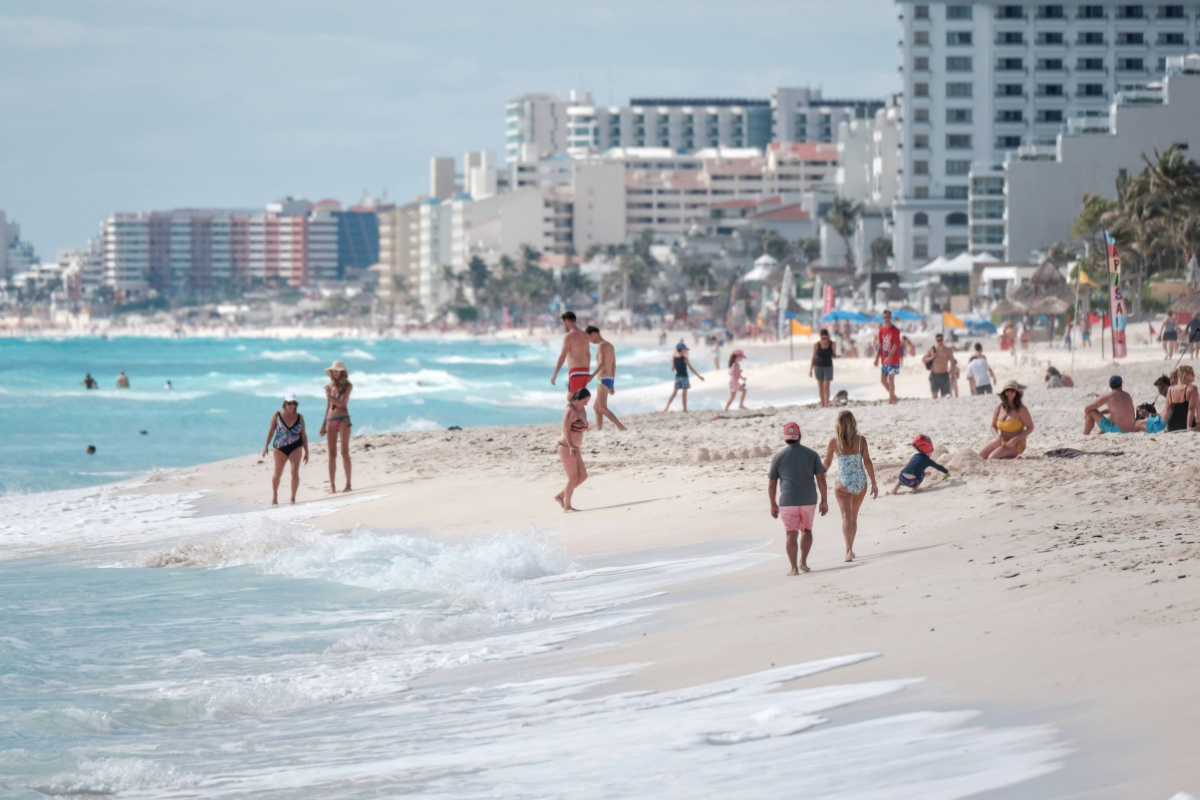
The Warnings
Many of the warnings put out by the U.S. Embassy & Consulates In Mexico center around situations that are useful for Americans to be aware of year-round.
So, even if you are not traveling during the spring period, the following information remains super helpful and important.
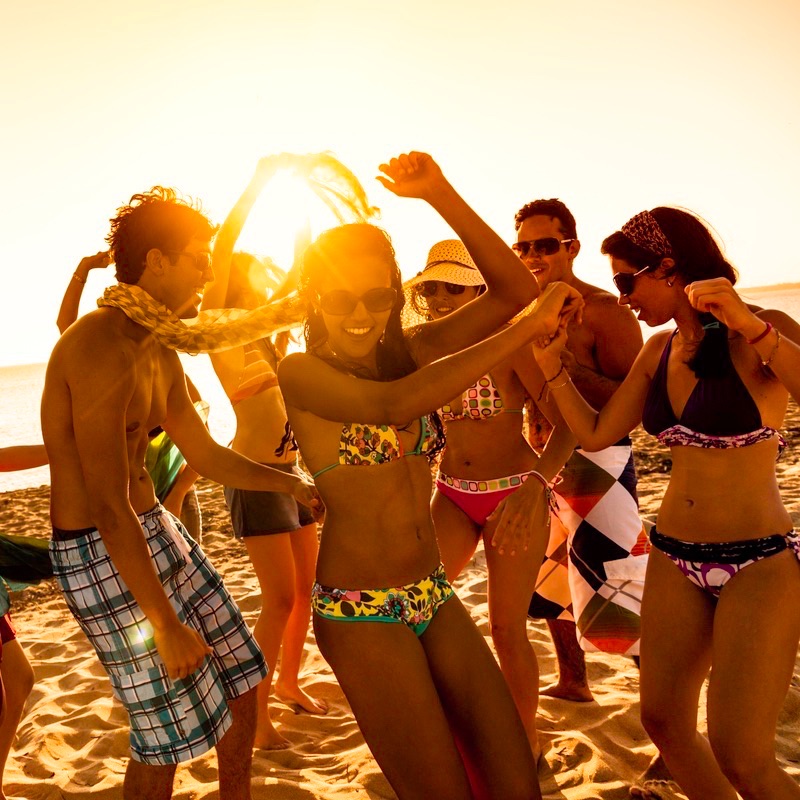
Presence of Crime
While Cancun has made big strides since the pandemic to improve security, there still remain issues that travelers should be aware of.
It will come as no surprise that the majority of instances of crime that travelers come into contact with revolve around narcotics.
For travelers who don’t partake in the consumption of narcotics, there is little to worry about, but getting involved in the purchase of these substances places travelers in a potentially dangerous situation.
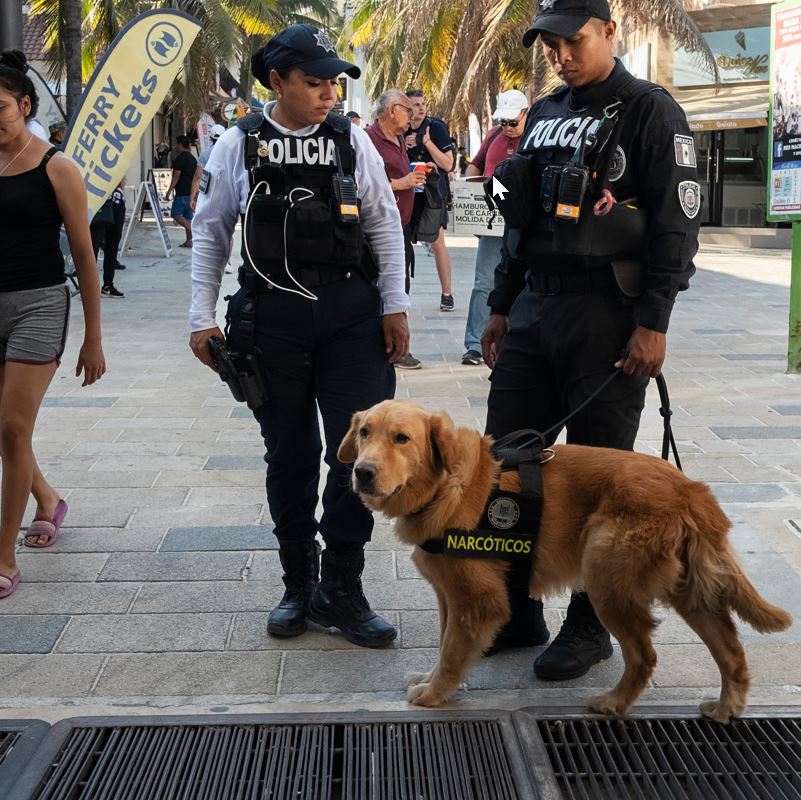
Personal Responsibility
Some of the other big safety issues highlighted by the U.S. Embassy & Consulates In Mexico aren’t related to crime and are easily avoided with a responsible approach to personal safety. They include:
- Water safety – Always obey lifeguards and the beach flag system to stay safe while swimming.
- Medical Emergencies – Medical facilities in Cancun are of a good standard, and travelers should take full advantage of this if the need arises. In an emergency, dial 911.
- Drink Responsibly – Travelers go to Cancun to let loose and enjoy life, but even in these moments it’s important to drink alcohol responsibly. It isn’t uncommon for highly intoxicated travelers to be arrested for being drunk and disorderly. Equally, public urination is also illegal.
- Firearms – These are strictly controlled in Mexico, and the importation of either firearms or ammunition can lead to serious repercussions, including incarceration and deportation.
- Pharmaceuticals – Over the past year there have been reports of counterfeit medication being sold within Mexico. Travelers should only seek out prescription medication under the advisement of a doctor, and only from reputable big-box pharmacies.
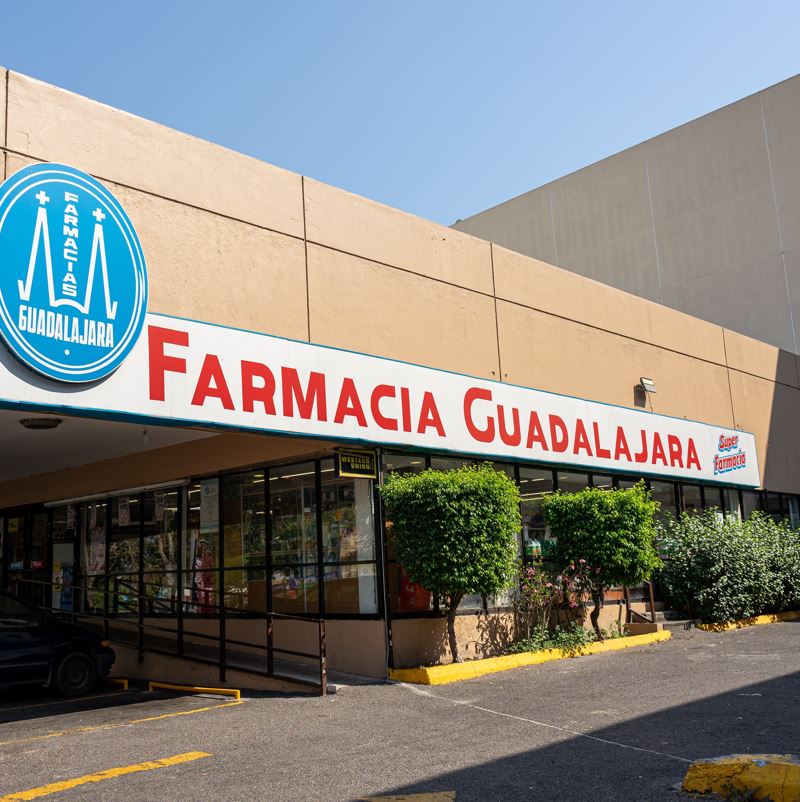
Tips To Stay Safe
The warning from the U.S. Embassy & Consulates In Mexico also came with stellar advice on staying safe while on vacation in the Mexican Caribbean.
One piece of advice was to enroll in the State Department Smart Traveler Enrollment Program , this helpful service keeps American travelers up to date on the current safety situation in all areas of Mexico, and also allows the U.S. Embassy to directly contact citizens in emergencies.
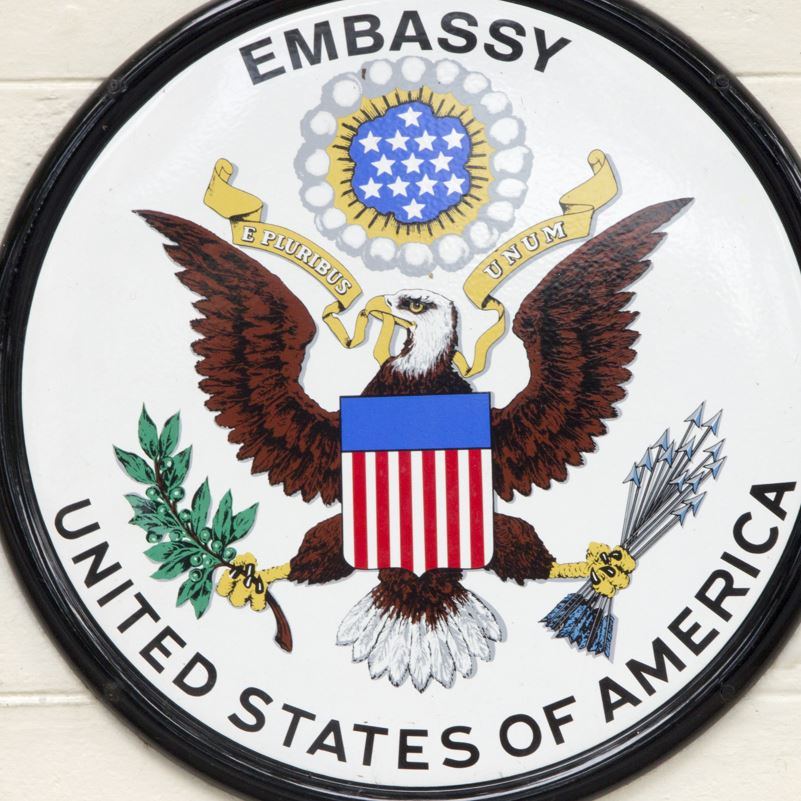
Additionally, it is advised travelers download the Guest Assist application on their smartphones. This is a fantastic initiative from the government of Quintana Roo that lays out all the services available to Americans while in the Mexican Caribbean.
This information is invaluable to travelers when in need of assistance and includes all emergency services, as well as information on consumer rights and how to exercise them.
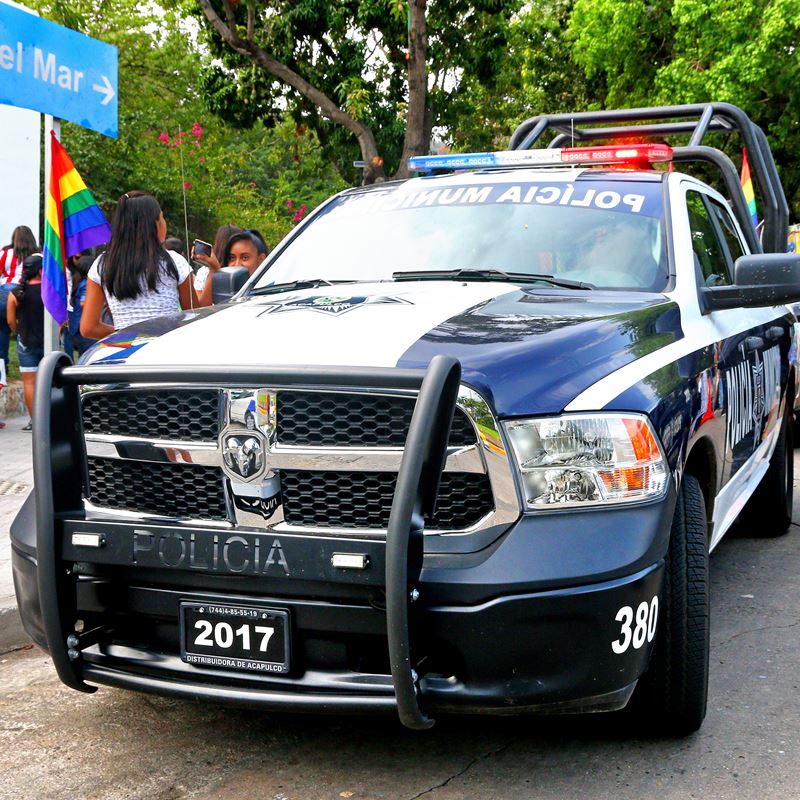
Furthermore, the importance of regularly monitoring both credit and debit card transactions is highlighted. In the past, there have been instances of cards being cloned or swapped and travelers incurring large charges.
To avoid this, it is best to pay for most goods and services in the Mexican Caribbean using cash. When withdrawing cash from an ATM, it is best to use in-bank ATMs that are guarded by security.
This is due to a trend in Mexico of less public and unguarded ATMs being the target of organized criminals either cloning credit cards or committing robbery to relieve travelers of freshly withdrawn cash.

Nothing New, But All Important
Thankfully, this latest warning to U.S. travelers doesn’t highlight any new issues to deal with. And instead, it is a timely reminder of the important basics of having a safe and enjoyable vacation in the Mexican Caribbean.
Plan Your Next Cancun Vacation:
Traveler Alert: Don’t Forget Travel Insurance For Your Next Trip!
Choose From Thousands of Cancun and Riviera Maya Hotels, Resorts and Hostels with Free Cancellation On Most Properties
↓ Join the community ↓
The Cancun Sun Community FB group has all the latest travel news, conversations and tourism Q&A’s for the Mexican Caribbean

Subscribe to our Latest Posts
Enter your email address to subscribe to The Cancun Sun’s latest breaking news affecting travelers, straight to your inbox.
Enter your email address
Tuesday 27th of February 2024
I would like to seek for more information about your new resorts in Mexico.
Is Mexico travel safe? What to know about visiting Cabo, Cancun, Playa del Carmen and more

With its warm climate, beautiful beaches and proximity to the U.S., Mexico is a popular tourist destination for many Americans. But recent incidents may have some people wondering if they should reconsider their travel plans.
Over the past few months, taxi drivers have been harassing Ubers in Cancun and there was the death of three Americans in Mexico City in October. Now an updated Travel Advisory warns of crime and kidnapping.
"We get this one a lot, especially by folks who haven't traveled as much, haven't left the country before, or have read stories about 'Mexico being dangerous' but maybe don't recognize it's a large, diverse country, much like ours," Jack Benoff, president of Vacationeeze , which specializes in destination weddings in Mexico, told USA TODAY. Many of Benoff's clients plan trips to Cancun and Riviera Maya, known for their turquoise beaches and myriad resorts.
Stay safe while traveling: Here are 17 CIA tips, advice to think like a spy on vacation
Staying safe: US tourists warned about popular Mexico spots plagued by drug cartel intimidation, violence
Learn more: Best travel insurance
The State Department updated the Travel Advisory for Mexico on Oct. 5, which is done regularly. Several tourist destinations, like Mexico City, Sayulita and Cancun, now have warnings related to cartel-related crime.
"The safety and security of U.S. citizens overseas is one of the department’s highest priorities, and we provide U.S. citizens with relevant information so they can make well-informed decisions before they travel," a State Department spokesperson said.
Read below to learn more about the Travel Advisory for Mexico's most popular tourist destinations and safety tips for visiting those areas.
Taxis vs. Uber: US issues Mexico security alert as Cancun taxi drivers block road, harass Uber cars
What is the updated Travel Advisory for Mexico?
Rather than providing one overall assessment for the entire country, each state is assessed individually, because some areas have an increased risk of crime and kidnapping.
► The agency issued a "do not travel to" warning for the Colima, Guerrero, Michoacan, Sinaloa, Tamaulipas and Zacatecas state because of violent crime.
► A "reconsider travel to" warning has been issued for Baja California and Jalisco, where Puerto Vallarta is.
► Mexico City, Nayarit, Baja California Sur, Quintana Roo and Oaxaca are issued an "exercised increased caution when traveling to" warning. Baja California Sur is home to Cabo San Lucas, San Jose del Cabo and La Paz. In Nayarit, many tourists visit the surf town Sayulita. Quintana Roo is home to Cancun, Tulum, Riviera Maya, Cozumel and Playa del Carmen. Surfers also like to visit Puerto Escondido in Oaxaca.
Travelers can "exercise normal precautions" when traveling to Yucatan, which includes the popular attraction Chichén Itzá. Yucatan state is right above Quintana Roo, where people should be more cautious because of crime and kidnapping, according to the State Department.
Protecting the sharks: Mexico indefinitely bans great white shark cage-diving at this tourist hotspot
'A terrible tragedy': 3 American tourists die of gas inhalation in Mexico City Airbnb
What are some safety travel tips for visiting Mexico?
The State Department has several resources to help keep travelers safe. The agency encourages U.S. travelers to read the entire Mexico Travel Advisory and its Traveler's Checklist , which details more information about traveling abroad.
There is also the Smart Traveler Enrollment Program , a free service for U.S. travelers to receive safety alerts about their destination from the U.S. Embassy in real time.
"Generally speaking, if you're in a resort town and at a reputable location, you're at a much lower risk," travel agent Benoff said.
Most resorts have security guards and gates, so staying on the property is pretty safe. "If you're leaving the resort property, ensure you have the correct address to where you're going and let the front desk know you're leaving and when you plan to return," he said.
"Use the same safety precautions you would when traveling anywhere."
A few of his top tips include:
- Don't flaunt cash.
- Use an ATM inside a bank or resort.
- Use the safe in your room.
- Bring two printed copies of your passport and other important documents, like medication or driver's licenses.
- Consider t ravel insurance to help protect stolen or lost personal property.
Kathleen Wong is a travel reporter based in Hawaii. You can reach her at [email protected]
- Search Please fill out this field.
- Manage Your Subscription
- Give a Gift Subscription
- Sweepstakes
U.S. Issues Travel Warning for Mexico Ahead of Spring Break
The warning is asking travelers to “travel smart” and “be informed."
:max_bytes(150000):strip_icc():format(webp)/alison-fox-author-pic-15f25761041b477aaf424ceca6618580.jpg)
marako85/Getty Images
The United States is warning travelers heading to Mexico to be aware of their surroundings ahead of the spring break holiday season.
The warning , which was issued this week by the U.S. Embassy and Consulates in Mexico, reminds travelers to “travel smart” and “be informed” as “thousands of U.S. citizens visit Mexico during spring break” each year. The embassy continued that “while the vast majority travel safely,” visitors should be aware of issues with crime, drugs, unregulated alcohol, drownings, and more.
“Crime, including violent crime, can occur anywhere in Mexico, including in popular tourist destinations. Travelers should maintain a high level of situational awareness, avoid areas where illicit activities occur, and promptly depart from potentially dangerous situations,” the embassy warned. “U.S. citizens should exercise increased caution in the downtown areas of popular spring break locations including Cancun, Playa Del Carmen, and Tulum, especially after dark.”
The warning also reminded American travelers that drug possession and use is illegal in Mexico, including medical marijuana. It also advised that unregulated alcohol may be contaminated, that counterfeit medication is common, and that guns are illegal in Mexico.
When it comes to the country’s popular beaches, the embassy reminded travelers some beaches may have strong rip tides and “may lack lifeguards, warnings, or signs of unsafe conditions.”
The U.S. Embassy and Consulates in Mexico issued a similar spring break warning last year .
The U.S. Department of State classifies different states in Mexico under different warning levels. While travelers can “exercise normal precautions” when traveling to the Campeche and Yucatan states, the State Department warns them to “exercise increased caution” when heading to places like Baja California Sur (where Los Cabos is), Mexico City, and Quintana Roo (where Cancun is) due to crime.
The State Department also asks American travelers to “reconsider” going to the state of Jalisco, which is home to popular destination Puerto Vallarta , due to the danger of crime and kidnapping.
The State Department recommends Americans who do travel to Mexico keep people at home informed of their travel plans and enroll in the department’s Smart Traveler Enrollment Program (STEP) to both receive alerts and make it easier to locate them if an emergency occurs.
Travelers heading to international destinations can view all current travel advisories on the State Department's website at travel.state.gov .
Is Cancún safe to visit right now? Here are 3 important advisories to know before visiting.
- If you're planning a trip to Cancún, Mexico, be aware of COVID-19, safety, and weather advisories.
- Keep reading for important details as you prepare to explore Cancún, Mexico.
- Visit Insider's hub for travel guides, tips, and recommendations .

Cancún is a lovely place to visit any time of year, but knowing what to expect in terms of the weather, COVID-19 restrictions, and general safety will help ensure your vacation goes as seamlessly as possible.
Here are some advisories to keep in mind:
The best time to visit Cancún in terms of weather is during the winter and spring when you'll find nearly perfect weather almost every day. This is peak season, however, so expect larger crowds and higher room rates at this time.
Costs and the number of visitors dip during the summer when it's still lovely, but more hot and humid.
Autumn is the rainy season, aka "hurricane season," in Cancún. While actual hurricanes can happen, it's more likely that you'll experience some rainfall during your stay. Luckily, rainstorms in Mexico tend to be short, and clear skies usually always follow.
Related stories
Cancún also has what's called "sargassum season," when brown seaweed covers the otherwise gorgeous beaches. This happens between April to August, and it's typically worse the further south you go, like in Playa del Carmen and Tulum. To avoid sargassum during this time of year, stick to Cancún, or even better, head a bit north to Costa Mujeres, or across the way to Isla Mujeres, both of which saw some of the lowest numbers of sargassum over the past couple of years.
Currently, Mexico does not require visitors to be vaccinated or show proof of a negative COVID-19 test upon arrival . While it's possible that this rule may change given future variants of the virus, Mexican President Andrés Manuel López Obrador has previously gone on the record to say that it won't.
"As for Mexico, we won't require such types of proof whatsoever. I want to be very clear about that," he said during a press conference in August 2021.
Mask policies vary among resorts, which set their own standards. While some resorts are mask-optional, the majority require guests to wear them while indoors and/or when moving through outdoor public spaces (like on your walk from the lobby to the pool). Resorts typically have their COVID-19 health and safety policies listed on their websites, should you want to confirm yours in advance.
While Mexico does not require proof of a negative COVID test to enter, you will likely need one before your return to your home country. Foreign health insurance is not accepted as payment for any type of COVID test, so be prepared to pay out of pocket.
A rapid antigen test will likely run you between $20 to $40 and a PCR test may cost between $100 and $200. They are widely available at local pharmacies (though call or stop by in advance to make sure), and the majority of resorts will have them available on-site, often at a discounted rate or for free, depending on your reservation. It's a good idea to find out in advance whether this service is available where you're staying, so you can budget your time and finances accordingly.
General safety
I believe that anyone that tells you to "never leave the resort" for fear of danger is sadly misguided. While a few street smarts are required, I've always found the city of Cancún to be extremely friendly and welcoming to visitors, and there are scores of wonderful activities and sites on Boulevard Kukulcán and beyond that are worth discovering. Do keep in mind that while front-of-house hospitality staff is usually fluent in English, not everyone you encounter will be. Brushing up on your Spanish in advance of your visit is helpful; a simple "gracias" can go a long way.
There have been recent reports of drug-gang-related shootings in the area . This violence has been targeted at specific gang members, and not at tourists. That said, to ensure safety in wake of the incidents, the Mexican government deployed 1,500 National Guard members to patrol the beaches and prevent further conflict. Don't worry about this impacting your vacation. In my opinion, the guards are hardly noticeable, save for the occasional photo op of someone on the beach in a full uniform.
View Insider's comprehensive guide to visiting Cancún .
- Main content
- Share full article
Advertisement
Supported by
Is It Safe to Travel to Mexico? Here’s What You Need to Know.
A spate of incidents, including a kidnapping and the death of two Americans near the border, have prompted travel warnings from the U.S. government.

By Elisabeth Malkin and Isabella Kwai
Two Americans found dead after they were attacked and kidnapped near the border. Airports shuttered amid gang violence in Sinaloa. Turmoil among taxi drivers in Cancún.
A number of recent security incidents have raised concerns about the risks of traveling to Mexico, where more than 20 million tourists flew last year to visit the country’s beaches, cities and archaeological sites, or to obtain health care .
Ahead of the spring break holiday, a popular time for American tourists to visit the country, the U.S. Embassy issued a travel alert , urging visitors to exercise caution by avoiding dangerous situations and drinking responsibly, among other recommendations. “Crime, including violent crime, can occur anywhere in Mexico, including in popular tourist destinations,” the alert said. And the State Department has warned tourists to steer clear of six states, including the state of Tamaulipas, where the recent kidnapping occurred — and to exercise increased precautions in other popular destinations like Playa del Carmen, Cancún, Tulum and Mexico City.
An overwhelming majority of visitors enjoy a safe vacation in Mexico, and tourists are largely sheltered from the violence that grips local communities. But the attack and kidnapping of four Americans in the border city of Matamoros, two of whom were later found dead, along with recent disorder in Cancún and violence in early January that forced the closure of three airports in northwest Mexico, is prompting questions about whether the country’s broader unrest is spilling into other destinations.
What happened on the border?
On March 3, four Americans from South Carolina traveling in a white minivan crossed the border from Brownsville, Texas, into the city of Matamoros, in the Mexican state of Tamaulipas. One of the Americans was scheduled for cosmetic surgery.
Soon after the Americans crossed the border, gunmen fired on their vehicle and then abducted the group in a pickup truck. Officials later said that two of the group were found dead at a rural location alongside the other two, who had survived.
The Americans were attacked as a result of “confusion,” according to Irving Barrios, the state prosecutor in Tamaulipas. Matamoros has a long history of violence and highway shootouts, though that reputation has partially subsided in recent years. Then, in late February, one gang moved into the city to wrest control of drug sales from another, said Eduardo Guerrero, the director of Lantia Intelligence , a security consulting company in Mexico City.
“There are places in the country where the situation can change abruptly from one week to another,” he said. While the motives in the attack remain unclear, the Americans had “very bad luck,” Mr. Guerrero said, because they likely stumbled into a battle between the two gangs.
What happened earlier this year in Cancún?
Uber has been challenging the taxi unions for the right to operate in Cancún and won a court decision in its favor on Jan. 11. The ruling infuriated the powerful unions, which are believed to have links to local organized crime figures and former governors. Taxi drivers then began harassing and threatening Uber drivers.
The conflict generated widespread attention after a video of taxi drivers forcing a Russian-speaking family out of their rideshare car went viral, and after unions blocked the main road leading to Cancún’s hotel zone. That prompted the U.S. Embassy in Mexico to issue a security alert .
Mr. Guerrero said that the authorities will try to negotiate some kind of compromise, but there was a probability of more violence ahead.
Have authorities curbed violence that might affect tourists?
As a rule, criminals in Mexico are careful not to kill tourists, Mr. Guerrero explained, because doing so “can set in motion a persecution that can last years,” the consequences of which can be “very dissuasive,” he said.
But the rule doesn’t always hold. And in two popular destinations for foreign tourists — Los Cabos , at the tip of the Baja California peninsula, and the Caribbean coast — local and state officials have recently sought help from the United States to take on organized crime that threatened to drive off tourists.
A spasm of violence at the end of 2021 and early 2022 rattled the tourist industry along the Riviera Maya, the 80-mile strip of Caribbean resorts south of Cancún. Two visitors were killed in crossfire between local gangs in Tulum; a gunfight on a beach in Puerto Morelos sent tourists running for cover into a nearby hotel; a hit man gained entry to a luxury hotel in Playa del Carmen and killed two Canadian tourists believed to have links to organized crime.
The federal government sent National Guard units to patrol the beaches, and Quintana Roo state authorities asked U.S. law enforcement agencies, including the Federal Bureau of Investigation and the Drug Enforcement Administration, to provide intelligence, Mr. Guerrero said. Local authorities, flush with tourism revenues, invested in the police, which is typically the weakest link in Mexican law enforcement.
The joint approach led to a lull in gangland gun battles in Quintana Roo’s tourist areas, and experts say that drug sales to meet foreign demand no longer take place on the street, although they are continuing more discreetly.
The success in tamping down drug violence in Quintana Roo follows a similar improvement in Los Cabos a couple of years ago when U.S. authorities also collaborated with local officials in the state of Baja California Sur. The murder rate soared in Los Cabos in 2017 amid cartel wars, and although tourists were not targeted, that year police chased gunmen into the lobby of a luxury hotel in San José del Cabo, and a cooler containing two heads was left in a tourist area.
What about tourist areas in other states?
Even in states where crime is very high, tourist areas have generally been spared. San Miguel de Allende, a haven for U.S. retirees, is an island of relative peace in a state, Guanajuato, that has been riddled with cartel violence .
The Pacific Coast state of Jalisco, home to the resort of Puerto Vallarta, picturesque tequila country and the cultural and gastronomic attractions of the state capital, Guadalajara , is also the center of operations of the extremely violent Jalisco New Generation Cartel . The cartel’s focus of violence is in the countryside; Puerto Vallarta and the beaches to its north, including the exclusive peninsula of Punta Mita and the surfers’ hangout of Sayulita, are all booming — and, despite drug sales, the cartel’s control seems to limit open conflict.
Mexico City has become a magnet for digital nomads and shorter term visitors , and concerns about violence there have receded. The city’s police force has been successful in reducing violent crime, particularly homicides, and the number of killings has been cut almost in half over the past three years.
Are there any other safety concerns?
Street crime is still a problem almost everywhere, especially in bigger cities and crowded spaces. Kidnapping and carjacking are a risk in certain regions and many businesses that cater to tourists operate under extortion threats. While tourists may not be aware of underlying criminal forces, their power sometimes spills out into the open in spectacular shows of violence.
The attack in Matamoros is only the most recent example. Mexican border cities, which have long endured waves of violence, are not typically tourist destinations, although Americans often cross the border to visit family, seek out cheaper health care or dine at restaurants.
Three airports in the state of Sinaloa, including the beach destination Mazatlán, were closed on Jan. 5 amid gang violence after Mexican security forces arrested Ovidio Guzmán López, a son of Joaquín Guzmán Loera, the crime lord known as El Chapo, who is serving a life sentence in the United States. A stray bullet fired by cartel gunmen shooting at a Mexican military plane as it landed at the airport in the state capital, Culiacán, clipped an Aeromexico plane preparing to take off for Mexico City. Nobody was hurt and the plane returned to the terminal.
In August, gunmen positioned burning cars and buses to block roads around Guadalajara in response to a military raid on a meeting of criminal bosses. In October, a local politician was shot and killed in an upscale steakhouse in suburban Guadalajara as terrified diners crawled to safety.
Pierre de Hail, the president of Janus Group Mexico, a risk management company in Monterrey, is skeptical that security has improved. “There is too much random risk,” he said. “It’s all about being in the wrong place at the wrong time.”
What precautions should tourists take?
Mr. de Hail recommends researching the resort and news from the area you’re visiting. The U.S. State Department provides state-by-state information about travel risks in Mexico. As of early March, the department had issued its strongest possible warning — Level 4: Do Not Travel — for six states, including Tamaulipas and Sinaloa. Quintana Roo and Baja California Sur are at Level 2, indicating that visitors should exercise increased caution. (By comparison, the same Level 2 advisory is applied to France and Spain.)
The Matamoros incident shows how violence can flare up in places that have been quiet recently. Mr. Guerrero suggests searching on the internet before traveling for news of recent outbreaks.
Mr. de Hail also suggests buying travel insurance in case of a medical emergency or theft, and recommends that tourists keep a low profile to avoid attracting attention, he said, warning that it is easy to misread situations.
As anywhere, common sense should prevail, Mr. de Hail said: Don’t wear expensive watches or jewelry, and avoid dark and deserted places. He recommends making a copy of your passport, remaining alert while walking home at night and not leaving your drinks unattended. “I have had numerous cases of people asking for help because they were extorted coming back from bars,” he said.
He added: “If you’re staying in a place that has a report of strikes or demonstrations, don’t go there. You’re a fish out of water.”
Follow New York Times Travel on Instagram , Twitter and Facebook . And sign up for our weekly Travel Dispatch newsletter to receive expert tips on traveling smarter and inspiration for your next vacation. Dreaming up a future getaway or just armchair traveling? Check out our 52 Places to Go in 2023 .
Isabella Kwai is a breaking news reporter in the London bureau. She joined The Times in 2017 as part of the Australia bureau. More about Isabella Kwai
Open Up Your World
Considering a trip, or just some armchair traveling here are some ideas..
52 Places: Why do we travel? For food, culture, adventure, natural beauty? Our 2024 list has all those elements, and more .
Mumbai: Spend 36 hours in this fast-changing Indian city by exploring ancient caves, catching a concert in a former textile mill and feasting on mangoes.
Kyoto: The Japanese city’s dry gardens offer spots for quiet contemplation in an increasingly overtouristed destination.
Iceland: The country markets itself as a destination to see the northern lights. But they can be elusive, as one writer recently found .
Texas: Canoeing the Rio Grande near Big Bend National Park can be magical. But as the river dries, it’s getting harder to find where a boat will actually float .

- Last Updated On
- August 20, 2023
Is Cancun Safe? A Quick Insider’s Guide To Travel Safety

Is Cancun safe?
That’s a question you might ask when planning your dream vacation to this stunning beachfront city.
I hear you, and I’m here to help you navigate the situation with accurate information and expert advice for a worry-free experience.
In this article, we’ll address your concerns about safety in Cancun.
I’ll also share valuable tips based on firsthand experience to give you the confidence to enjoy your trip.
With some guidance, you’ll be sipping margaritas on the famous white sand beaches and creating unforgettable memories in no time.
So, is Cancun safe for first-time and infrequent visitors like you?
The short answer is yes, with a few precautions.
Stick around, and I’ll show you how to make the most of your trip while staying safe and carefree.
Is Cancun Safe: An Overview
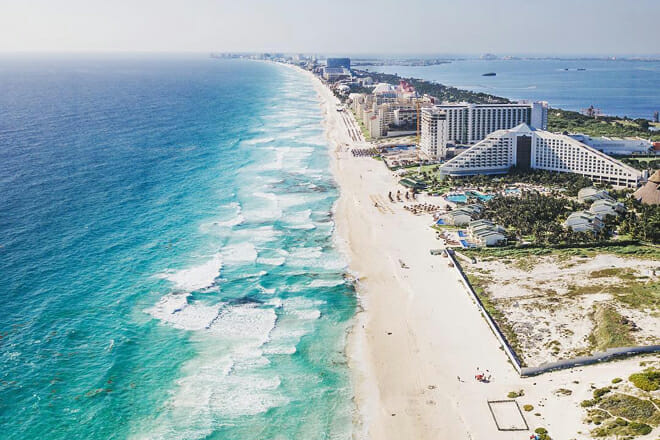
Cancun’s Safety for Tourists
So, you might be wondering, is Cancun safe for tourists like you?
The Mexican government is working hard to ensure Cancun remains a safe destination for tourists.
So, yes, Cancun is generally considered to be safe for tourists.
But remember that every travel destination has potential risks, and the best thing you can do is follow safety tips and always stay vigilant.
Violent Crime and Organized Crime
You might hear stories about violent and organized crime, especially in regions like Quintana Roo, Mexico.
But it’s important to remember that these incidents are often isolated and not targeted at tourists.
In fact, most violence cases reported in Cancun stem from inter-cartel disputes, which typically don’t impact the tourist areas.
As the table above shows, Cancun has a lower risk of violent crime than Mexico, with minimal impact on tourists.
Common Safety Concerns for Tourists
Of course, in any travel destination, there are some common safety concerns you should be aware of.
Here are a few tips to keep you safe on your Cancun adventure:
- Be mindful of your surroundings and keep your belongings secure.
- Avoid walking alone, especially at night and in unfamiliar areas.
- Stick to well-lit, populated areas and avoid venturing into deserted places.
- Refrain from flashing money or expensive items and keeping valuables out of sight.
- Only use official taxis or ride-sharing services like Uber.
Travel Advisory and US Embassy Recommendations
Us state department travel advisory.
Planning a trip to Cancun?
The first thing you should do is review the current travel advisories.
As of October 5, 2022, the US State Department advises travelers to exercise increased caution in downtown Quintana Roo due to crime and kidnapping.
Crime can happen anywhere and anytime, even in popular tourist destinations like Cancun.
While these recent cases were not directed at tourists, it urges travelers to maintain high situational awareness to avoid potentially dangerous situations.
Stay informed, and check for these advisory updates before your trip to plan accordingly.
Smart Traveler Enrollment Program (STEP)
Moving on, let’s talk about the Smart Traveler Enrollment Program (STEP).
STEP is a free service offered by the US Department of State that allows US citizens traveling abroad to enroll in their trip with the closest US Embassy or Consulate.
Signing up for STEP is like having a digital travel buddy keeping you in the loop.
By joining STEP, you can:
- Receive important information from the US Embassy about safety conditions in Mexico
- Help the US Embassy get in touch with you in case of an emergency
- Keep up-to-date with the latest travel advisories and alerts
It’s a gem you’ll want to add to your travel arsenal.
US Embassy in Mexico City
Lastly, let’s address our point of contact: the US Embassy in Mexico City.
It’s important to know your nation’s embassy’s exact location, just in case you need their assistance in Cancun.
Here’s the essential info on the US Embassy in Mexico City:
- Address: Paseo de la Reforma 305, Colonia Cuauhtémoc, 06500 Mexico City, Mexico
- Phone: +52 55 5080 2000
- Website: https://mx.usembassy.gov
In the wise words of travel expert Rick Steves, “When you travel, just remember that a foreign country isn’t designed to make you comfortable. It’s designed to make its own people comfortable.”
So, stay informed, connected, and always exercise caution when traveling.
Safety Tips for Traveling in Cancun
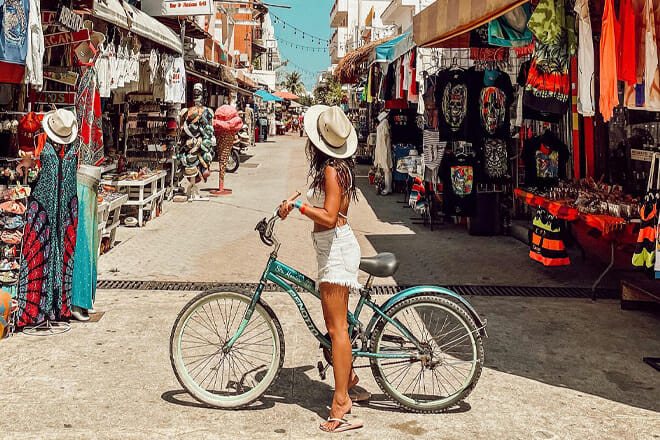
Transportation Safety
Getting around Cancun is a breeze if you’re mindful of your transportation choices.
Be cautious when hailing taxis, as not all drivers are trustworthy.
Stick to the official taxi services or use Uber for added safety.
When riding buses, keep an eye on your belongings, especially in crowded areas.
Staying Safe at Hotels and Resorts
Cancun is known for its luxurious resorts and hotels , many of which are located in the Hotel Zone.
Choose accommodations that prioritize safety and have positive reviews to ensure a worry-free stay.
It goes without saying, but don’t share your room number or personal information with strangers.
Traveling with valuables?
Utilize the safety deposit box in your room, and always lock your doors, even when you’re inside.
Beach and Ocean Safety
The white sand beaches of Cancun are world-famous .
Still, it’s important to stay vigilant while enjoying the sun and surf.
Stick to supervised beaches, swim with a buddy, and watch for warnings or flags indicating ocean conditions.
Pay attention to weather forecasts, and avoid swimming during the rainy season, as unpredictable weather can lead to strong currents.
Avoiding Scams and Petty Crime
When it comes to safety in Cancun, being aware of potential scams and petty crime is essential.
The good news is that you can drastically reduce your chances of falling victim to these annoying occurrences.
With some handy-dandy preventative measures and a bit of common sense,
ATM Scams and Cash Handling
One thing to be cautious of is ATM scams.
These can happen anywhere, so it’s always good to be vigilant.
Choose ATMs wisely, preferably those located within banks or reputable establishments.
If something seems off or the machine looks tampered with, find another one.
When handling cash, be discreet and try not to flash large amounts publicly.
Carry a reasonable amount of money for your day, and avoid carrying your entire vacation budget in your wallet.
If you need to exchange currency, stick to authorized exchange bureaus or banks.
And when paying for goods or services, stay alert for counterfeit bills and incorrect change.
Most importantly, trust your instincts.
If something feels off, chances are it probably is.
Passport and Personal Document Safety
The Yucatan Peninsula, including Cancun, is relatively safe.
Still, it’s best to take precautions with your passport and other important documents.
Here are some tips to help protect your personal belongings:
- Keep your passport and other important documents in a safe place, like your hotel room safe or locked luggage.
- Carry a photocopy of your passport, leaving the original stowed away.
- Be cautious about sharing personal information with strangers or posting it online.
- Don’t leave your belongings unattended, even during a quick trip to the restroom or when swimming at the beach.
Solo and Female Traveler Safety
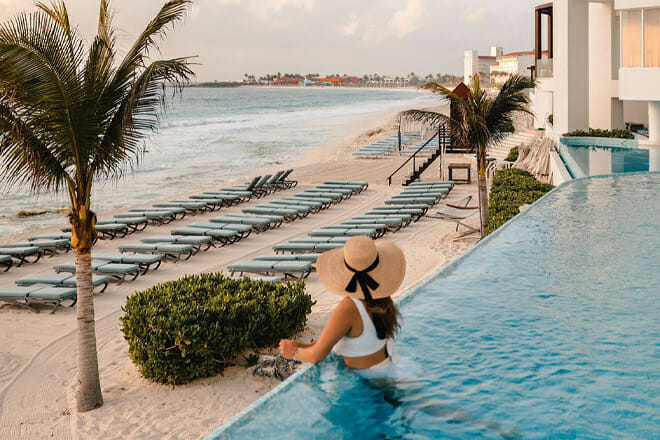
Safety is a top priority for a solo female traveler, especially when exploring new destinations like Cancun.
The good news is that Cancun is generally considered safe for solo female travelers and backpackers.
Nevertheless, staying aware and taking precautions is essential to ensure a smooth and enjoyable trip.
Safety Tips for Solo Female Travelers
1. Choose accommodations wisely
When booking your stay, opt for well-reviewed hotels or hostels in safe areas.
Check online reviews from other solo female travelers for up-to-date information on safety and security.
2. Be aware of your surroundings
Always stay alert, especially in crowded areas where pickpockets might lurk.
Trust your instincts; remove yourself from the situation if something doesn’t feel right.
3. Dress modestly
Adapting your wardrobe to suit the local culture and customs may help you avoid unwanted attention.
4. Plan transportation ahead of time
Book transfers or use trusted taxis to avoid getting lost or stranded, especially at night or when traveling between cities.
5. Keep your valuables safe
Carry a secure, cross-body bag to store your passport, money, and phone.
Don’t flaunt expensive items.
If you must bring one, keep it in the safe at your accommodation.
My Little Embarrassing Story
This reminds me of the time I first visited Cancun by myself.
I was naive and a little too excited to explore, so I didn’t fully plan my transportation ahead of time.
My adventurous heart was ready to embrace you, but my map skills?
Not so much.
I aimed for Playa Delfines, but my lack of Spanish had me zipping through a labyrinth of colorful streets instead.
There I was, a wayward traveler when a fragrant tamale stand lured me.
Enter the fabulous Carmen – tamale queen and Cancun sage.
She spotted my bewildered face and mother-henned me instantly.
With her lively daughter, Sofia, as my impromptu guide, I was off on an unplanned adventure.
We chatted about dreams and passion.
Carmen even shared her secret tamale recipe.
When the ocean breeze finally caressed my face at Playa Delfines, my heart was full.
I found the beach, but more than that – I stumbled upon the rich tapestry of Cancun’s soul through the hearts of its people.
Here’s to getting lost and finding treasures untold in the smiles of strangers.
Remember, you’re not alone in your solo adventure.
Countless other solo female travelers and backpackers have enjoyed Cancun safely.
By following these tips and staying vigilant, you’re all set for a fantastic, stress-free trip to this beautiful destination.
Regional Comparisons
When deciding to visit a new place, it can be helpful to compare it to nearby areas to put our concerns into perspective.
Here’s how safety in Cancun compares to other Mexican cities and regions.
Safety in Other Mexican Cities and Regions
Cancun is part of Quintana Roo, a Mexican state generally considered to be safe for tourists.
Compared to other states, popular tourist destinations like Tulum, Riviera Maya, Cozumel, and Playa del Carmen require standard travel precautions when visiting.
Now, let’s briefly examine the safety of some other cities and states in Mexico:
- Tamaulipas : This northern border state has a particularly high crime rate, and travelers are advised to exercise extreme caution when visiting.
- Zacatecas : While this central state might be famous for its cultural activities, travelers should be cautious due to increased violence and crime in recent years.
- Colima : This small state has seen a rapid rise in crime, primarily due to drug gang violence. It’s best to avoid non-essential travel here.
- Baja California : A popular destination, the region has had increased crime and violence, with tourists being advised to reconsider travel.
- Jalisco : This state, which includes the beautiful city of Guadalajara, has experienced increased crimes, and tourists are advised to reconsider travel.
- Yucatan : Home to Merida and the stunning Chichen Itza, the Yucatan is considered one of the safest states in Mexico, with a relatively low crime rate.
- Michoacan : This state has experienced a significant number of crimes due to drug cartels. It’s best to avoid traveling to most parts of Michoacan.
- Nayarit : While some areas in this state have increased violent crime, resorts like Punta Mita and Sayulita are considered safe for tourists.
It’s important to remember that safety can vary greatly depending on the specific region within a state.
Comparing Cancun to a completely different location, like South Carolina, might not provide a true sense of its safety.
Stick to popular tourist destinations, and exercise standard precautions during your travels to get the most out of your trip.
Parting Words
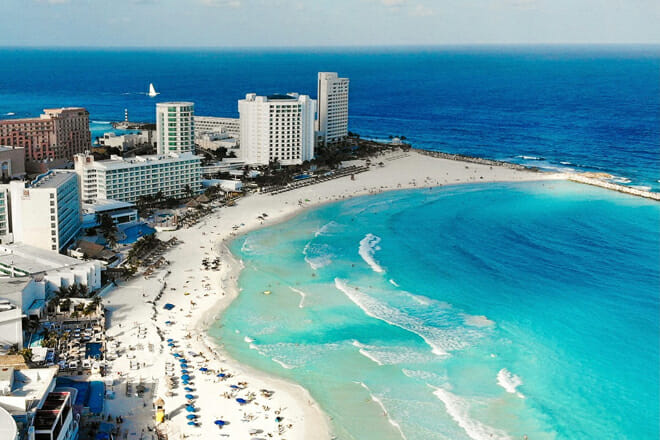
So, is Cancun safe for you to visit?
Like any popular tourist destination, Cancun has its share of challenges.
But with some awareness and common sense, you can confidently enjoy the beauty and excitement that Cancun has to offer
Remember, it’s essential not to let your guard down, even in paradise.
Stay aware of your surroundings, avoid high-risk areas, and keep an eye on your belongings.
Opt for reputable tour operators and transportation services, and steer clear of walking alone at night in unfamiliar areas.
But don’t let these concerns dampen your spirits.
By staying aware and making smart choices, you can have the time of your life in Cancun.
That being said, don’t forget to savor the incredible moments Cancun provides.
You won’t get enough of this Mexican jewel with its stunning beaches, vibrant nightlife , and rich cultural heritage.
Most importantly, enjoy the journey and trust yourself to navigate any situation.
You’ve got this.
Related: Which Part of Cancun is Good for Families?
Frequently Asked Questions
Where is the safest place in cancun.
When choosing a place to stay in Cancun, you’ll want to prioritize safety. The Hotel Zone is considered very safe for tourists, with many top-notch resorts and hotels featuring private security. Stick to well-known, reputable properties, and always trust your instincts.
Is Cancun Safe To Walk Around?
Cancun is relatively safe to walk around, especially in the Hotel Zone and other tourist-centric areas. Exercise common sense precautions like keeping your belongings secure and avoiding wearing flashy jewelry. As a rule of thumb, stick to well-lit, populated streets and avoid wandering into unfamiliar areas alone.
What’s The Status of Cancun Airport’s Safety?
Cancun International Airport is a major tourist hub, so safety measures are in place to ensure a smooth experience for visitors. Keep an eye on your bags and be cautious when hiring transportation. Opt for authorized taxis or pre-arranged car services, and avoid accepting rides from strangers.
How Is Solo Female Traveler Safety Like In Cancun?
Solo female travelers can enjoy a safe trip to Cancun by following standard safety tips. Stick to well-trafficked areas, be cautious when sharing personal information with strangers, and avoid walking alone at night. Trust your intuition, and don’t be afraid to say no to uncomfortable situations.
What Are The Current Travel Restrictions In Cancun?
Staying current on the latest travel restrictions is essential due to the ever-changing global situation. Mind that restrictions may vary based on your nationality or departing country. Before your trip, check the official government travel advisories or consult your travel agent to ensure you have the most accurate, up-to-date information.
Is It Safe To Go To Cancun At Night?
Remember to exercise caution while enjoying Cancun’s vibrant nightlife. Stick to popular areas like the Hotel Zone and avoid venturing into poorly-lit or unfamiliar neighborhoods. Keep your valuables secure, avoid excessive alcohol consumption, and never leave drinks unattended. As always, trust your instincts and opt for safer, well-regarded venues.
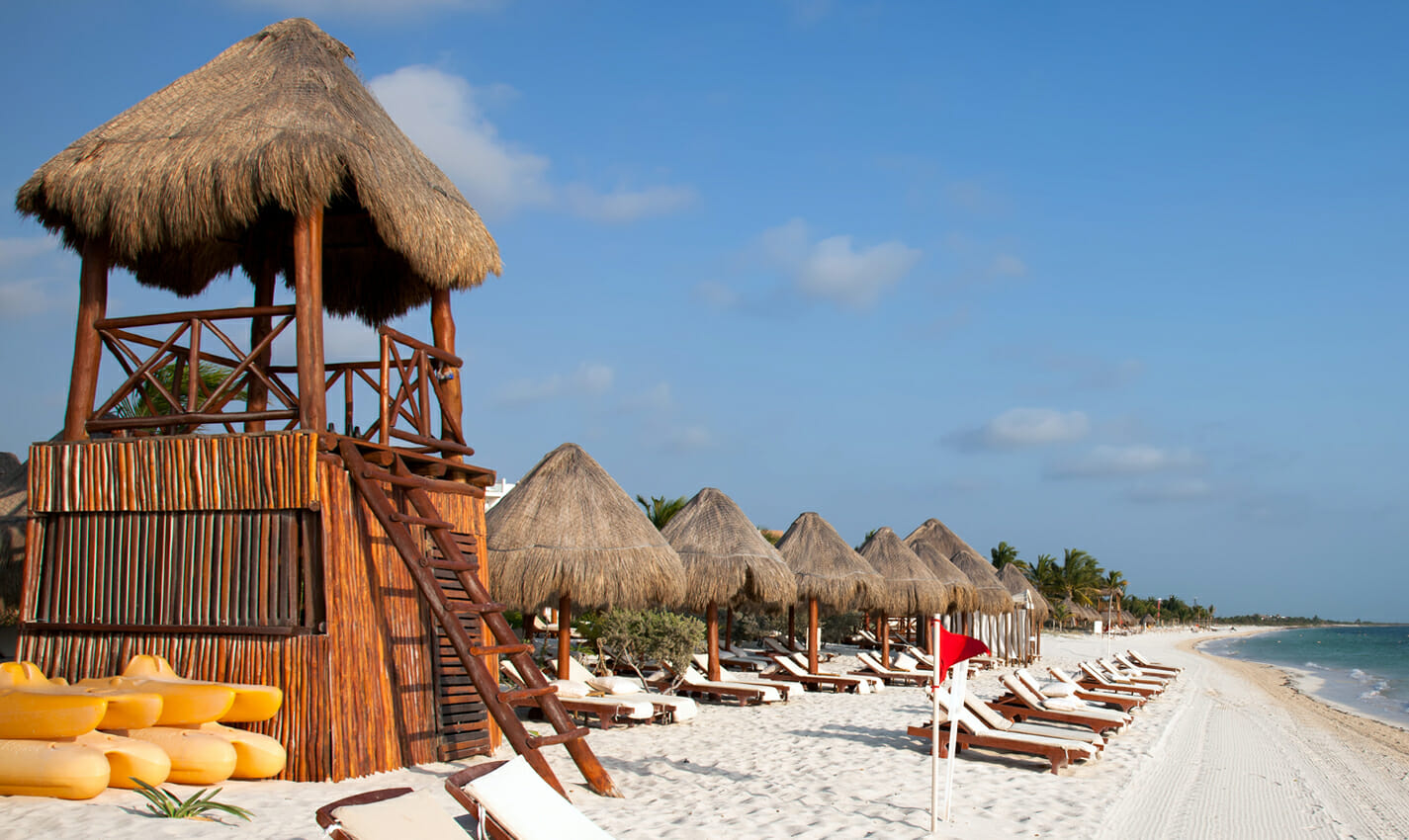

Is Cancun Safe to Visit in 2024? Travel Warnings And Safety Tips
Written By: ThePlanetD Team
Updated On: March 21, 2024
We have been to Cancun many times over the years, and one of the main questions that we always get is, “Is Cancun safe?” Truthfully, the situation has always been fluid, and while we have personally felt safe in Cancun, it is important to check your government website warnings, follow basic safety precautions, and be aware of your surroundings. Mexico takes its tourism seriously and they want international visitors to continue to spend their dollars, so they are working hard to keep Cancun safe, especially in the tourist zones and the tourist hotspots.
Table of Contents
Is Cancun Safe to Visit?
As of March 2024, the US State Department updated its travel warnings for Quintana Roo, which is home to Cancun, Playa del Carmen, and Tulum. It removed the warning about an increased risk of kidnapping, but the country is still under a level 2 advisory.
As of March 2024, the Government of Canada notes that the region of Cancun has high rates of violent crime, such as homicides, kidnappings, carjacking, and assaults.
Cancun’s Current Safety Situation
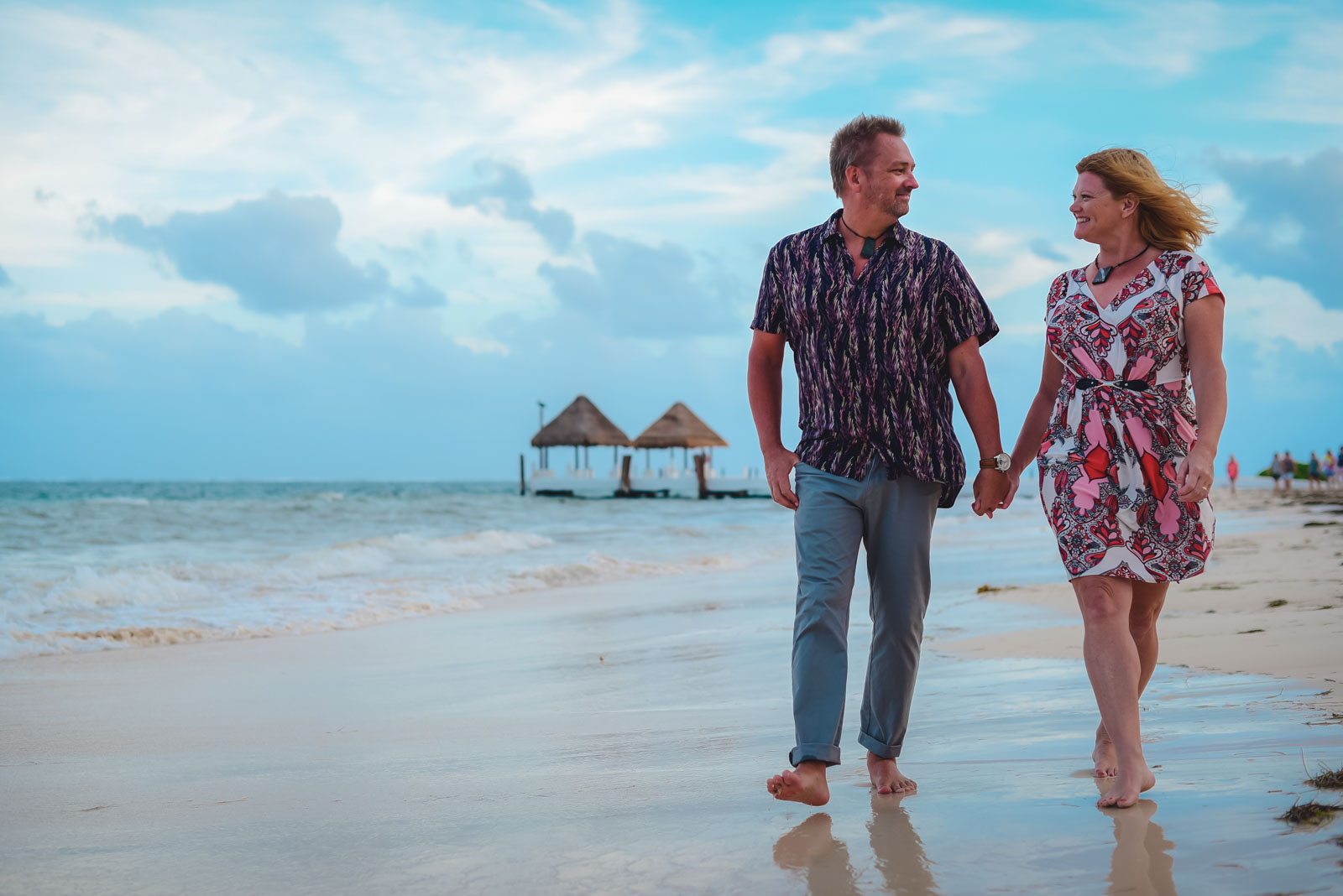
Cancun is located in the State of Quintana Roo, which also includes Playa Del Carmen, Tulum, Cozumel, and the Riviera Maya. These areas bring in a lot of dollars into Mexico, and this is certainly one of the safer areas in the country, especially compared to other states. If you follow these tips and do your own research, you will find that you will feel a lot safer on your next trip should you choose to travel to Cancun.
Short Summary
Cancun’s security has been under a microscope due to incidents of criminal activity involving tourists. The Mexican government has taken great action to ensure the safety of visitors and citizens in Cancun. According to the US State Department, the Yucatan Peninsula is the safest region in Mexico for Americans in 2024. However, the State Department does have a travel advisory of “ exercise increased caution ” in the state of Quintana Roo.
- Cancun is generally safe for travelers but take necessary precautions and take government website travel alerts into consideration.
- Follow safety tips like avoiding walking alone at night and sticking to well-known establishments.
- Familiarize yourself with local laws, use reputable transportation services, and opt for filtered water when traveling in Cancun!
Mexico Travel Advisories
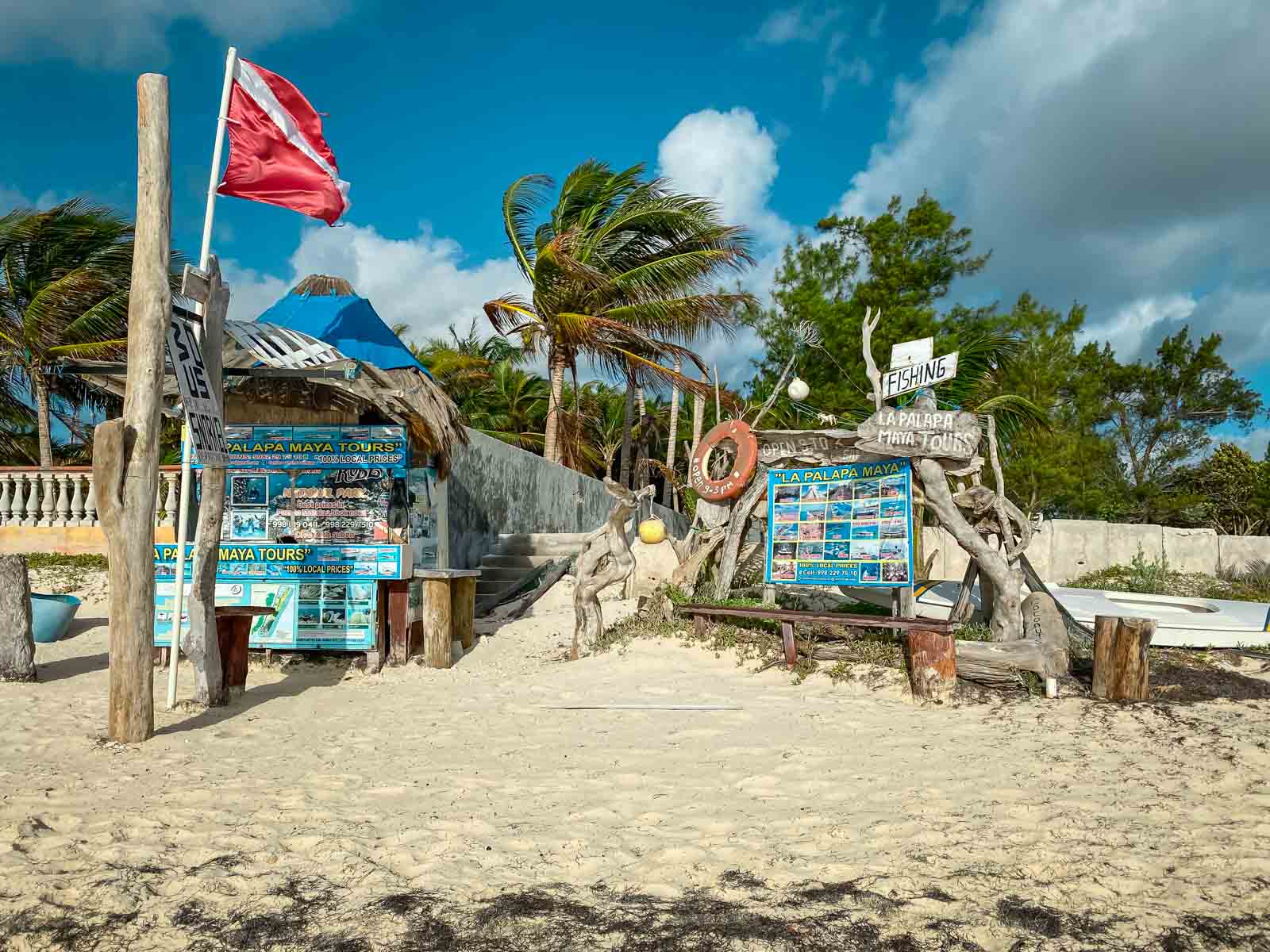
For the latest advisory warnings, visit th e US State Department’s Website . Right now the State Department website warns that ” Violent crime – such as homicide, kidnapping, carjacking, and robbery – is widespread and common in Mexico. ” However, when you read further it states, “Exercise Normal Precautions When Traveling To the Yucatan State.
**Update**: On February 27, 2024, the U.S. Embassy & Consulates In Mexico Department issued a warning for all U.S. travelers visiting Cancun and the Mexican Caribbean for Spring Break Travel in 2024. Only Cancun, Playa del Carmen, and Tulum were mentioned in the warning. You can check out the full message here and what they suggest.
Canada currently has a warning of “High rates of violent crime, such as homicides, kidnappings, carjacking, and assaults, including in popular tourist destinations such as the Mayan Riviera (Cancún, Playa del Carmen, Puerto Morelos and Tulum), and Acapulco.” It states that drug cartels have a presence in tourist areas. There has been intergang fighting at establishments frequented by tourists where innocent bystanders have been killed or injured.
Incidents like this can happen in any large city or tourist destination. To put things into perspective, Cancun currently has a crime index of 56.33. When you look at the crime rate in New Orleans, Cancun is much lower than the rating of 67.92. See the comparison here.
Crime Rates in Cancun
Cancun has a crime rate that is similar to many major cities in the United States, most of which revolve around drug-trafficking turf wars and gang-related violence. Tourists are rarely the target, and if you keep yourself out of trouble. Avoid buying drugs, don’t stay out until the wee hours of the morning, and limit your alcohol consumption off the resort. By following common sense safety measures, you can lower your chances of any incident.
Compared to other Mexican cities, Cancun’s crime rate remains relatively low, meaning vacationers shouldn’t be too concerned about any crimes during their visit. However, they should still exercise a degree of caution.
Mexican Government’s Efforts
The Mexican government has increased security around Cancun International Airport by dispatching extra police forces and protection systems, in order to put a stop to petty crime that mainly targets travelers.
To protect Cancun’s standing as a favored tourist spot, the Mexican government has taken extra security steps. These include a greater police presence at popular tourist areas such as resorts within the Hotel Zone , surveillance cameras, and gated entrances for visitors.
Initiatives were also undertaken to reduce corruption among law enforcement in this area, which resulted in numerous police officers being relieved of their posts, along with several top-level personnel being removed from office due to misconduct. You can read about it here .
Collaboration between local companies and tourism workers also supports a safer atmosphere. Extra tourist police, state police, the national guard, and even the Navy patrol the beaches.
The Hotel Zone
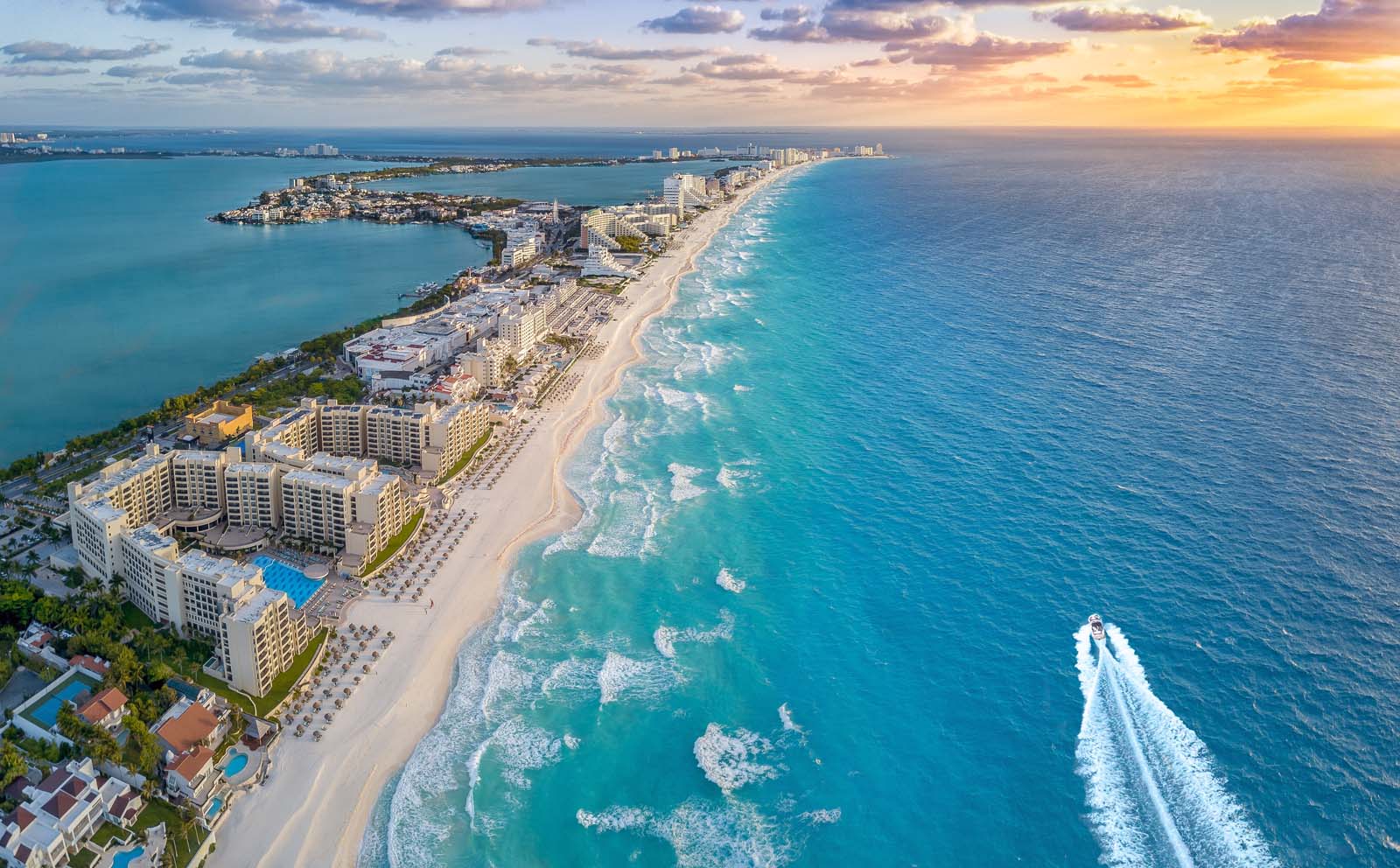
Staying within the Hotel Zone Cancun is one of the safest areas to stay in Cancun. Police patrols, surveillance cameras, and gated resorts all provide an extra layer of security for guests staying at the numerous high-end accommodations in this area. That doesn’t mean you should let your guard down we still recommend that you avoid walking alone at night or in secluded areas.
Cancun is a popular destination for Spring Break, and the kids love to party the nights away in the clubs of Playa del Carmen or Downtown Cancun. Our advice is to party responsibly. If you decide to go downtown Cancun to party for the night, exercise increased caution if you are going to local bars, stay in groups, don’t overdrink, and make sure to use an authorized taxi. It is when you drink too much and let your guard down that you become a target.
Best Practices for Staying Safe in Cancun
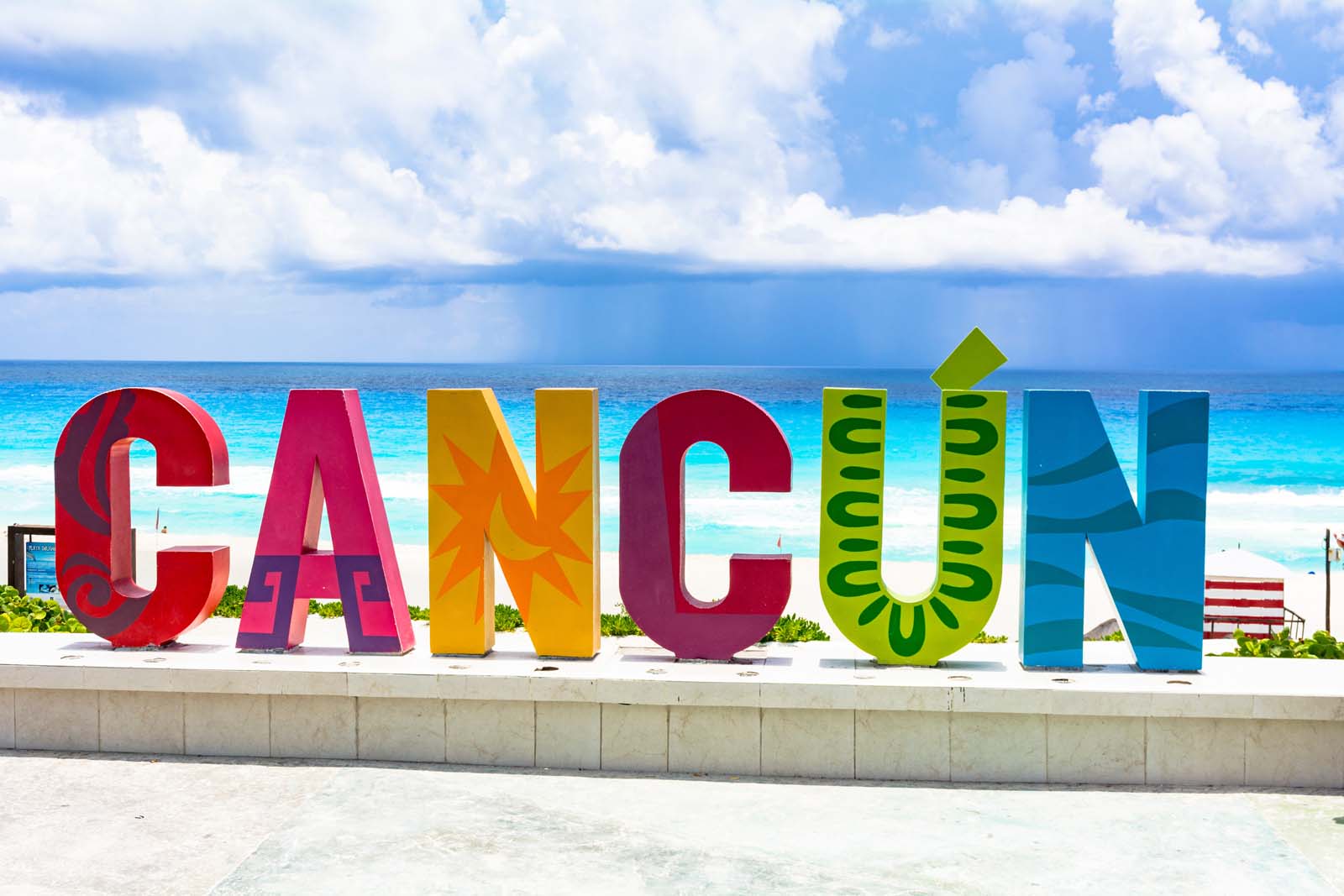
When vacationing in Cancun, it is important to remember that even though you are enjoying a vacation in popular tourist destinations, that doesn’t mean you let all common sense go out the window. A lot of people tend to think they are invincible on vacation, but this is when things can go wrong. Visitors to Cancun can have a great experience if they use common sense and exercise safety precautions. When visiting Quintana Roo or any other Mexican State, keep a few things in mind.
Cancun Airport Safety
Landing at the airport can be one of your most vulnerable times. The arrivals area is crowded and confusing, which makes it easy to fall victim to a travel scam. We recommend that you exercise caution and think before you accept any rides, offers, or help from a “good Samaritan.” Despite its relatively low rate of violent offenses, visitors entering through Cancun airport can still fall victim to potential scams such as fake taxi drivers and pickpocketing in crowded locations.
Our safety advice for landing at the airport is to a private transfer in advanc e to your hotel, keep an eye on your valuables, and don’t leave anything unattended. If you need cash, go directly to the ATM, but we suggest bringing American dollars and small bills with you.
Transportation Safety
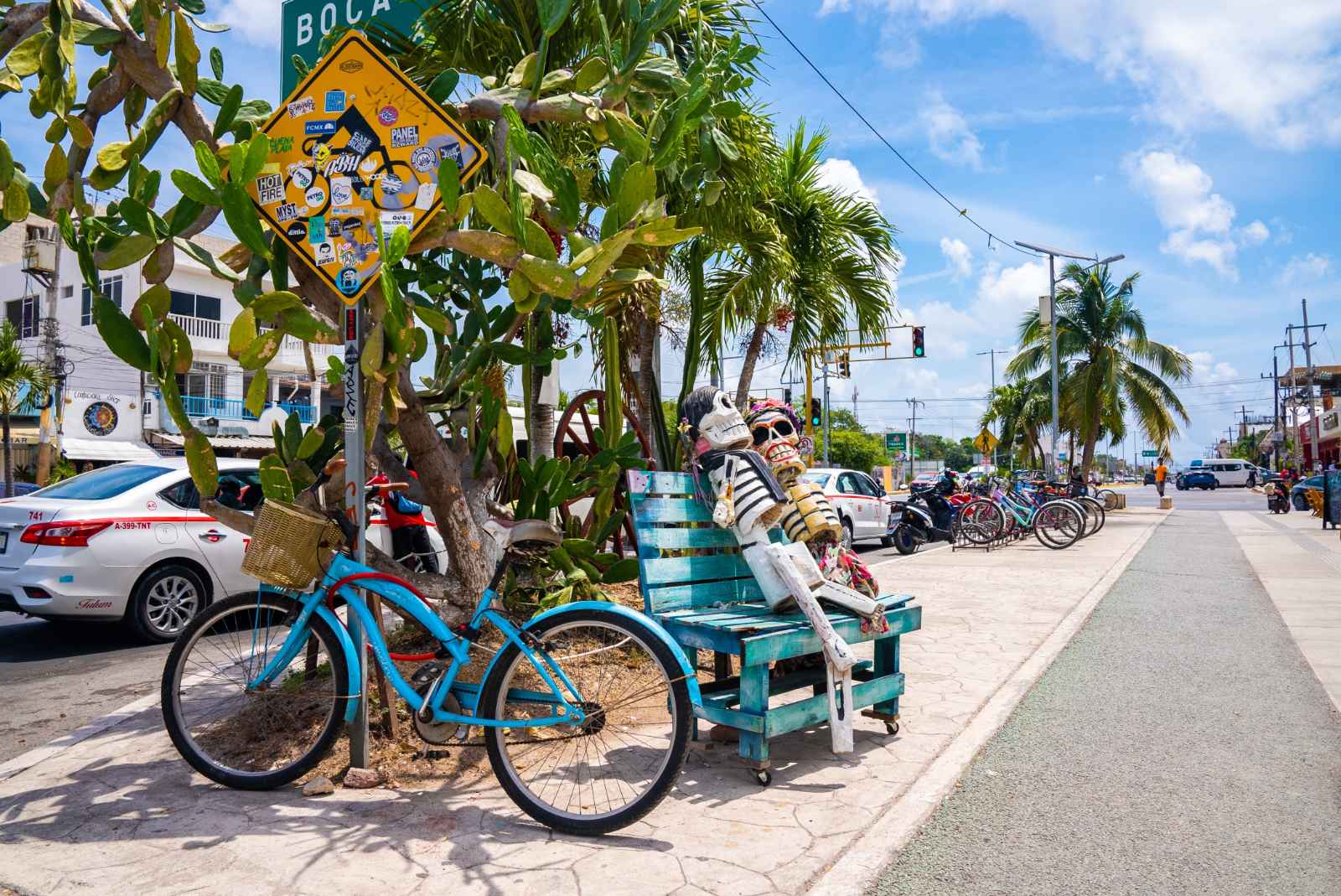
There are many different ways to get around Cancun. If you want more freedom, we recommend renting a car. We have also taken local transportation without incident. However, if you want to have added safety, booking an organized tour is a good option. You can book a night out bar hopping with a local guide, city tours with a guide, and excursions with a guide, making it safer to travel.
Taxis and Ridesharing Services
Travelers in Cancun can enjoy secure and reliable transportation options by utilizing authorized taxis or reliable apps like Uber. When getting into a cab, make sure to ask them to put on the meter. Also, plan your route ahead of time, and be aware of the approximate costs before setting off so as not to be scammed.
Ridesharing services such as Uber are available in Cancun. But use caution as there have been reports of violence between taxi drivers and Uber drivers due to contract disputes. . If you are staying in a resort, we recommend using the taxi drivers that they have a contract with otherwise, you will have to go off the resort to book an Uber.
Buses and Public Transportation
Cancun’s buses and public transportation are typically reliable, inexpensive, and easy to access for anyone looking to discover the city. Public transportation is generally safe, but it is better not to ride it alone or late at night.
Rental Cars and Driving Tips
Using a rental car in Cancun can be an ideal way to enjoy the sights and attractions at your own pace. Make sure to book with trusted car hire agencies we use RentalCars.com. You will have to get additional insurance Third Party Liability and Public Liability Insurance are mandatory. And make sure you avoid being on the roads after dark.
By observing these tips, people will reap all the benefits associated with renting cars while feeling safe traveling through Cancun’s streets and reveling in views of its glorious bright blue Caribbean Sea.
Food and Drink Safety in Cancun

Food is generally safe to eat in Mexico, especially in popular destinations. Our general rule when eating is that it should be avoided unless it is cooked or able to be peeled. When eating at restaurants, we always look for places that are packed with locals. This is how you know it will be fresh. Think about raw foods that would be washed in tap water. When it comes to fruits and vegetables, we don’t eat them unless they are cooked or can be peeled.
Tap Water Safety
Visitors to Cancun should not drink unfiltered tap water, and it is recommended that they stick to bottled water. We like to use a SteriPen so that we don’t contribute to plastic and avoid ice.
Although tests may show local tap water as safe enough for drinking according to regulations, microorganisms can still be present, which could lead to health problems.
Street Food and Restaurant Precautions
We have eaten street food in Mexico, and it is delicious, but tourists should still be cautious when choosing where to eat. Don’t eat salad or vegetables that aren’t cooked, and make sure the meat is freshly cooked in front of you. You don’t want to eat something that has been sitting in the heat for hours. Select freshly prepared meals, steer clear of uncovered dishes, and go for a well-known, busy place to eat.
Health and Medical Safety in Cancun
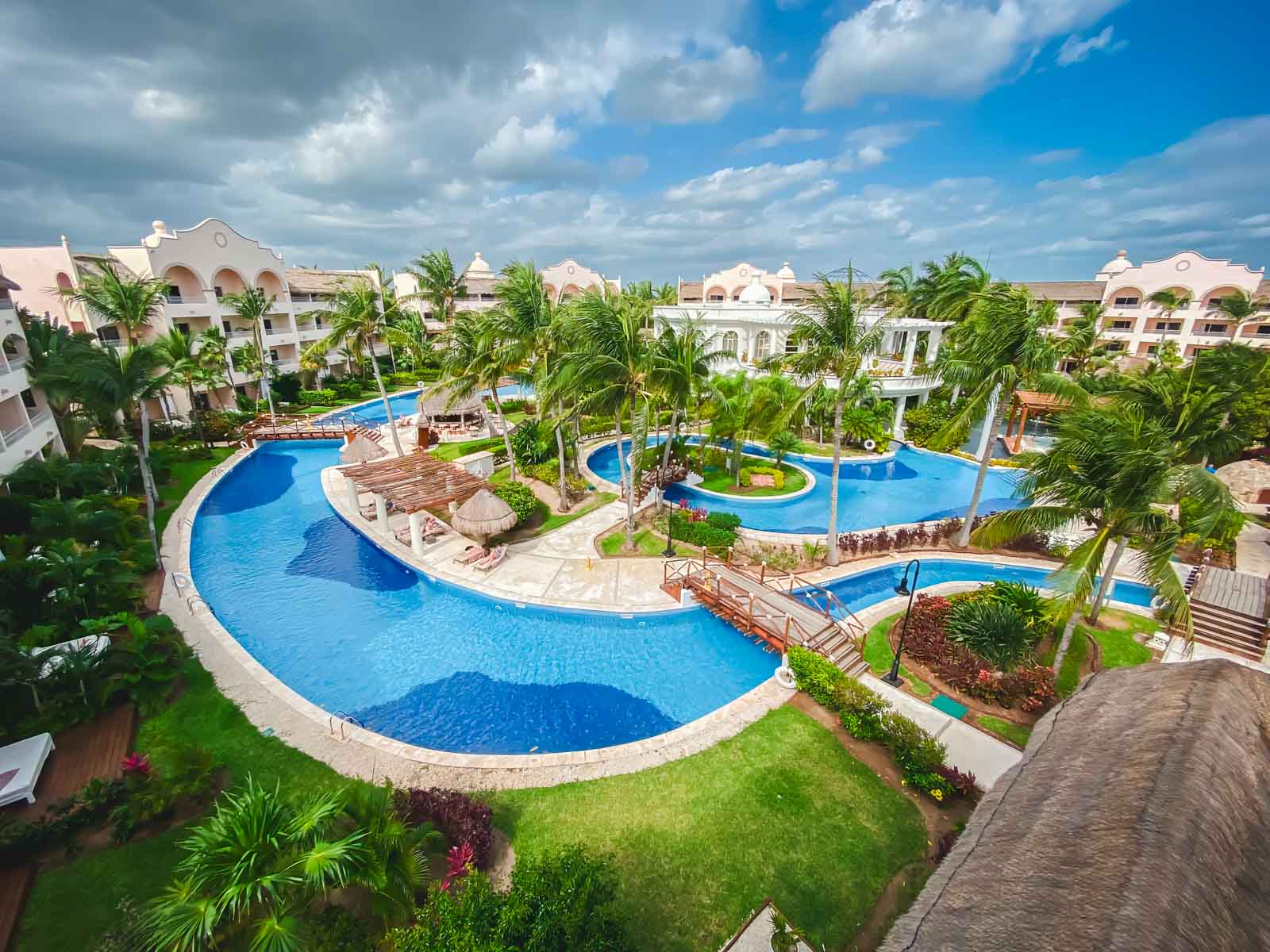
When visiting Mexico in general we highly recommend having travel insurance. Medical emergencies can happen, and it is a small price to pay for peace of mind. You may also want to look into what medications and vaccines you need. Make sure that your routine vaccines are up to date, and you may consider additional vaccines. Hepatitis A and B are good to get, and you may want to update your tetanus. For up-to-date travel health notices in Mexico, visit the CDC website.
Mosquito-borne illnesses can also be an issue, so pack bug spray and wear lightweight long sleeves if going into the jungle. In case of a medical emergency, there are healthcare services available that tourists can access if required – adding another layer of protection on top of their Mexico travel insurance policy.
Is Cancun Dangerous for Solo Travelers?
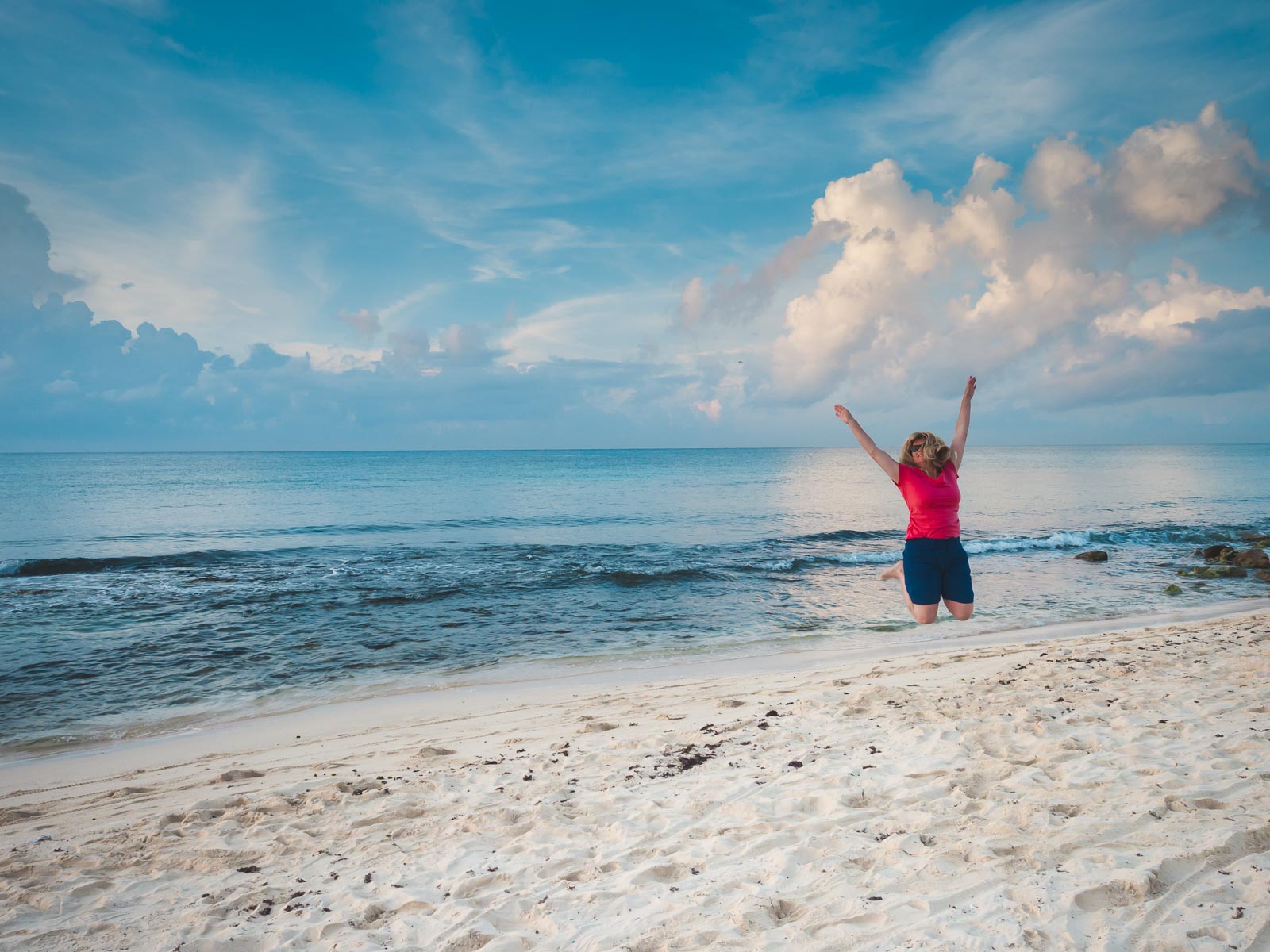
Many people travel to Cancun as solo travelers, and it is considered generally safe to visit alone. Before traveling, solo travelers should research the area and let people know where they will be. Check-in with family and friends back home frequently by providing them with information about where you’ll be going during each part of your journey so they know your whereabouts. By adhering to these basic guidelines for security, an unforgettable trip awaits any adventurous solo traveler who decides to explore this picturesque Mexican destination.
Many of our recommendations, regardless of the destination, are to not walk alone at night or in secluded areas, so if you are traveling alone, stay in lit areas, don’t stay out too late, and stick with the crowds.
Make sure to choose a safe hotel in a good area, use trustworthy transportation services, and avoid any illegal drugs or areas with high crime. Signing up for local tours can provide additional safety as you’ll be able to go sightseeing in a group with an expert guide. Plus you’ll make friends with some other tourists.
Is Cancun Safe for a Solo Female Traveler?

Cancun is largely considered secure for solo female travelers as well. The same recommendations can be made to avoid deserted areas and walking alone at night, and take taxis. Choose safe accommodation, preferably in the hotel zone, and use common sense and take extra precautions.
Women are more vulnerable than male travelers, and a woman can catch unwanted attention. Don’t go out alone late at night, use trustworthy taxis, don’t wear expensive jewelry, and the hotel room safe for your valuables.
Frequently Asked Questions
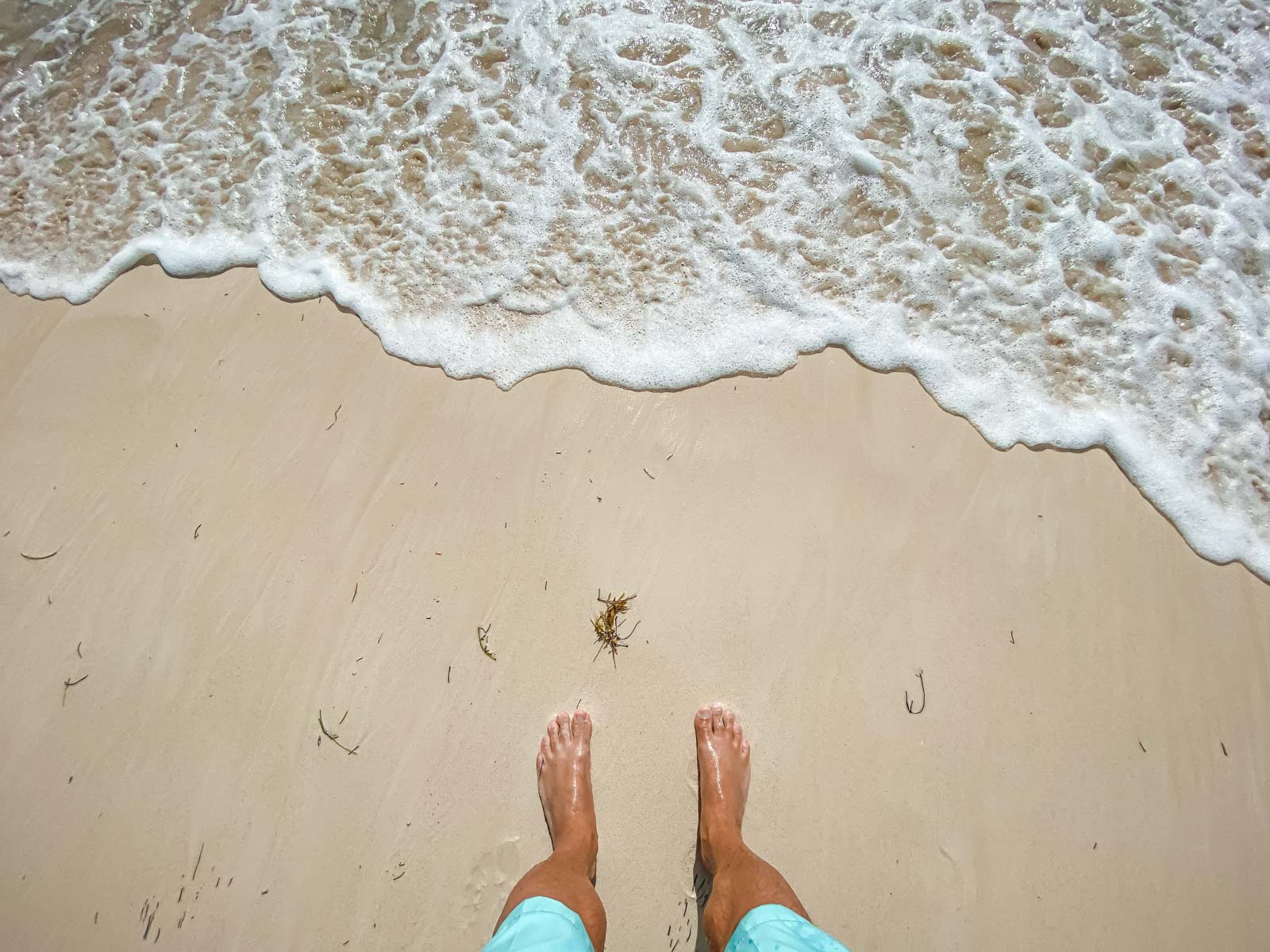
Is Cancun safe right now 2024?
The US State Department notes that Cancun has friendly locals and is one of the safest areas in Mexico, with a low crime rate. So you can have an amazing experience by planning your getaway to this destination come 2024! Relax, knowing you will be safe during your stay here. Making it absolutely unforgettable.
How safe is Cancun for American tourists?
The US State Department has assessed Cancun as one of the safest places to visit in Mexico, and thus, it is Safe for tourists making a trip there in 2024. To ensure you enjoy your time while still staying secure, practice caution with regard to where you go and who you talk to, and always be aware of your surroundings.
Is Cancun safe to walk around?
When visiting Cancun, travelers should always take precautions to remain safe. The Hotel Zone, in particular, offers a secure atmosphere with numerous all-inclusive resorts, international hotels, and beaches for visitors to enjoy without fear of crime rates that are low outside the hotel zone.
Overall it is possible to have an unforgettable trip when exercising caution and keeping safety measures at hand during your time here, which will result in a rewarding experience.
Is Cancun safe at an all-inclusive?
When it comes to booking an all-inclusive holiday in Cancun, you can be confident that the resort is secure. Most properties have measures such as security guards with firearms to make sure visitors feel safe during their stay.
With some planning and investigation beforehand, travelers will be able to enjoy a stress-free break away from home in one of Mexico’s picturesque cities.
Is it still safe to travel to Cancun right now?
With care and knowledge of local customs, Cancun is an excellent destination for travelers that remains relatively secure. Hence, caution and respect should be exercised to make sure a safe journey is had while visiting the area.
Our Safety Recommendations For Cancun
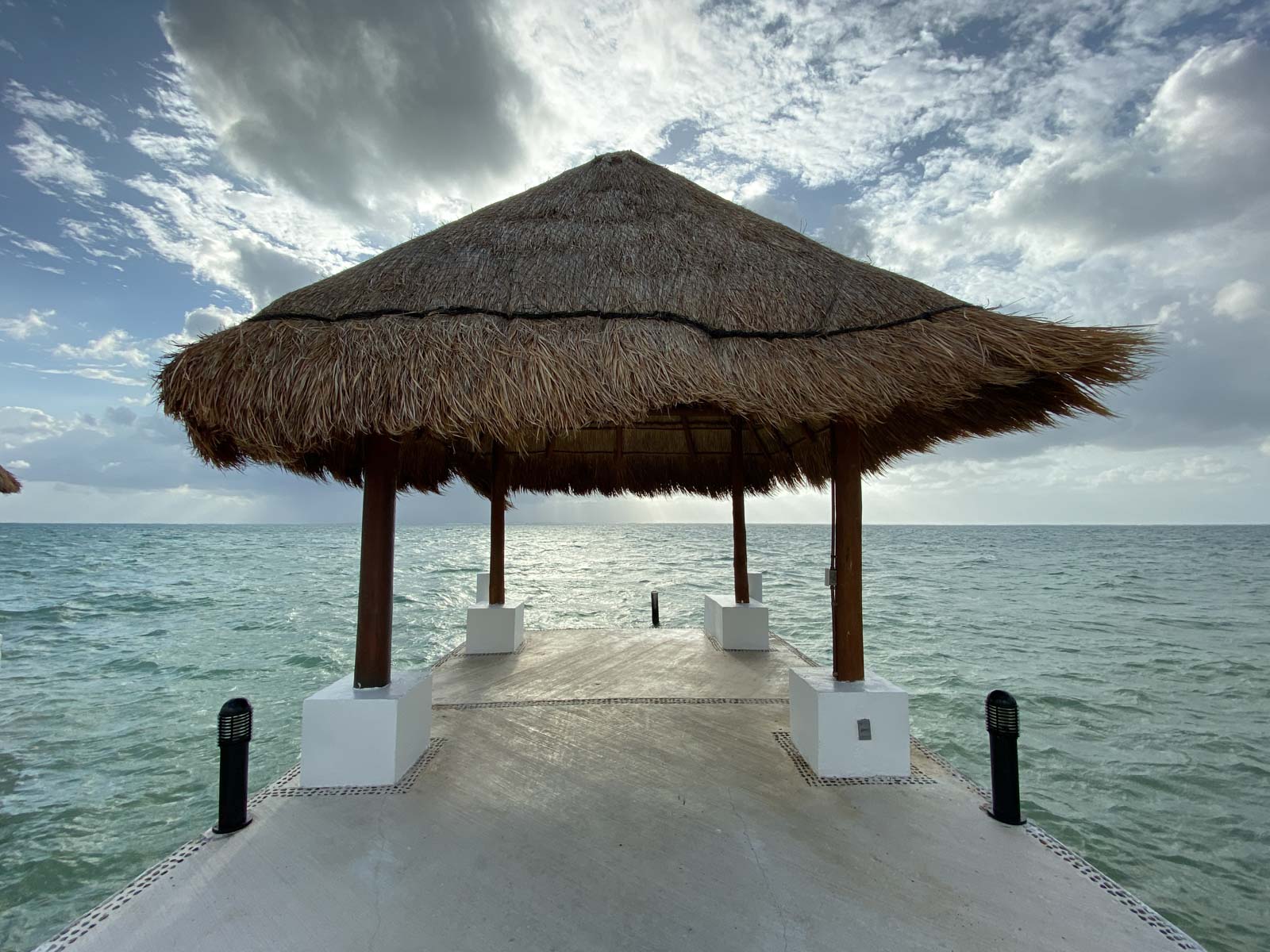
Cancun is an attractive tourist destination to visit, offering a secure holiday when the appropriate steps and precautions are taken. Staying up-to-date on safety updates, bearing in mind some basic security tips, staying up to date on current Mexico travel warnings, and keeping any dangers that may arise at bay will enable travelers to enjoy Cancun fully without worry.
So get ready for your trip by packing all you need (including sunscreen) for what promises to be an unforgettable experience – complete with sand, sunshine, and of course memories galore!
Plan Your Next Trip to Cancun with These Resources
- Mexico City: Best Things to Do in Mexico City for an Epic Trip
- Cancun: 21 Amazing Things To Do In Cancun
- Cancun: Where To Stay In Cancun: Best Hotels And Areas For Every Budget
- Playa Del Carmen: 29 of Best Things to do in Playa Del Carmen, Mexico
- Yucatan Peninsula: 23 Amazing Things To Do In Mexico’s Yucatan Peninsula
- Tulum: 23 Best Things To Do In Tulum
- Puerto Vallarta:
- 23 Best Beaches In Mexico
- Best Mexican Dishes: 27 Most Popular Mexican Foods
Travel Planning Resources
Looking to book your next trip? Why not use these resources that are tried and tested by yours truly.
Flights: Start planning your trip by finding the best flight deals on Skyscanner
Book your Hotel: Find the best prices on hotels with these two providers. If you are located in Europe use Booking.com and if you are anywhere else use TripAdvisor
Find Apartment Rentals: You will find the cheapest prices on apartment rentals with VRBO .
Travel Insurance: Don't leave home without it. Here is what we recommend:
- Allianz - Occasional Travelers.
- Medjet - Global air medical transport and travel security.
Need more help planning your trip? Make sure to check out our Resources Page where we highlight all the great companies that we trust when we are traveling.
You May Also Like
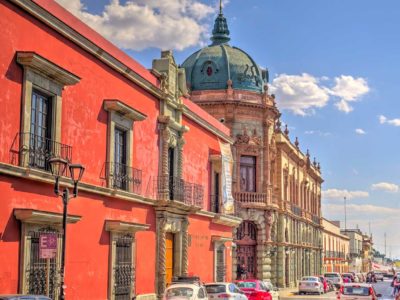
26 Best Things To Do In Oaxaca, Mexico in 2024

The Best of Loreto – Best Kept Secret in Baja California Sur
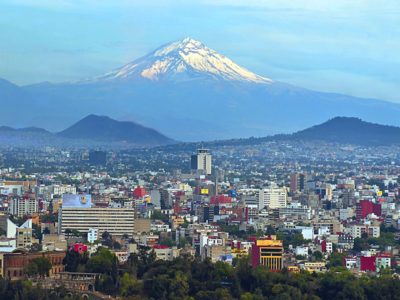
Is Mexico City Safe To Visit in 2024? Travel Warnings And Safety Tips
About ThePlanetD Team
Guest writers for The Planet D offer insider tips and information on destinations that they are experts in. We can't be everywhere at once, and it is important to have the highest level of travel information from local writers and experienced travelers.
Join thousands of others who get our monthly updates!
Leave a comment cancel reply.
Save my name, email, and website in this browser for the next time I comment.
1 thought on “Is Cancun Safe to Visit in 2024? Travel Warnings And Safety Tips”
We just got back and Cancun is extremely safe. We didn’t stay in resorts but three different locations and took local buses and walked around at night and at no time did we feel even the slightest concern about our safety or security. Using common sense travel, having a reasonable control of your faculties and not engaging in extremely risky behavior with strangers keeps any risk low. Mexican people are hard working, friendly and helpful.
- Skip to primary navigation
- Skip to main content
- Skip to primary sidebar
- Skip to footer
TravelAwaits
Our mission is to serve the 50+ traveler who's ready to cross a few items off their bucket list.
U.S. State Department Renews Warning About Travel To Mexico — Where It Says Visitors Can Travel This Spring

- News and Tips
- Travel News
Mexico is one of the most popular international destinations for American travelers. Cancun, Tulum, and Playa del Carmen particularly draw high numbers of tourists from the U.S.
However, as the spring break and Easter travel season approaches, anyone planning a trip to Mexico this spring must reckon with the sobering news of four Americans who were recently attacked by gunmen while traveling in Mexico.
The four individuals had traveled to Mexico so one could have a medical procedure. Then, in the city of Matamoros in Tamaulipas state, just south of Brownsville, Texas, the four were shot at and kidnapped. Two of them were killed in the gunfire. The other two, one of whom was also shot, have now been returned to the U.S., according to NBC News .
The U.S. Embassy & Consulates in Mexico issued a statement reminding U.S. citizens that it previously issued a travel advisory listing Tamaulipas state as a “Level 4: Do Not Travel” area in Mexico.
The natural inclination for anyone planning to travel to Mexico, as well as for family and friends of those prospective travelers, is now to question whether or not it’s safe to visit Mexico.
Zachary Rabinor, founder and CEO of the travel company Journey Mexico, says it’s important to remember that the Americans were killed and kidnapped a long distance from popular tourist destinations in Mexico.
“To put things in perspective, Matamoros is about 1,360 miles away from Cancun,” Rabinor said, according to CNN . “That’s about the equivalent distance from the Texas side of the border to Chicago, Illinois.”
Jaime Lopez-Aranda, a senior security manager at travel risk management firm International SOS, agrees that popular resort areas are still fairly safe.
“It is relatively safe for travelers to head to tourist destinations and major urban centers such as Mexico City, Guadalajara, and Monterrey,” Lopez-Aranda told CNN Travel.
Importantly, the U.S. State Department has issued a number of advisories for U.S. citizens traveling to various Mexican states in recent weeks. Now, as violent crime and kidnapping rates increase across Mexico, Americans considering travel to all but two of the states in Mexico should be aware of renewed and increased warnings, the State Department cautions.
“Violent crime — such as homicide, kidnapping, carjacking, and robbery — is widespread and common in Mexico,” the State Department explains .
“The U.S. government has limited ability to provide emergency services to U.S. citizens in many areas of Mexico, as travel by U.S. government employees to certain areas is prohibited or restricted,” the State Department continues. “In many states, local emergency services are limited outside the state capital or major cities.”
Here are the State Department’s travel advisories for each of Mexico’s states.
Do Not Travel To
The State Department advises U.S. citizens to not travel to five states in Mexico due to increasing levels of crime and kidnapping.
Those states are Colima (where Manzanillo is located), Michoacan, Sinaloa (where Mazatlán is located), Tamaulipas, and Zacatecas (home to Zacatecas City).
Guerrero — where Acapulco, Zihuatanejo, and Ixtapa are located — is also on the State Department’s “Do Not Travel” list because crime is widespread in those areas.
Reconsider Travel To
The State Department advises U.S. citizens to “reconsider travel” to five states in Mexico due to crime and kidnapping.
Those states are Baja California (where Tijuana is located), Chihuahua, Guanajuato (where Guanajuato City is located), Jalisco (home to Guadalajara and Puerto Vallarta), and Sonora.
The states of Durango and Morelos are also on the State Department’s “Reconsider Travel To” list due to high crime rates.
Exercise Increased Caution When Traveling To
The State Department advises U.S. citizens to “exercise increased caution when traveling to” 17 areas of Mexico, primarily due to crime rates but also due to the threat of kidnapping in some places.
Those states are Aguascalientes, Baja California Sur (where Cabo San Lucas , San Jose del Cabo, and La Paz are located), Chiapas, Coahuila, Hidalgo, Mexico State, Nayarit, Nuevo Leon, Oaxaca (home of Oaxaca City and Huatulco), Puebla, Queretaro, Quintana Roo (where Cancun , Cozumel, Tulum, and Riviera Maya are located), San Luis Potosi, Tabasco, Tlaxcala, and Veracruz.
Mexico City is also on the list due to high crime rates.
Exercise Normal Precautions When Traveling To
The State Department advises U.S. citizens to “exercise normal precautions when traveling to” Campeche and Yucatan, where Chichen Itza and Merida are located.
Know Before You Go
If you decide to travel to Mexico, the State Department offers some guidance.
“Exercise increased caution when visiting local bars, nightclubs, and casinos,” the State Department recommends. “Do not display signs of wealth, such as wearing expensive watches or jewelry. Be extra vigilant when visiting banks or ATMs.”
U.S. citizens with an emergency are also reminded that they can call the U.S. Embassy & Consulates in Mexico for help.
U.S. citizens on their way to Mexico are also advised to make a note of U.S. Embassy & Consulates emergency contacts in the area where they will be traveling.
Finally, the State Department recommends international travelers enroll in STEP, the Smart Traveler Enrollment Program .
Doing so enables U.S. citizens and nationals traveling and living abroad to enroll their trip with the nearest U.S. Embassy or consulate. That way travelers can receive important information from the Embassy about safety conditions in their destination country, make it easy for the U.S. Embassy to contact travelers in the event of an emergency, and also make it easier for family and friends to contact travelers in case of an emergency.
For more about changing travel conditions in countries around the world, be sure to read our Travel News content, including:
- New Cost To Travel To Europe Delayed Until 2024 — What Visitors Need To Know
- Traveling To Europe This Spring? 5 Countries Where Strikes Could Affect Your Trip
- TSA Is Asking Travelers With Pets To Stop Doing This One Thing — Here’s What It Is

Jim Fulcher has been a writer and editor his entire career. In addition to writing, he also enjoys traveling--particularly in an RV. Over the course of numerous trips, Jim has driven an RV through West Virginia, Virginia, Tennessee, Kentucky, Indiana, Illinois, Wisconsin, Iowa, Nebraska, South Dakota, and Wyoming. His favorite national park is Yellowstone, which he has visited three times.
Everything you need to know before visiting Cancún

Jan 24, 2024 • 6 min read
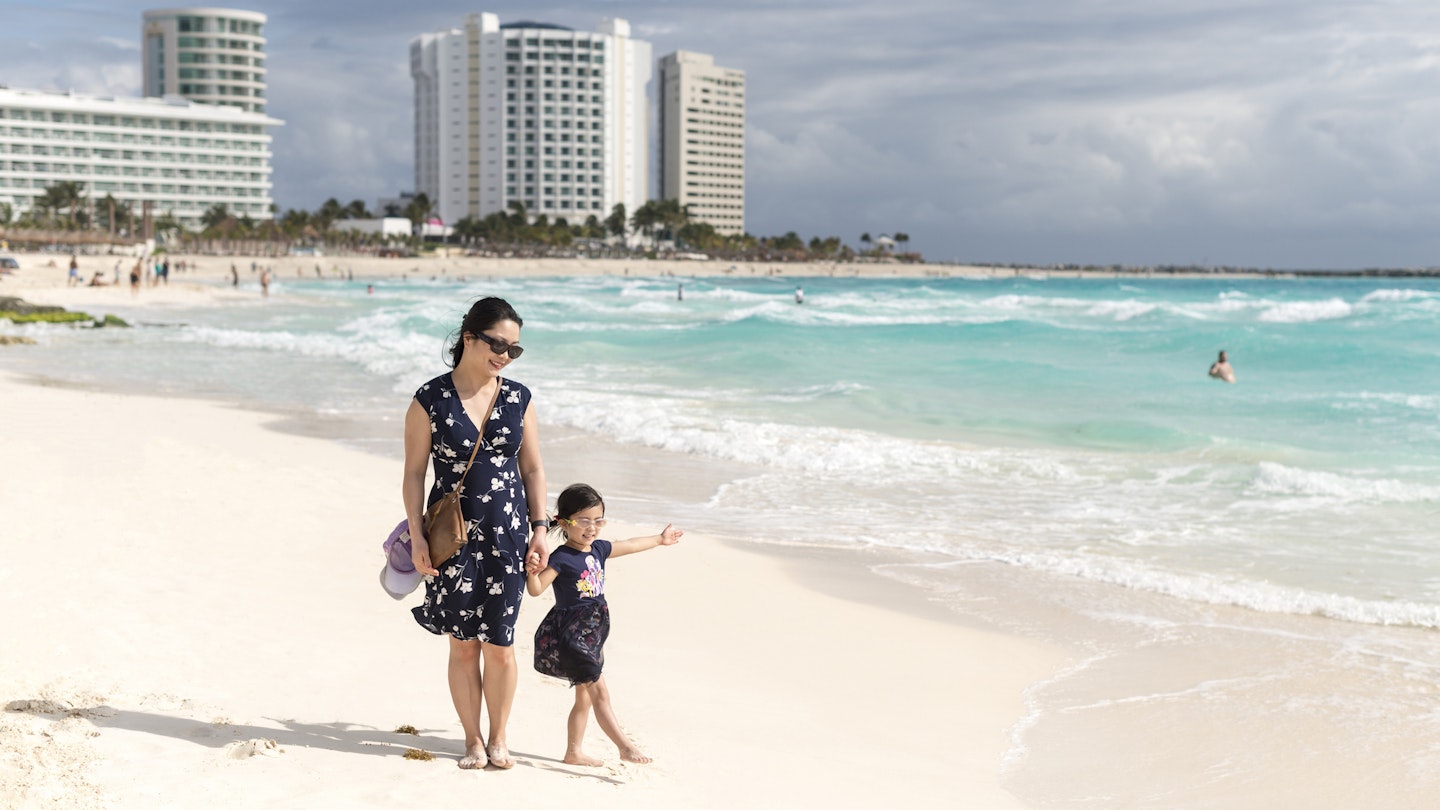
Prepare for your visit to Cancún with our guide to health, safety and etiquette in the Mexican hotspot © Wei Fang / Getty Images
If my frequent travels to Cancún have taught me anything, it's that paradise will throw you a curveball from time to time.
Among the setbacks, I've experienced a costly car break-in, brazen price gouging and a debilitating bout of sickness with dengue fever, an ordeal that still makes my joints ache just thinking about it. But every time I found myself in need of help, the good folks in Cancún have stepped up big-time, and that's no small thing.
While some first-time visitors never leave the touristy, high-gloss hotel zone – which I get, the stunning resort offers pillow-soft Caribbean beaches – you’ll kick yourself later if you overlook the Centro, a bustling downtown.
This is where you can mingle with locals in the neighborhood cantinas and barter at traditional markets. Visit one atmospheric taco joint and you’ll be glad you made the effort.
With that in mind, here are nine essential tips to make your Cancún trip run as smooth as possible.
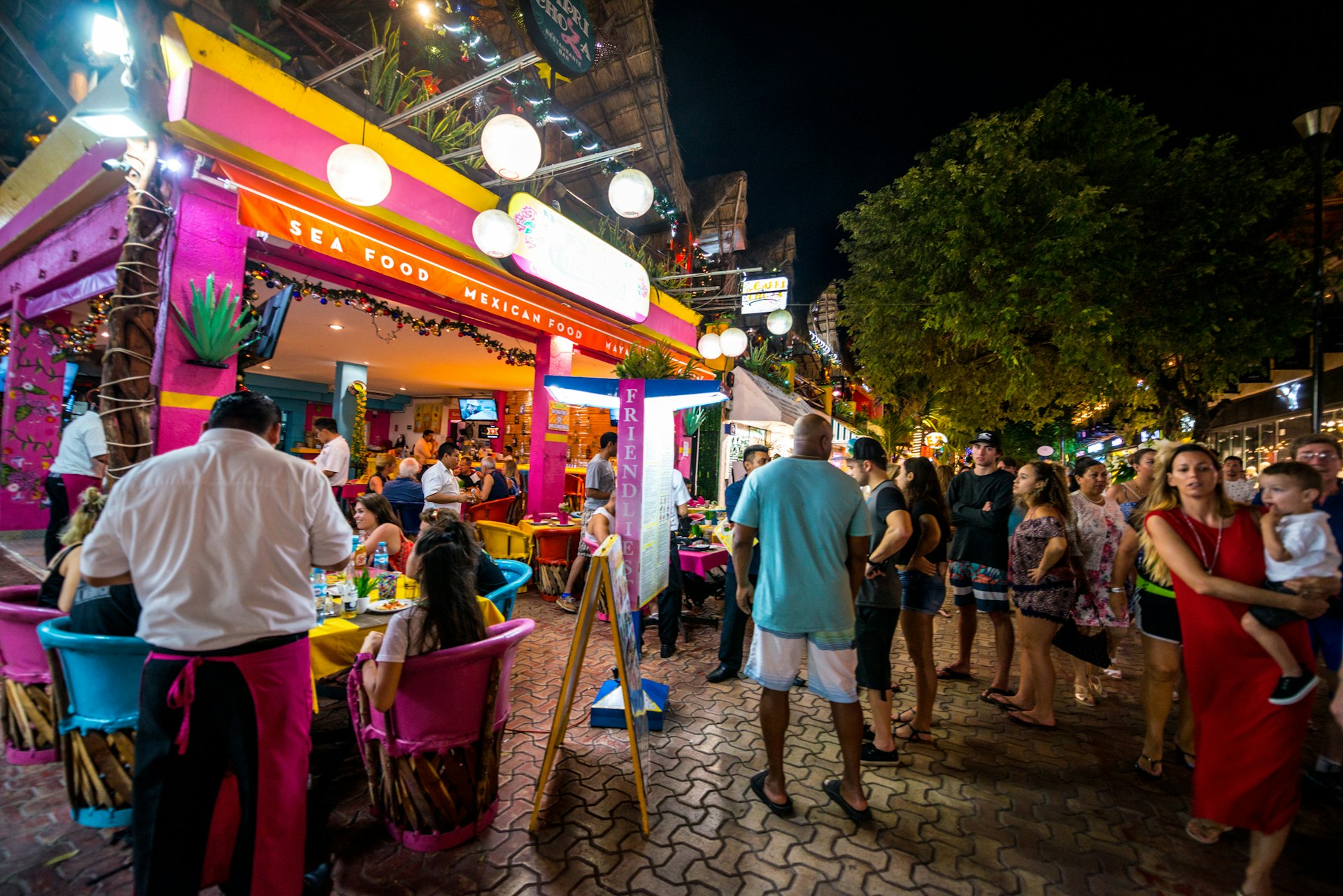
1. Stay alert but don't let the clickbait headlines spook you
Despite all the grim news about Mexico 's drug-related violence, Cancún and the wider Yucatán Peninsula are generally considered safe.
Granted, you should never treat the crime problem lightly, but drug gangs rarely target tourists, especially if you avoid illicit activities.
That said, it's important to keep a close watch on your drink in bars and nightclubs. There have been reports of some tourists getting their drinks spiked with so-called date rape drugs. You should also avoid withdrawing money from ATMs at night, and never carry large amounts of cash.
2. Monitor hurricane season and seaweed surges
Cancún's hurricane season runs from June to November, and over the years the city has seen powerful storms cause devastating damage. Always check the latest weather forecast before you board a plane.
Also, keep a close eye on sargassum seaweed surges ( sargazo in Spanish), which can turn Cancún's turquoise waters brown. These blooms leave mounds of smelly, decomposing macroalgae carpeted across otherwise white sands. An influx of seaweed makes swimming and sunbathing downright unpleasant.
If it happens when you're in Cancún, consider doing less beach time and splash around in hotel pools and cenotes (freshwater sinkholes) instead.
The invasive surges occur intermittently, usually from March to August, but they can be unpredictable. The NGO Red de Monitoreo de Sargazo posts daily updates on beach conditions in Cancún and the nearby Riviera Maya .
3. Tip generously and haggle respectfully
Keep in mind that many Cancún service workers (namely restaurant and hotel employees) depend on tips to supplement miserable wages. In restaurants, leave a 15% gratuity if the service is not already included.
Remember to check the bill carefully, though – some unscrupulous establishments have been known to tack on a "service fee" in the hope that customers unknowingly leave an additional tip.
For airport and hotel porters, tip about M$25 a bag, while for tour guides give an extra 10–20% of the cost of the outing, or perhaps a bit more for full-day excursions. Gas station attendants typically get about M$5 to M$10.
Bartenders, baristas and taxi drivers generally do not expect tips but always welcome them. It's acceptable to haggle with the market and street vendors to a certain degree, but remember that they're just trying to make a living.

4. Don't forget to pack ID, bug spray and casual clothing
To rent a car, you'll need to show a passport, driver's license and credit card. Mexican law requires you to have liability coverage, known in Spanish as daños a terceros .
Citizens from the US, Canada and EU countries, as well as residents from dozens of other nations, do not need visas to enter Mexico as tourists.
To protect yourself from mosquitoes and the sun, pack biodegradable insect repellent, long-sleeve shirts and a pair of pants. You'll definitely need the bug spray when visiting during the muggy wet season from May through October.
Even if you have repellent or sunscreen of the biodegradable variety, do not use them while swimming or snorkeling in fragile ecosystems such as coral reefs and cenotes. Loose-fitting clothes that dry quickly will serve you well for water activities and rainy days.
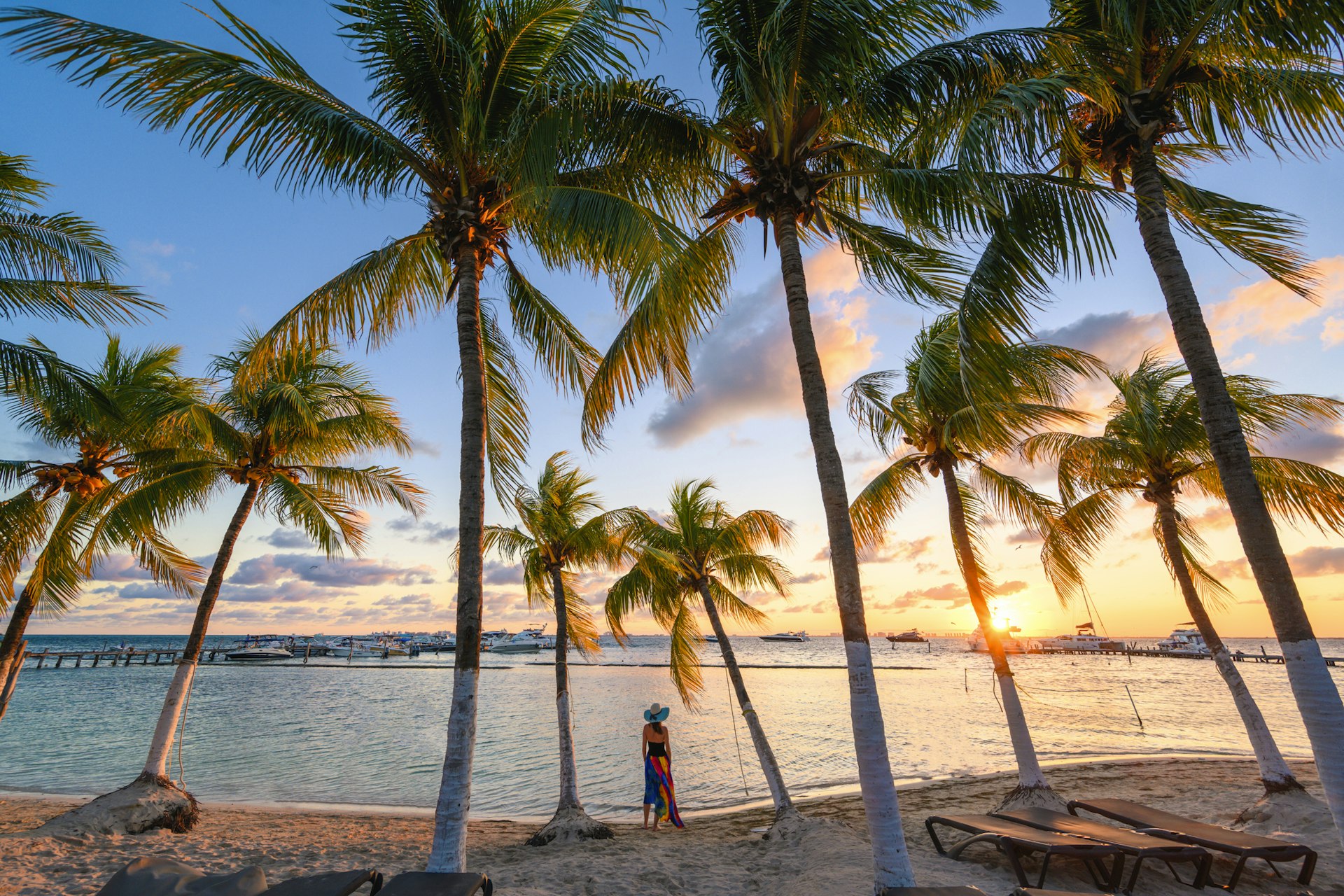
5. Explore the surrounding countryside
You can usually find plenty of things to do in the hotel zone and downtown Cancún but try to squeeze in at least one trip to see a different side of the Yucatán Peninsula. Seven to 10 days should give you ample time to tour Cancún and beyond.
Venture south to check out ancient ruins, jungle-set swimming holes and small fishing towns along the Riviera Maya, or head east on a day trip to Valladolid , a colonial city with a rich Maya history.
Alternatively, the nearby islands of Isla Mujeres and Isla Holbox provide blissful nature escapes for snorkeling, diving and kayaking adventures.
6. Carry cash and bring a credit and/or debit card
Even though most places in Cancún accept major credit cards, it's always useful to carry some cash, especially in the smaller surrounding towns and islands.
Many hotels, and even some restaurants, accept US dollars, but they normally offer an unfavorable currency exchange rate.
The ubiquitous ATMs accept foreign debit cards but expect to get dinged with international transaction fees for withdrawals.
The same goes for many retail purchases as well. Some major credit cards won't charge such fees, giving you the most bang for your buck. Cancún's ATMs dispense Mexican pesos.

7. All-inclusive resorts are great, but you're missing Cancún's food scene
The hotel zone is home to most of Cancún's all-inclusive hotels, though high-end resorts are also cropping up in Punta Sam and along the sublime Isla Blanca peninsula, north of downtown.
The all-inclusive experience ranges from luxurious adults-only setups with above-and-beyond service (personal butlers and all) to slightly more affordable family-friendly accommodations.
If you're looking for a safe, self-contained environment with multiple restaurants, bottomless drinks, easy beach access, alluring outdoor pools, and kid-focused activities, book an all-inclusive.
If you prefer the resort experience without the meals and booze, some places offer room-only rates. This pushes you to get out and dive into Cancún's diverse culinary and nightlife scene. Budget travelers will find more options downtown, where hostels and mid-range digs abound.
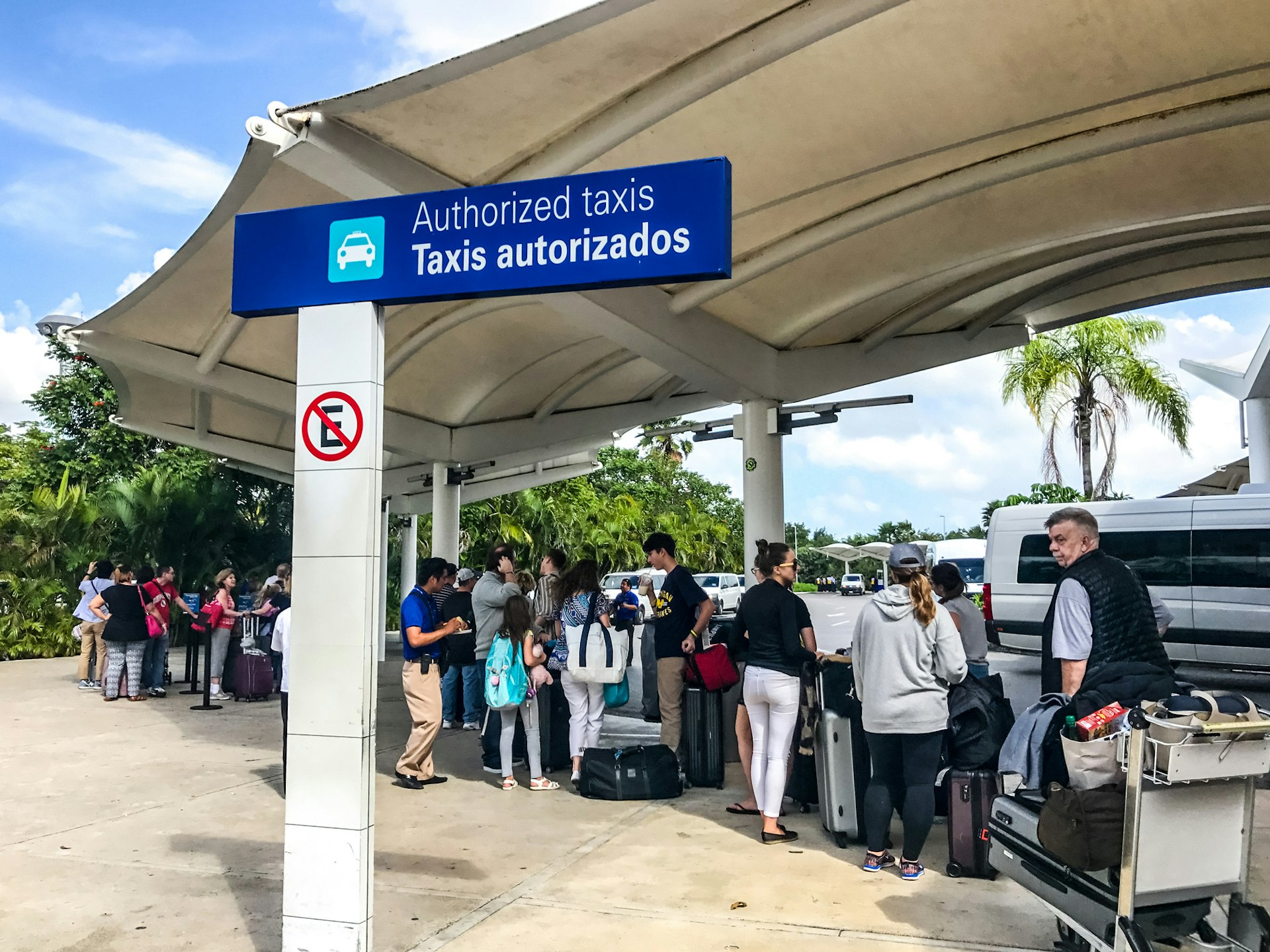
8. Rideshare services are available in Cancún
The app-based transportation service Uber operates in Cancún, but due to a long-running dispute by taxi union members, drivers and their passengers have faced harassment and, in some cases, attacks.
If you decide to use Uber, do so at your own risk. Do not order a car from the airport, bus station, ferry terminals, or other points where rival taxis may be watching.
For the most affordable transportation from the airport, look for the red ADO bus , which runs frequently from the airport terminals to downtown Cancún's first-class bus terminal. However, if you're staying in the hotel zone, you're better off taking a shuttle or cab.
9. Don't drink the water, and try street food with caution
Cancún's tap water is generally not safe to drink unless you know it's filtered (agua filtrada) . The same goes for drinks prepared with ice; when in doubt go without. Bottled or purified (purificada) water is your best bet to stay hydrated, and you'll need plenty of it to avoid heat exhaustion.
Eating street food can be somewhat dicey in Cancún, but it's a tantalizing risk that many visitors are willing to take.
This article was first published October 2023 and updated January 2024
Explore related stories
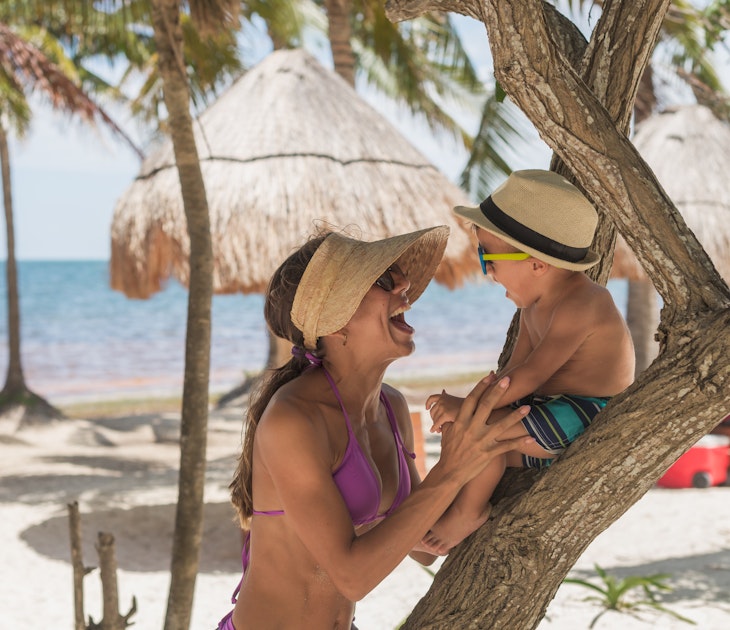
Accessible Travel
Feb 9, 2024 • 6 min read
Whether you want to wander along the beach, explore the shops or go further afield, here's what you need to know about getting around Cancún.

Jan 23, 2024 • 6 min read

Dec 27, 2023 • 8 min read

Oct 13, 2023 • 8 min read

Oct 9, 2023 • 14 min read

Jan 6, 2023 • 6 min read
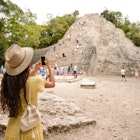
Nov 5, 2022 • 6 min read

Apr 21, 2022 • 7 min read

Apr 1, 2022 • 8 min read
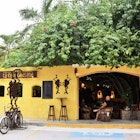
Mar 8, 2022 • 11 min read
We’re sorry, this site is currently experiencing technical difficulties. Please try again in a few moments. Exception: request blocked
Situation in Haiti March 29, 2024
U.s. citizens in haiti, update january 10, 2024, information for u.s. citizens in the middle east.
- Travel Advisories |
- Contact Us |
- MyTravelGov |
Find U.S. Embassies & Consulates
Travel.state.gov, congressional liaison, special issuance agency, u.s. passports, international travel, intercountry adoption, international parental child abduction, records and authentications, popular links, travel advisories, mytravelgov, stay connected, legal resources, legal information, info for u.s. law enforcement, replace or certify documents.
Share this page:
Learn about your destination
Take 90 seconds for safer travel.
Travel Advisory Levels
Enroll in step.

Subscribe to get up-to-date safety and security information and help us reach you in an emergency abroad.
Recommended Web Browsers: Microsoft Edge or Google Chrome.
External Link
You are about to leave travel.state.gov for an external website that is not maintained by the U.S. Department of State.
Links to external websites are provided as a convenience and should not be construed as an endorsement by the U.S. Department of State of the views or products contained therein. If you wish to remain on travel.state.gov, click the "cancel" message.
You are about to visit:
You are using an outdated browser. Upgrade your browser today or install Google Chrome Frame to better experience this site.
Mexico Traveler View
Travel health notices, vaccines and medicines, non-vaccine-preventable diseases, stay healthy and safe.
- Packing List
After Your Trip

Be aware of current health issues in Mexico. Learn how to protect yourself.
Level 1 Practice Usual Precautions
- Dengue in the Americas February 28, 2024 Dengue is a risk in many parts of Central and South America, Mexico, and the Caribbean. Some countries are reporting increased numbers of cases of the disease. Travelers to the Americas can protect themselves by preventing mosquito bites. Destination List: Argentina, Brazil, Colombia, Costa Rica, French Guiana (France), Guadeloupe, Guatemala, Haiti, Jamaica, Martinique (France), Mexico, Nicaragua, Panama, Paraguay, Peru, Saint Barthelemy, Saint Martin, Turks and Caicos Islands (U.K.)
- Rocky Mountain Spotted Fever in Mexico December 11, 2023 There have been reports of Rocky Mountain spotted fever (RMSF) in people traveling to the United States from Tecate, in the state of Baja California, Mexico.
- Salmonella Newport in Mexico September 08, 2022 Some travelers who have spent time in Mexico have been infected with multidrug-resistant (MDR) Salmonella Newport.
⇧ Top
Check the vaccines and medicines list and visit your doctor at least a month before your trip to get vaccines or medicines you may need. If you or your doctor need help finding a location that provides certain vaccines or medicines, visit the Find a Clinic page.
Routine vaccines
Recommendations.
Make sure you are up-to-date on all routine vaccines before every trip. Some of these vaccines include
- Chickenpox (Varicella)
- Diphtheria-Tetanus-Pertussis
- Flu (influenza)
- Measles-Mumps-Rubella (MMR)
Immunization schedules
All eligible travelers should be up to date with their COVID-19 vaccines. Please see Your COVID-19 Vaccination for more information.
COVID-19 vaccine
Hepatitis A
Recommended for unvaccinated travelers one year old or older going to Mexico.
Infants 6 to 11 months old should also be vaccinated against Hepatitis A. The dose does not count toward the routine 2-dose series.
Travelers allergic to a vaccine component or who are younger than 6 months should receive a single dose of immune globulin, which provides effective protection for up to 2 months depending on dosage given.
Unvaccinated travelers who are over 40 years old, immunocompromised, or have chronic medical conditions planning to depart to a risk area in less than 2 weeks should get the initial dose of vaccine and at the same appointment receive immune globulin.
Hepatitis A - CDC Yellow Book
Dosing info - Hep A
Hepatitis B
Recommended for unvaccinated travelers younger than 60 years old traveling to Mexico. Unvaccinated travelers 60 years and older may get vaccinated before traveling to Mexico.
Hepatitis B - CDC Yellow Book
Dosing info - Hep B
CDC recommends that travelers going to certain areas of Mexico take prescription medicine to prevent malaria. Depending on the medicine you take, you will need to start taking this medicine multiple days before your trip, as well as during and after your trip. Talk to your doctor about which malaria medication you should take.
Find country-specific information about malaria.
Malaria - CDC Yellow Book
Considerations when choosing a drug for malaria prophylaxis (CDC Yellow Book)
Malaria information for Mexico.
Cases of measles are on the rise worldwide. Travelers are at risk of measles if they have not been fully vaccinated at least two weeks prior to departure, or have not had measles in the past, and travel internationally to areas where measles is spreading.
All international travelers should be fully vaccinated against measles with the measles-mumps-rubella (MMR) vaccine, including an early dose for infants 6–11 months, according to CDC’s measles vaccination recommendations for international travel .
Measles (Rubeola) - CDC Yellow Book
Rabid dogs are commonly found in Mexico. However, if you are bitten or scratched by a dog or other mammal while in Mexico, rabies treatment is often available.
Consider rabies vaccination before your trip if your activities mean you will be around dogs or wildlife.
Travelers more likely to encounter rabid animals include
- Campers, adventure travelers, or cave explorers (spelunkers)
- Veterinarians, animal handlers, field biologists, or laboratory workers handling animal specimens
- Visitors to rural areas
Since children are more likely to be bitten or scratched by a dog or other animals, consider rabies vaccination for children traveling to Mexico.
Rabies - CDC Yellow Book
Recommended for most travelers, especially those staying with friends or relatives or visiting smaller cities or rural areas.
Typhoid - CDC Yellow Book
Dosing info - Typhoid
Avoid contaminated water
Leptospirosis
How most people get sick (most common modes of transmission)
- Touching urine or other body fluids from an animal infected with leptospirosis
- Swimming or wading in urine-contaminated fresh water, or contact with urine-contaminated mud
- Drinking water or eating food contaminated with animal urine
- Avoid contaminated water and soil
Clinical Guidance
Avoid bug bites, chagas disease (american trypanosomiasis).
- Accidentally rub feces (poop) of the triatomine bug into the bug bite, other breaks in the skin, your eyes, or mouth
- From pregnant woman to her baby, contaminated blood products (transfusions), or contaminated food or drink.
- Avoid Bug Bites
Chagas disease
- Mosquito bite
Leishmaniasis
- Sand fly bite
- An infected pregnant woman can spread it to her unborn baby
Airborne & droplet
Avian/bird flu.
- Being around, touching, or working with infected poultry, such as visiting poultry farms or live-animal markets
- Avoid domestic and wild poultry
- Breathing in air or accidentally eating food contaminated with the urine, droppings, or saliva of infected rodents
- Bite from an infected rodent
- Less commonly, being around someone sick with hantavirus (only occurs with Andes virus)
- Avoid rodents and areas where they live
- Avoid sick people
Tuberculosis (TB)
- Breathe in TB bacteria that is in the air from an infected and contagious person coughing, speaking, or singing.
Learn actions you can take to stay healthy and safe on your trip. Vaccines cannot protect you from many diseases in Mexico, so your behaviors are important.
Eat and drink safely
Food and water standards around the world vary based on the destination. Standards may also differ within a country and risk may change depending on activity type (e.g., hiking versus business trip). You can learn more about safe food and drink choices when traveling by accessing the resources below.
- Choose Safe Food and Drinks When Traveling
- Water Treatment Options When Hiking, Camping or Traveling
- Global Water, Sanitation and Hygiene | Healthy Water
- Avoid Contaminated Water During Travel
You can also visit the Department of State Country Information Pages for additional information about food and water safety.
Prevent bug bites
Bugs (like mosquitoes, ticks, and fleas) can spread a number of diseases in Mexico. Many of these diseases cannot be prevented with a vaccine or medicine. You can reduce your risk by taking steps to prevent bug bites.
What can I do to prevent bug bites?
- Cover exposed skin by wearing long-sleeved shirts, long pants, and hats.
- Use an appropriate insect repellent (see below).
- Use permethrin-treated clothing and gear (such as boots, pants, socks, and tents). Do not use permethrin directly on skin.
- Stay and sleep in air-conditioned or screened rooms.
- Use a bed net if the area where you are sleeping is exposed to the outdoors.
What type of insect repellent should I use?
- FOR PROTECTION AGAINST TICKS AND MOSQUITOES: Use a repellent that contains 20% or more DEET for protection that lasts up to several hours.
- Picaridin (also known as KBR 3023, Bayrepel, and icaridin)
- Oil of lemon eucalyptus (OLE) or para-menthane-diol (PMD)
- 2-undecanone
- Always use insect repellent as directed.
What should I do if I am bitten by bugs?
- Avoid scratching bug bites, and apply hydrocortisone cream or calamine lotion to reduce the itching.
- Check your entire body for ticks after outdoor activity. Be sure to remove ticks properly.
What can I do to avoid bed bugs?
Although bed bugs do not carry disease, they are an annoyance. See our information page about avoiding bug bites for some easy tips to avoid them. For more information on bed bugs, see Bed Bugs .
For more detailed information on avoiding bug bites, see Avoid Bug Bites .
Some diseases in Mexico—such as dengue, Zika, leishmaniasis, and Chagas disease—are spread by bugs and cannot be prevented with a vaccine. Follow the insect avoidance measures described above to prevent these and other illnesses.
Stay safe outdoors
If your travel plans in Mexico include outdoor activities, take these steps to stay safe and healthy during your trip.
- Stay alert to changing weather conditions and adjust your plans if conditions become unsafe.
- Prepare for activities by wearing the right clothes and packing protective items, such as bug spray, sunscreen, and a basic first aid kit.
- Consider learning basic first aid and CPR before travel. Bring a travel health kit with items appropriate for your activities.
- If you are outside for many hours in heat, eat salty snacks and drink water to stay hydrated and replace salt lost through sweating.
- Protect yourself from UV radiation : use sunscreen with an SPF of at least 15, wear protective clothing, and seek shade during the hottest time of day (10 a.m.–4 p.m.).
- Be especially careful during summer months and at high elevation. Because sunlight reflects off snow, sand, and water, sun exposure may be increased during activities like skiing, swimming, and sailing.
- Very cold temperatures can be dangerous. Dress in layers and cover heads, hands, and feet properly if you are visiting a cold location.
Stay safe around water
- Swim only in designated swimming areas. Obey lifeguards and warning flags on beaches.
- Practice safe boating—follow all boating safety laws, do not drink alcohol if driving a boat, and always wear a life jacket.
- Do not dive into shallow water.
- Do not swim in freshwater in developing areas or where sanitation is poor.
- Avoid swallowing water when swimming. Untreated water can carry germs that make you sick.
- To prevent infections, wear shoes on beaches where there may be animal waste.
Leptospirosis, a bacterial infection that can be spread in fresh water, is found in Mexico. Avoid swimming in fresh, unchlorinated water, such as lakes, ponds, or rivers.
Keep away from animals
Most animals avoid people, but they may attack if they feel threatened, are protecting their young or territory, or if they are injured or ill. Animal bites and scratches can lead to serious diseases such as rabies.
Follow these tips to protect yourself:
- Do not touch or feed any animals you do not know.
- Do not allow animals to lick open wounds, and do not get animal saliva in your eyes or mouth.
- Avoid rodents and their urine and feces.
- Traveling pets should be supervised closely and not allowed to come in contact with local animals.
- If you wake in a room with a bat, seek medical care immediately. Bat bites may be hard to see.
All animals can pose a threat, but be extra careful around dogs, bats, monkeys, sea animals such as jellyfish, and snakes. If you are bitten or scratched by an animal, immediately:
- Wash the wound with soap and clean water.
- Go to a doctor right away.
- Tell your doctor about your injury when you get back to the United States.
Consider buying medical evacuation insurance. Rabies is a deadly disease that must be treated quickly, and treatment may not be available in some countries.
Reduce your exposure to germs
Follow these tips to avoid getting sick or spreading illness to others while traveling:
- Wash your hands often, especially before eating.
- If soap and water aren’t available, clean hands with hand sanitizer (containing at least 60% alcohol).
- Don’t touch your eyes, nose, or mouth. If you need to touch your face, make sure your hands are clean.
- Cover your mouth and nose with a tissue or your sleeve (not your hands) when coughing or sneezing.
- Try to avoid contact with people who are sick.
- If you are sick, stay home or in your hotel room, unless you need medical care.
Avoid sharing body fluids
Diseases can be spread through body fluids, such as saliva, blood, vomit, and semen.
Protect yourself:
- Use latex condoms correctly.
- Do not inject drugs.
- Limit alcohol consumption. People take more risks when intoxicated.
- Do not share needles or any devices that can break the skin. That includes needles for tattoos, piercings, and acupuncture.
- If you receive medical or dental care, make sure the equipment is disinfected or sanitized.
Know how to get medical care while traveling
Plan for how you will get health care during your trip, should the need arise:
- Carry a list of local doctors and hospitals at your destination.
- Review your health insurance plan to determine what medical services it would cover during your trip. Consider purchasing travel health and medical evacuation insurance.
- Carry a card that identifies, in the local language, your blood type, chronic conditions or serious allergies, and the generic names of any medications you take.
- Some prescription drugs may be illegal in other countries. Call Mexico’s embassy to verify that all of your prescription(s) are legal to bring with you.
- Bring all the medicines (including over-the-counter medicines) you think you might need during your trip, including extra in case of travel delays. Ask your doctor to help you get prescriptions filled early if you need to.
Many foreign hospitals and clinics are accredited by the Joint Commission International. A list of accredited facilities is available at their website ( www.jointcommissioninternational.org ).
In some countries, medicine (prescription and over-the-counter) may be substandard or counterfeit. Bring the medicines you will need from the United States to avoid having to buy them at your destination.
Malaria is a risk in some parts of Mexico. If you are going to a risk area, fill your malaria prescription before you leave, and take enough with you for the entire length of your trip. Follow your doctor’s instructions for taking the pills; some need to be started before you leave.
Select safe transportation
Motor vehicle crashes are the #1 killer of healthy US citizens in foreign countries.
In many places cars, buses, large trucks, rickshaws, bikes, people on foot, and even animals share the same lanes of traffic, increasing the risk for crashes.
Be smart when you are traveling on foot.
- Use sidewalks and marked crosswalks.
- Pay attention to the traffic around you, especially in crowded areas.
- Remember, people on foot do not always have the right of way in other countries.
Riding/Driving
Choose a safe vehicle.
- Choose official taxis or public transportation, such as trains and buses.
- Ride only in cars that have seatbelts.
- Avoid overcrowded, overloaded, top-heavy buses and minivans.
- Avoid riding on motorcycles or motorbikes, especially motorbike taxis. (Many crashes are caused by inexperienced motorbike drivers.)
- Choose newer vehicles—they may have more safety features, such as airbags, and be more reliable.
- Choose larger vehicles, which may provide more protection in crashes.
Think about the driver.
- Do not drive after drinking alcohol or ride with someone who has been drinking.
- Consider hiring a licensed, trained driver familiar with the area.
- Arrange payment before departing.
Follow basic safety tips.
- Wear a seatbelt at all times.
- Sit in the back seat of cars and taxis.
- When on motorbikes or bicycles, always wear a helmet. (Bring a helmet from home, if needed.)
- Avoid driving at night; street lighting in certain parts of Mexico may be poor.
- Do not use a cell phone or text while driving (illegal in many countries).
- Travel during daylight hours only, especially in rural areas.
- If you choose to drive a vehicle in Mexico, learn the local traffic laws and have the proper paperwork.
- Get any driving permits and insurance you may need. Get an International Driving Permit (IDP). Carry the IDP and a US-issued driver's license at all times.
- Check with your auto insurance policy's international coverage, and get more coverage if needed. Make sure you have liability insurance.
- Avoid using local, unscheduled aircraft.
- If possible, fly on larger planes (more than 30 seats); larger airplanes are more likely to have regular safety inspections.
- Try to schedule flights during daylight hours and in good weather.
Medical Evacuation Insurance
If you are seriously injured, emergency care may not be available or may not meet US standards. Trauma care centers are uncommon outside urban areas. Having medical evacuation insurance can be helpful for these reasons.
Helpful Resources
Road Safety Overseas (Information from the US Department of State): Includes tips on driving in other countries, International Driving Permits, auto insurance, and other resources.
The Association for International Road Travel has country-specific Road Travel Reports available for most countries for a minimal fee.
For information traffic safety and road conditions in Mexico, see Travel and Transportation on US Department of State's country-specific information for Mexico .
Maintain personal security
Use the same common sense traveling overseas that you would at home, and always stay alert and aware of your surroundings.
Before you leave
- Research your destination(s), including local laws, customs, and culture.
- Monitor travel advisories and alerts and read travel tips from the US Department of State.
- Enroll in the Smart Traveler Enrollment Program (STEP) .
- Leave a copy of your itinerary, contact information, credit cards, and passport with someone at home.
- Pack as light as possible, and leave at home any item you could not replace.
While at your destination(s)
- Carry contact information for the nearest US embassy or consulate .
- Carry a photocopy of your passport and entry stamp; leave the actual passport securely in your hotel.
- Follow all local laws and social customs.
- Do not wear expensive clothing or jewelry.
- Always keep hotel doors locked, and store valuables in secure areas.
- If possible, choose hotel rooms between the 2nd and 6th floors.
To call for emergency services while in Mexico, dial 066, 060, or 080. Write these numbers down to carry with you during your trip.
Learn as much as you can about Mexico before you travel there. A good place to start is the country-specific information on Mexico from the US Department of State.
Americans in Mexico have been arrested for purchasing souvenirs that were, or looked like, antiques and that local customs authorities believed were national treasures. Familiarize yourself with any local regulations for antiques and follow these tips:
- When you are considering purchasing an authentic antique or a reproduction, ask if you are allowed to export these items before you purchase them.
- If you buy a reproduction, document on the customs form that it is a reproduction.
- If you buy an authentic antique, obtain the necessary export permit (often from the national museum).
Healthy Travel Packing List
Use the Healthy Travel Packing List for Mexico for a list of health-related items to consider packing for your trip. Talk to your doctor about which items are most important for you.
Why does CDC recommend packing these health-related items?
It’s best to be prepared to prevent and treat common illnesses and injuries. Some supplies and medicines may be difficult to find at your destination, may have different names, or may have different ingredients than what you normally use.
If you are not feeling well after your trip, you may need to see a doctor. If you need help finding a travel medicine specialist, see Find a Clinic . Be sure to tell your doctor about your travel, including where you went and what you did on your trip. Also tell your doctor if you were bitten or scratched by an animal while traveling.
If your doctor prescribed antimalarial medicine for your trip, keep taking the rest of your pills after you return home. If you stop taking your medicine too soon, you could still get sick.
Malaria is always a serious disease and may be a deadly illness. If you become ill with a fever either while traveling in a malaria-risk area or after you return home (for up to 1 year), you should seek immediate medical attention and should tell the doctor about your travel history.
For more information on what to do if you are sick after your trip, see Getting Sick after Travel .
Map Disclaimer - The boundaries and names shown and the designations used on maps do not imply the expression of any opinion whatsoever on the part of the Centers for Disease Control and Prevention concerning the legal status of any country, territory, city or area or of its authorities, or concerning the delimitation of its frontiers or boundaries. Approximate border lines for which there may not yet be full agreement are generally marked.
Other Destinations
If you need help finding travel information:
Message & data rates may apply. CDC Privacy Policy
File Formats Help:
- Adobe PDF file
- Microsoft PowerPoint file
- Microsoft Word file
- Microsoft Excel file
- Audio/Video file
- Apple Quicktime file
- RealPlayer file
- Zip Archive file

Exit Notification / Disclaimer Policy
- The Centers for Disease Control and Prevention (CDC) cannot attest to the accuracy of a non-federal website.
- Linking to a non-federal website does not constitute an endorsement by CDC or any of its employees of the sponsors or the information and products presented on the website.
- You will be subject to the destination website's privacy policy when you follow the link.
- CDC is not responsible for Section 508 compliance (accessibility) on other federal or private website.

2300 Security Forces Sent To Cancun For The Protection Of Tourists
Post may contain affiliate links; we may receive compensation if you click links to those products. This has no impact on how offers are presented. Our site does not include all offers available. Content on page accurate as of posting date.
Cancun is the number one destination not only in Mexico but in Latin America , and needless to say, when it comes to visitors' safety, local authorities take no chances.
They have consistently kept crime low in the resort city despite recent travel alerts .
Safety continues to be a concern for some Americans heading south of the border, but if the latest update from authorities is anything to go by, they'll probably be safer in the Caribbean hotspot than they are back home in the States, as Mexican President once stated himself.
Though Cancun is already well-guarded, a more robust security force is being brought in to help keep guests safe.
Not a few dozen, nor a couple hundred, but a whopping 2,300 officers .
A Record Number Of Officers Deployed To Cancun To Keep Tourists Safe
According to local authorities, as Cancun braces for yet another surge in tourist numbers, the Secretariat of Citizen Security will maintain a security force of 2,395 officers for the time being, distributed around key areas in the state of Quintana Roo.
Other than the Citizen Security service, the Secretariat of National Defense, the Secretariat of the Navy, the ‘Green Angels', and the National Guard are also participating in the new large-scale operation.
As the largest city in the state and its main tourist destination, Cancun is set to benefit the most from the ramp-up , especially as it heads into the summer period when bookings increase significantly as Americans contemplate their next sunny getaway abroad.
Police officers, marine guards, and big guns are no strange sight in Cancun, even on beaches, where patrolling has intensified year after year to keep zones frequented by tourists crime-free, and as unsettling a sight as they may be at times, it works.
For years now, Cancun has retained its Level 2 status, according to the U.S. State Department.
This means it is one of the safest resort cities in Mexico, where crime still exists, but remains ‘ moderate ‘, instead of somewhere Americans should avoid going altogether.
You may wonder, then, why over 2,300 officers are needed if Cancun is so safe and why they're being deployed now.
Why Is Security Being Added To Cancun?
While specifics have not been given as to why such police numbers are increasing this significantly, it may have something to do with the ongoing scrutiny Mexico faces from U.S. authorities, who are tougher on their southern neighbor than any other international destination .
Mexico is the only country to which Washington assigns safety levels based on states individually, as opposed to the entire territory, resulting in some parts of Mexico being classed as safe, such as Quintana Roo, and others not so safe, like Jalisco or Sinaloa.
This scrutiny has led to some criticism on Mexico's part numerous times, as they feel the advisories are sometimes harsher than warranted, but there's no denying it's helped American travelers better understand safety risks when visiting different states in their favorite holiday destination.
A couple of weeks ago, the U.S. issued one of its infamous alerts pointing to potential safety risks Americans are exposed to vacationing in Cancun, including violent crime (however sporadic it may be), petty theft, and scamming.
That being said, there's not been a single noteworthy incident involving American visitors in several months, if not years, excluding rare occasions where U.S. citizens involved in drug trafficking are targeted: once again, they're involved in crime.
Cancun Is Extremely Safe Already
As the State Department's advice for Cancun (and Quintana Roo) states, there's currently no warning against travel to the region, and Americans should simply exercise greater caution when visiting, mostly due to pickpocketing and other forms of non-violent crime .
In general, if you're staying in the Hotel Zone, where all of the most famous resorts, best-frequented beaches, and entertainment zones are centered, you have little, if anything, to worry about, as the so-dubbed Tourism Batallion is known to surveil these sites thoroughly.
Similarly, the latest force will provide permanent surveillance not only by land but also by sea and air, guaranteeing tourists are unharmed during their visit to the Mexican Caribbean, from hotel areas to beaches to cenotes to bus terminals to ferry terminals to bar districts.
Naturally, when walking the streets of Cancun, use common sense : don't flash valuable items in public, keep large amounts of money you may have in a safe at your hotel, and don't explore untouristy peripheral barrios by yourself.
Cancun is pretty safe , but it's best not to push it as crime can occur, as in any big city, including in the U.S.
However, with the latest security boost, it will likely feel even safer.
Vinicius Costa
Vini, our senior lead writer at Travel Off Path, has over 60+ countries under his belt (and currently weaving tales from Paris!), and a knack for turning off-the-beaten-path experiences into informative stories that will have you packing your bags.
↓ Join Our Community ↓
The Travel Off Path Community FB group has all the latest travel news, conversations, and Q&A's happening daily!
SUBSCRIBE TO OUR LATEST POSTS
Enter your email address to subscribe to Travel Off Path's latest breaking travel news, straight to your inbox.
This article originally appeared on TravelOffPath.com
Opinions expressed here are the author's alone, not those of any bank, credit card issuer, hotel, airline, or other entity. This content has not been reviewed, approved or otherwise endorsed by any of the entities included within the post.
The post 2300 Security Forces Sent To Cancun For The Protection Of Tourists appeared first on Travel Off Path .
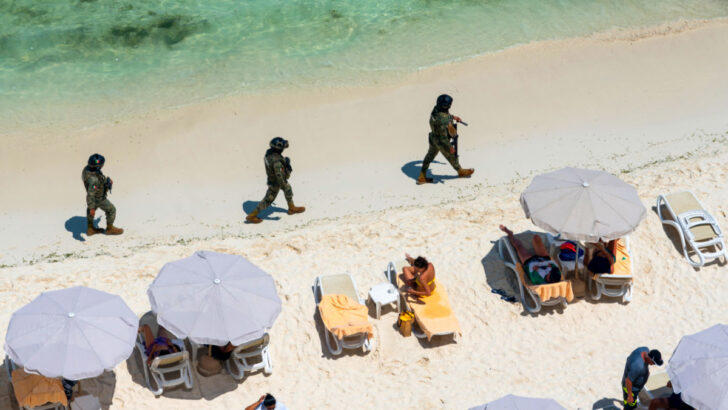

Is Cancun Safe for Travel in 2024? What Every Traveler Should Know
Sharing is caring!
As we move into 2024 and people are planning their holiday and NYE travel, the question remains: is Cancun safe, and how safe will your family be if you decide Cancun will be your holiday destination?
This is the million-dollar question, as Cancun is the top destination for many U.S. travelers, but violent crime is soaring in certain areas because tourists are buying drugs from Mexican drug dealers.
While Cancun is a popular tourist destination with heavily patrolled areas and resorts, there are instances of petty crime like pickpocketing and scams, but I personally have never felt unsafe in Cancun.
For years, I wouldn’t travel to Mexico because the U.S. media painted this horrific picture of Mexico, and I always wondered if Cancun is safe to travel.
I believed Mexico was dangerous; I would be killed, kidnapped, and held for ransom by the cartel because of both the Cancun Travel Advisory and the Mexico Travel Advisory that the U.S. Government issued.
If Mexico was all that dangerous, people indeed wouldn’t keep returning year after year to a dangerous country, now would they?
Yes, Cancun is Safe. To address safety concerns, it’s crucial to start with crime statistics.
Recent data paints a nuanced picture of Cancun’s safety landscape. Like many tourist destinations, Cancun experiences crime, but understanding the specifics is key.
The overall crime rate in Cancun has shown fluctuations, with local authorities implementing measures to address safety concerns.
The links in this post may be affiliate links. That means that if you click them and make a purchase, this site makes a commission. It will have no impact on the price you pay or the experience of your purchase.
View my Google Webstory on Cancun Safety.
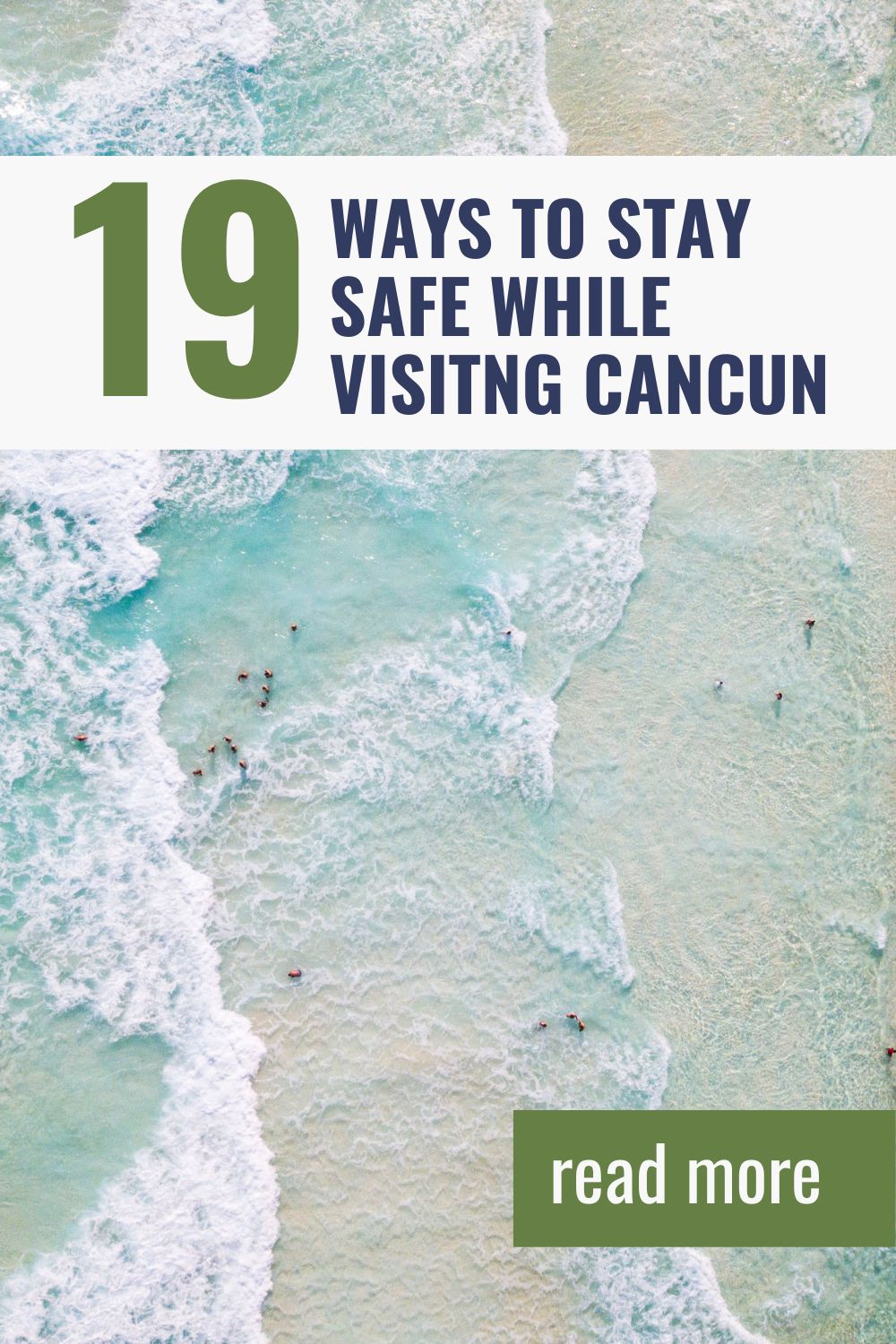
Is Cancun Safe Right Now?
Cancun is located in the State of Quintana Roo, which also includes Playa Del Carmen, Tulum, Cozumel, and the Riviera Maya. It is not far from Puerto Vallarta and Isla Mujeres.
These areas bring in a lot of dollars into Mexico, which is undoubtedly one of the safer areas in Mexico, especially if you compare it to other states in the country.
According to the US State Department, Cancun is a welcoming community and stands out as one of Mexico’s safest regions, characterized by its minimal crime rates.
While many people worry about cartels or criminals preying on tourists in areas like Cancun or Mazatlan, there are much more common risks for travelers, like not using your common sense and buying drugs in a foreign country.
If you can’t spend the weekend in another country without smoking weed, you should probably be checking yourself into rehab instead of traveling to Cancun.
Most of the tourists that have been killed in Mexico are due to them buying drugs from the cartel because they were too afraid to fly with weed , so someone thought it was a good idea to buy drugs in a foreign country.
Short Summary:
- Cancun is generally safe for travelers, but taking necessary precautions is essential.
- Consider checking government website travel alerts for updated information on safety in Cancun.
- Follow safety tips, such as avoiding walking alone at night and staying in well-known establishments.
- Familiarize yourself with local laws to ensure a smooth and trouble-free experience.
- Opt for reputable transportation services, and be cautious about your surroundings.
- Choose filtered water to stay hydrated and healthy during your travels in Cancun.
Mexico Travel Advisory
For the latest Cancun Travel Advisory and Warnings, visit the US State Department’s Website. Right now, the State Department website warns that ” Violent crime – such as homicide, kidnapping, carjacking, and robbery – is widespread in Mexico.” However, when you read further, it states, “Exercise Normal Precautions When Traveling To Cancun.
Latest update
As of August 23, 2023, the US State Department updated their Mexico travel warnings for Quintana Roo, which is home to Cancun, Playa del Carmen, and Tulum. It removed the warning about an increased risk of kidnapping but it is still under a level 2 advisory.
There’s still a high rate of violent crime in Mexico, especially after dark. Kidnapping and extortion are serious risks.
Level 1: Exercise Normal Precautions
Level 2: Excercise Increased Caution
Level 3: Reconsider Travel
Level 4: Do Not Travel
Mexican Military & Police Called In To Help Protect Tourists In Cancun
The deployment of the Mexican military to safeguard tourists in Cancun has been a crucial measure to ensure the safety and enjoyment of travelers visiting this popular destination.
Cancun’s stunning beaches and vibrant nightlife make it a magnet for tourists from around the world, but it also faces security challenges.
With the Mexican military’s presence, tourists can feel reassured, knowing that dedicated personnel are committed to maintaining a safe environment.
These troops work in collaboration with local law enforcement agencies to deter criminal activity, such as drug-related violence and theft, and to provide a sense of security to visitors.
Their presence not only protects tourists but also supports the local economy by maintaining Cancun’s status as a premier vacation spot.
How is The Mexican Government Keeping Cancun Safe?
The Mexican government employs a multi-faceted approach to ensure the safety of Cancun’s residents and visitors.
Law enforcement agencies work diligently to maintain a strong presence throughout the city, regularly patrolling popular tourist areas and collaborating with local businesses to enhance security measures.
Specialized tourist police units are dedicated to assisting and safeguarding visitors, providing a reassuring presence for international travelers.
Additionally, investment in modern surveillance technologies and communication systems aids in swiftly monitoring and responding to incidents.
Community policing initiatives foster a sense of trust and cooperation within the local community, while public awareness campaigns educate tourists about safety measures.
By adopting these comprehensive strategies and continuously addressing security concerns, the Mexican government is committed to preserving Cancun as a safe and inviting destination for all.
Cancun Travel Advisory Fact vs. Fiction
There are more than 40,000 police officers stationed throughout all of Quintana Roo which means Cancun’s safety is important to the country.
If you get up and go to the grocery store every day, run at your local park, or even go to a concert, you should always take precautions no matter the destination.
Are you worried about traveling to Chattanooga, Houston, Chicago, New Orleans, or Memphis? All of these cities have a higher crime rate than Cancun.
The Mexican Tourism Authority and the government want you safe because tourism is Mexico’s number 1 revenue generator and they have pointed to the low number of victims of crime compared to the 28 million American tourists who travel to Mexico each year.
Know that Cancun is safe and keep these numbers in mind when planning your vacation for spring break and summer travels for 2024.
As I stated earlier, Cancun is safer than most of America’s biggest cities. If you are not worried about traveling within the U.S., especially with the current racial tensions, you should be asking if Cancun is safe.
You take road trips with the family to cities like St. Louis, New Orleans, and Kansas City without giving it a second thought, so do not allow the media to make you believe Mexico is unsafe.
Cancun Crime vs. United States Crime
Mexico is statistically much safer than the United States.
So why is the U.S. State Dept. sending out Travel Alerts, calling Mexico “A Failed State”, and saying that ALL parts of the country (including popular tourist resorts like Puerto Vallarta and Cancun) are now unsafe for travel?
They also fail to mention that most of that violence is drug traffic-related or that you could count the number of tourists who are affected by it on the one hand.
Did you know that, according to the FBI , an estimated 15,241 persons were murdered in the U.S. in 2009 111 U.S. citizens were killed in Mexico last year, and almost all of them were involved in illicit drug trafficking, gun-running, or smuggling people across the border to/from the U.S?
Imagine 111 people out of the nearly 8 million visitors (about 1 million of whom make Mexico their full-time home). Do you know who else had 111 murders in one year?
Well, Boston for starters. Then there was Las Vegas. And Orlando. And Indianapolis. Is the State Dept. advising tourists to stay away from those places?
Statistically speaking, U.S. travelers are safer in Cancun than they are in most U.S. cities, despite media sensationalism.
Cancun currently has a crime index of 55.82. When you look at the crime rate in Memphis, Cancun is much lower than the rating of 76.27. See the comparison here.
How to Deal with Police Extortion in Cancun
We’ve all heard the stories about the corrupt cops south of the border. With stories ranging from extortion to kidnapping, the police in Mexico and the rest of Latin America do not have the best reputation.
Police extortion of tourists detained for minor offenses is often a problem, and there have been some grotesque incidents.
However, the authorities cracked down hard and dismissed hundreds of officers, including some top officials. They claim the problem is under control.
If you are stopped for a traffic violation in Mexico, you will be asked for your driver’s license, vehicle registration, and proof of insurance . You will also be told what you did wrong.
Of course, in the U.S., we would then be issued a ticket requiring us to pay a fine or appear in court later.
If it is a minor infraction, don’t bribe them; even so, they may ask for some money; the amount depends on the seriousness of the infraction; if you pass a red light, it is better if they only give you the traffic ticket,
If you drive without a license, the car must be impounded and the fine is higher; in that case, I suggest you offer 200 pesos (if you look Mexican) if you are blond with blue eyes, maybe about 500 pesos.
If you drink alcohol in the street, the fine is 1500 pesos or 24 hours of jail; you will probably have to pay your full fine.
Those are the most common crimes a police officer can pull you over;, if you steal or kill, the amount will be considerably higher.
The key is to remain calm and accept your mistake, and when it is inevitable that they take you to jail, then subtly offer the bribe, it is like a negotiation: start with a low amount, and they will go up to agree on an amount.
Cancun’s safety has been in the spotlight lately due to a few incidents, but rest assured, the Mexican government is stepping up to keep everyone safe.
Good news—according to the US State Department, the Yucatan Peninsula (where Cancun is) is the safest spot in Mexico for Americans this year.
Remember, though, that there’s an “exercise increased caution” advisory for Quintana Roo, where Cancun is located. Stay aware and enjoy your trip!
Is the Hotel Zone Safe in Cancun
The Hotel Zone in Cancun is generally a haven for sun-seekers!
Crime rates in the Hotel Zone are lower than in many major U.S. cities. The local authorities and tourist police keep a vigilant watch, and hotels often have security measures in place.
Still, like anywhere else, it’s wise to keep an eye on your belongings, avoid wandering into dimly lit areas at night (unless you’re on a stargazing mission), and maybe limit your tequila intake to a reasonable level.
So, while Cancun’s Hotel Zone is mostly about sipping margaritas and catching waves, stay sun-kissed, not sun-missed, by staying aware and soaking up the fun responsibly.
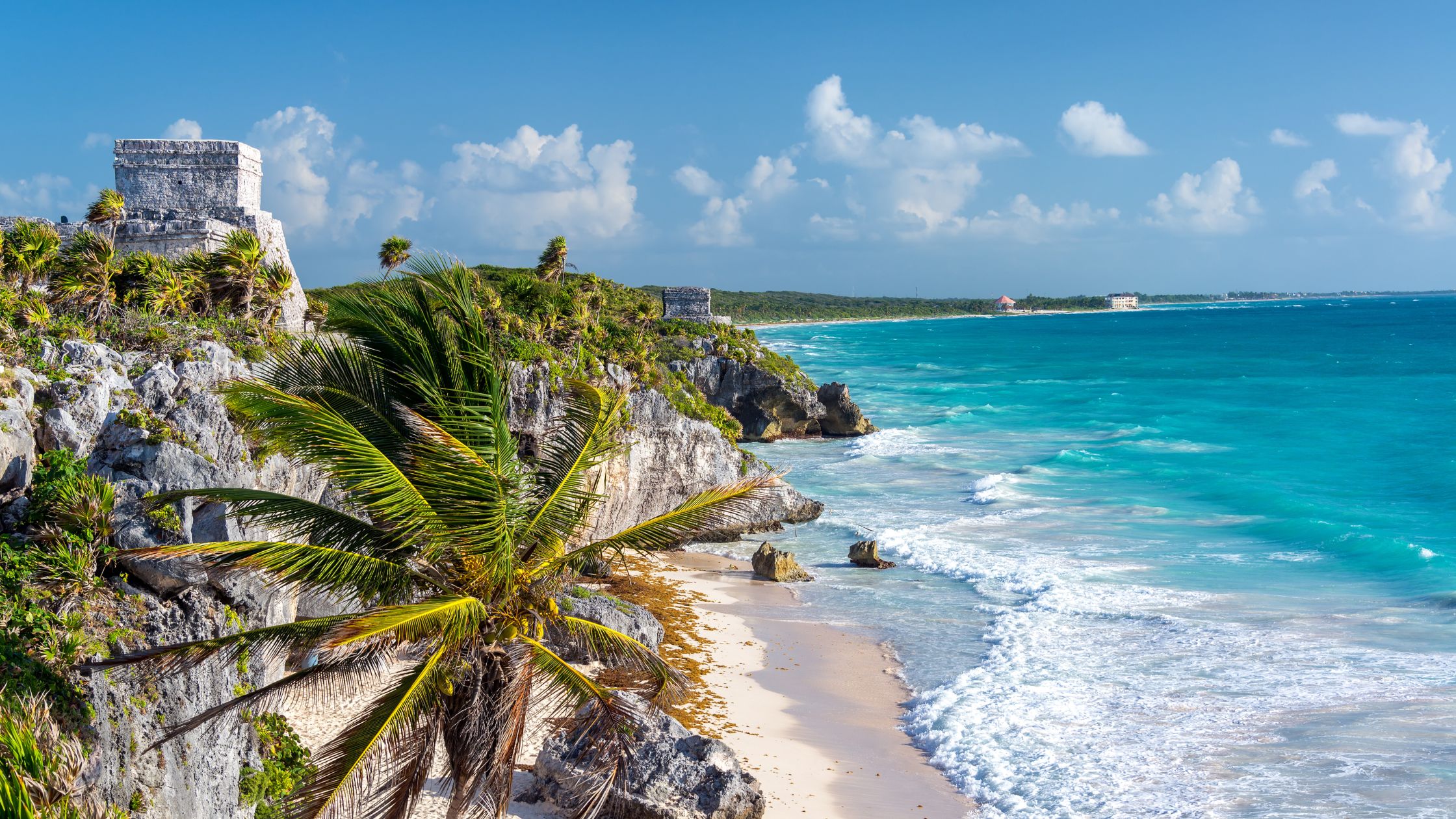
Transportation Safety in Cancun
As I stated earlier, taxis in Cancun can generally be considered safe. Still, please understand that if you get into an unauthorized taxi and they attempt to rip you off because of a broken meter or some other nonsense, it will be tough not to become a victim.
Here are some tips to keep in mind when using taxis in Cancun:
- Use Official Taxis : Opt for official taxis from reputable companies whenever possible. These taxis are usually well-maintained and regulated by authorities, which can enhance your safety.
- Authorized Taxi Stands : Use designated taxi stands, such as those at airports, hotels, and popular tourist areas. Avoid hailing taxis from the street, as this can sometimes lead to encountering unlicensed or unregulated drivers.
- Negotiate Fare or Use Meters : If the taxi doesn’t have a meter, agree on the fare before starting the ride. In taxis with meters, ensure the meter is running and insist on its use to avoid overcharging.
- Share Your Location : Ensure someone knows your whereabouts and the taxi’s license plate number before entering. You can also share this information with a friend or family member.
Keep in mind you will need pesos to pay, and you will need the exact amount because taxi drivers will not make changes, so remember to have plenty of small bills.
Also, the standard Mexico tipping rate is 15-20%.
Taxi & Rideshare Services
Getting around in Cancun is relatively easy and convenient, with various transportation options available for both locals and tourists.
While the city has a reliable public transportation system, many travelers prefer the flexibility of ride-sharing services like Uber, which I highly recommend vs. using a taxi, so click here to download the mobile app today.
Uber rideshare offers the convenience of door-to-door transportation and often has competitive pricing compared to traditional taxis.
If you opt for traditional taxis, ensure that the taxi is authorized and uses a meter to avoid any pricing disputes because there will be hell to pay if you get in an unauthorized taxi.
But use caution as there have been reports of violence between taxi drivers and Uber drivers due to contract disputes.
Safety Tips Renting cars
Want to cruise around Cancun on your terms? Renting a car is the way to go! Check out cool rides on discovercars. com—they’ve got the hookup. Just a heads up, snag extra insurance— Third Party Liability and Public Liability Insurance are a must.
Oh, and the rule of thumb: stick to daylight driving, roads get a bit tricky after dark!
Carbon Monoxide Poisoning
The recent deaths of six Americans from carbon monoxide poisoning in two separate incidents are putting a spotlight on the risks of staying in an Airbnb or hotel that might not have the appropriate safety measures in place.
Three guests staying at an apartment in Mexico City booked through Airbnb are believed to have died from carbon monoxide poisoning last month, Bloomberg reported.
Families of three Americans who died from carbon monoxide poisoning in a rented residence in Mexico City ahead of Dia de Los Muertos – or Day of the Dead – celebrations identified them as two New Orleans teachers and the owner of a Virginia Beach-based candle business.
Another group of American tourists in May d ied of the exact cause at a Sandals Resort in the Bahamas.
Symptoms of CO poisoning include headache, dizziness, nausea, vomiting, weakness, chest pain, and confusion, according to the U.S. Centers for Disease Control and Prevention.
More than 400 people die in the U.S. from accidental CO poisoning each year, and another 50,000 people visit the emergency department with carbon monoxide poisoning.
Travelers Diarrhea
Travelers’ diarrhea or Montezuma’s revenge , is an intestinal infection that occurs from eating or drinking contaminated food or water.
Food handlers who do not wash their hands after they use the bathroom can transmit the infection to people who consume the contaminated food.
You should never drink unfiltered tap water in Mexico. The best way to avoid traveler’s diarrhea or Montezuma’s revenge is to stick to bottled.
If you’re staying at one of the many luxury resorts in Cancun, you should be fine and will not have to worry about getting sick from the water.
The typical symptoms of traveler’s diarrhea include:
- Abrupt onset of diarrhea
- Nausea and vomiting
- Urgent need to have a bowel movement
- Malaise (weakness or discomfort)
- Explosive and painful gas
- Stomach c ramps
- Loss of appetite
Safest Areas for Tourists in Cancun
If you do not go to crime-ridden areas in your city, do not go into crime-ridden areas when you travel. While the crime rate is increasing in Mexico, so is the crime rate in the United States!
The Mexican government wants to keep tourists safe by providing extra security in touristy areas to ensure travelers are safe, and you will not have to ask if the Cancun Travel Advisory is necessary.
The safest area to stay in Cancun is still the Hotel Zone , a 13-mile stretch of beautiful white-sand beaches with luxury hotels and resorts for families and couples alike.
Be aware that there has not been any violence within the Hotel Zone – Violence has occurred outside the Hotel Zone and along with other famous vacation spots, which have caused many hotels and resorts to tighten their security.
Where to be Cautious in Cancun
Now that we have discussed the safest areas in Cancun for tourists, here is a list of places you should avoid when traveling to Cancun or, at a minimum, be mindful of your surroundings:
- Downtown Cancun – Cancun is exceptionally safe, and downtown Cancun is no different, so there is no reason to be afraid but be extra diligent and precautious if you are traveling outside of Cancun at night and always notify someone of your location if you are traveling alone.
- Shopping in Cancun – If you are like me, you love shopping and exploring the local markets, but please take proper precautions. Do not flash money, wear expensive jewelry, and keep your purse closed because pickpocketers will watch and wait to make their move.
- Surrounding To wns– Plenty of surrounding neighborhoods and towns are highly safe and perfect for day trips, including Guanajuato , San Cristóbal de las Casas , and Oaxaca City .
- Renting a car in Mexico – While you should always take precautions while driving in a foreign country, there’s no need to be fearful of driving in Cancun or renting a car.
- I rented a car on my last trip and felt highly safe, so there is no need to worry, but the U.S. State Department advises using toll roads when possible and avoiding driving alone or at night.
If you rent a car in Cancun don’t forget to buy your Mexico car insurance!
Is Cancun Safe for a Solo Female Traveler?
The excellent news is Cancun is pretty chill and safe for female travelers. Stick to the classics—no deserted spots or late-night solo walks.
Grab a cab if you’re out and about after dark. Book a hotel in the hotel zone for that extra safety vibe. Remember, common sense is your best friend—especially when packing flashy jewelry.
Keep it low-key, roll with trusted taxis, and keep your expensive jewelry in the hotel safe.
Keeping Cash Safe in Mexico
Withdrawing cash: Use ATMs in daylight hours and choose ATMs located in areas with plenty of other people around or use ATMs inside shopping malls.
Carrying cash: Don’t carry large amounts of cash on your person. If you see something you want to buy and you don’t have the cash, a small deposit will always secure the item . Leave excess cash credit/debit cards you don’t expect to need at the hotel.
Bank-card cloning/skimming: Bank card (Debit or Credit Cards) cloning (or skimming) is an issue in Mexico. Never leave bank cards out of your sight.
If your card has a “chip and pin” ask waiters at bars and restaurants to bring the payment terminal to your table and cover your hand as you enter your PIN.
If the terminal is not portable, or your card does not have “chip and pin” technology, take your card to the cashier to pay: do not allow attendants to take it out of sight.
If you are paying for fuel at gas stations with a card, we recommend you only use a credit card (not a debit card) and be extra vigilant, as gasoline stations are rife with skimmers.
Valuable documents: Keep your valuab le travel documents (especially your passport) safe; passport theft is rising worldwide, including in Mexico.
Store cash and other valuables in your hotel room’s safe , the hotel’s safety deposit box or purchase your safety diversion tool.
Dress down: Avoid walking around dripping jewelry, showing off expensive watches and other expensive fashion items.
ATM refills: When stand-alone ATMs are being re-filled, you might see armed guards surrounding them.
We recommend you find another ATM instead of waiting around for it to be filled: it can take up to an hour for a machine to be re-filled and tested before it becomes operational.
Book Tours through a Reputable Tour Company or Hotel
Booking excursions through resorts in Mexico removes much of the stress of vacation planning. Travelers can land in Cancun or Tulum and float directly onto a beach beside the bright blue Caribbean Sea.
No need to worry about things to do in Puerto Vallarta; just wait to be swept into the ocean on a catamaran or jet ski, or go swimming with the sharks.
This is all possible with proper excursion planning . However, book the wrong excursion , and those stress levels may double.
Spanish Travel Phrases You Must Know
I highly suggest taking a few Spanish lessons and learning some key phrases if traveling to Cancun. Learning Spanish is not required, but learning a few critical Spanish phrases is beneficial.
It will help your trip go on without a hitch and keep you safe.
Are Mexico Resorts Safe
As I stated earlier, there have been incidents of carbon monoxide poisoning at resorts, which have left some potential visitors with questions and doubts regarding the safety of hotels in Mexico.
Staying Safe at Mexico Resorts:
- Research and Choose Reputable Resorts : Before booking your stay, research the resort’s safety record, reviews, and certifications. Look for resorts prioritizing guest safety, regularly inspecting their facilities, and maintaining proper ventilation systems.
- Carbon Monoxide Detectors: Pack a portable carbon monoxide detector or inquire whether the resort provides them in guest rooms. These devices will alert you to high levels of carbon monoxide and provide an early warning in case of a leak.
- Familiarize Yourself with Resort Safety Measures: Upon arrival, take a few minutes to familiarize yourself with the resort’s emergency procedures, including evacuation routes, fire exits, and safety guidelines. Ensure you know how to report any concerns about gas appliances or ventilation to the appropriate resort staff.
- Keep your valuables safe: For added peace of mind, consider purchasing a diversion device to keep your valuables safe like a clothes hanger, Coke can, lint roller , and even a bible that all doubles as a safe.
Safest Hotels in Cancun
The safest area to stay in Cancun is still the Hotel Zone, a 13-mile arc of beautiful white-sand beaches lined with luxury resorts.
Many hotels are all-inclusive and discourage non-guests on the property, and high-end resorts tend to have robust security.
Avoid staying or partying in downtown Cancun, where most of the recent violence has taken place.
Best and Safest Resorts in Cancun
Cancun is known for both mega resorts and luxury boutique hotels with multiple restaurants, bars, and nightlife activity. So if you're looking for a getaway I have visited Cancun's best hotels so you will know where to stay for your ultimate vacation to Cancun!
Canopy by Hilton Cancun La Isla, Mexico Hotel
The Canopy by Hilton hotel overlooks the Nichupté Lagoon and the Caribbean Sea. They are a three-minute walk to La Isla Entertainment Village with premier shopping and dining options. Access to Mandala Beach Club is easy with a five-minute drive and Tulum is just 130 kilometers away. Enjoy multiple bars and unwind at our rooftop fitness center and outdoor pool. WiFi’s on us.

The luxurious, 260-room Le Blanc Spa is the best (and priciest) adult-only all-inclusive in town. It stands out for its gorgeous white-sand beach in the heart of the Hotel Zone, decadent spa (guests get free access to the hydrotherapy area), stunning pools (two with swim-up bars), and especially its pampering service, from the butlers who will unpack your clothes to the pool attendants who will provide cool towels for your eyes. It has a hip, gorgeous aesthetic throughout the entire pristine white property, and the modern, bright rooms have two-person whirlpool tubs; most have either ocean or lagoon views.

Excellence Playa Mujeres
This adult-only luxury resort offers a nice all-inclusive experience with tons of variety -- multiple dining options, several beautiful pools, a gorgeous spa, and dozens of wonderful activities. The rooms here are large and contemporary, with large modern bathrooms, Jacuzzis, and high-end amenities such as big flat-screen TVs, free Wi-Fi, and iPod docks. Some have a large rooftop terrace with a private plunge pool with ocean views.

Be Tulum Lifestyle Luxury Hotel, Private Villas & Spa.
Be Tulum – a luxury lifestyle Hotel Spa & Private Villas inspired by the rustic charm and raw natural beauty of the Mayan Riviera.
Uniquely built by the sea-cliffs, Tulum is located in the Yucatán Península in the state of Quintana Roo, southeastern México, on the northern border of the biosphere reserve of Sian Ka’an.

Kin Sol Soleil
Kin Sol Soleil is a charming home in the tradition of the Mexican haciendas where handmade hospitality, personal service and privacy are unsurpassed. The elegant simplicity of the beautiful natural setting is enhanced with native thatched roofs, glowing mahogany, bamboo-filtered light, colorful fabrics, original art, voluptuous gardens, gourmet cuisine and warm smiles.

Renaissance Cancun Resort & Marina
Situated in an exclusive area in Zona Hotelera, the all-new Renaissance Cancun Resort & Marina is a scenic haven in a lively travel destination. Find respite in your waterfront accommodations with refined design elements, contemporary essentials, luxury amenities and inspiring views of the city and shimmering bay. Stay within steps of the beach in the Cancun entertainment zone near Marina Town Center Mall, Isla Mujeres and popular shops, restaurants and pubs in downtown.
- Best Cancun San Lucas Adults-Only (Splurge): Le Blanc Resort Cancun
- Best Cancun Hotel (Splurge): Turquoize at Hyatt Ziva Cancun – Adults Only
- Best Luxury Cancun Hotel: Esperanza, Auberge Resorts Collection
Best Time to Travel to Mexico
Because Mexico is a big country, deciding when and where to travel depends on the weather, which area you visit, and if you are going on a Girls’ Trip in Los Cabos or a family vacation in Cancun.
The southern part of Mexico has a rainy season, which generally starts in May and until October. Don’t worry; it only rains briefly, and the sun will return .
If you want to travel in the more fabulous season, book your trip from December to February when it is cooler.
I suggest traveling to Mexico between December and April when the temperatures are more comfortable and the humidity is not at an all-time high.
If you go to Cancun in the shoulder season or the less-popular months, you will be less likely to be a victim of pickpockets and scammers.
Mexico Travel Insurance
I think most people have questions about where to go for medical care in an emergency. First, I should note that if you’re on spring break, chances are slim that you’ll need emergency care.
Still, better safe than sorry! The good news is that some of the most beautiful cities in Mexico—like Cancun and Playa del Carmen—also happen to be home to some of the best hospitals and clinics in Latin America.
I can’t say this enough, but please get insurance when traveling to Mexico! Even if you only go on a short trip, you should always travel with insurance.
Have fun while visiting Mexico , but take it from someone who has racked up thousands of bucks on an insurance claim before; you need it.
Make sure to get your insurance before you head off on an adventure! I highly recommend Travelex Insurance.
✈️ Get Travel Insurance NOW! Travelex Is my preferred Insurance
Top things to do in cancun.

The Conclusion: Is Cancun Safe for Travel
Yes, Cancun is safe!
There is no doubt that there has been horrible violence in Mexico due to drug wars between warring factions, but that violence has, for the most part, been in isolated areas.
Of course, there are certain areas to avoid in Cancun, but it is no different than being in your hometown, where crime is restricted to certain areas.
Please DO NOT allow the U.S. media to shape your thoughts and views of Cancun because they are misleading and wrong!
So prepare for your trip by packing all you need, including sunscreen, a bathing suit , flip-flops, and sunglasses.
Ready to plan your trip? Grab my FREE Vacation Planner to help you plan your trip in the time it takes to watch your favorite TV show!
If you would like to donate to Passports and Grub click here!

Additional Articles For Exploring This Big Ole World
Best Things To Do In Cancun
Is Puerto Vallarta Safe?
How Safe is Cabo San Lucas
Have you allowed the Cancun travel warning to affect your travel decisions, and are you still wondering if it is safe to travel to Cancun?
I would love to hear your thoughts on whether is it safe to travel to Cancun and how you feel about the Mexico travel warning so leave me a comment on Facebook , Twitter , or Instagram.
Are you traveling to Cancun in 2024? Leave a comment and let me know!
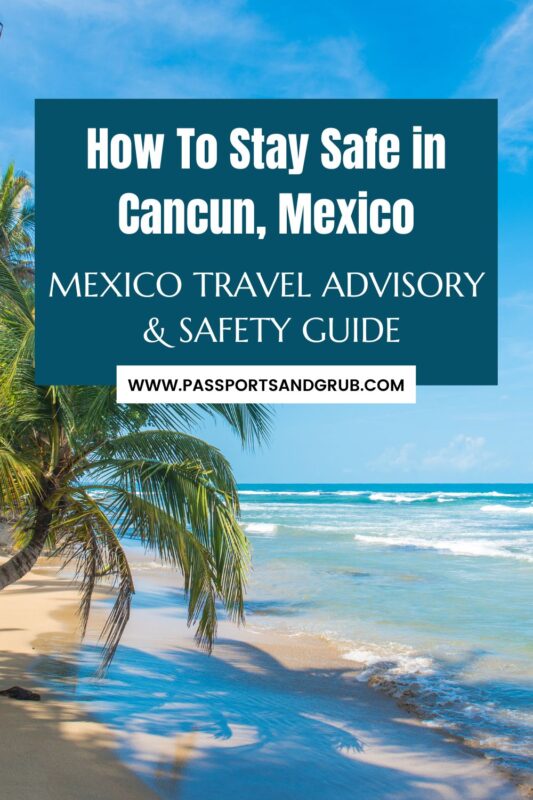
Are you also on Pinterest?
Why not save this post to your Pinterest board for later? I am also on Pinterest so feel free to follow Passports and Grub boards and get the latest PIN directly.
Similar Posts
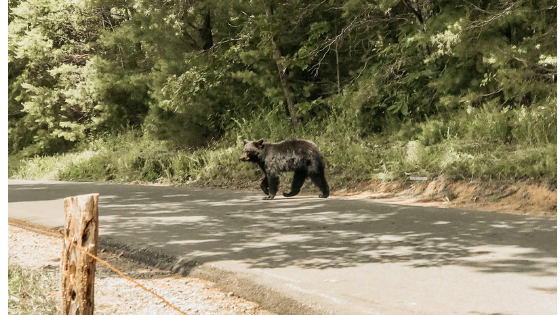
30 Things To Do In Gatlinburg This Summer

15 Awesome Must Take Day Trips From Florence

Is Bodrum Turkey Safe for Americans

The Best Countries to Get Those Mommie Makeovers!

Top 14 Marijuana Dispensaries in Las Vegas

The Best Riviera Maya Tours & Excursions
56 comments.
These are some great tips for traveling to Cancun. I’ve never been there, but it’s on my bucket list. I have been to Cozumel and didn’t have any problems.
I haven’t been to Cancun but I’d still visit. I don’t drink so I would stay away from that since I’ve heard about people get sick and dying after drinking.
I haven’t been to Cancun and I can’t say its high on my list right now but this is great information. I think with everything going on in the world, everyone is a little skeptical on traveling outside of the country
Mexico is still on my list of places to experience. I have seen beautiful pictures and I want to go see it for myself.
Los Cabos and Cancun are my favorite and its expensive to get there.
Ironcially I am in Mexico right now in Playa Del Carmen so not too far from Cancun. Great info because there was a travel advisory by Trump but glad it isnt on high alert.
We have been to Cancun 14 times …Never an Issue ,we will be back there in march… can’t wait… Just like Anywhere else,if you are looking for trouble,you can find it.
Although I haven’t been to Cancun;however, I do want to visit Tulum, – I’ve learned to take heed with the travel advisories. You have a lot of helpful pointers too.
- Pingback: Are you afraid of traveling to Mexico? - The Mazatlán Post
I am from Norway and LOVED our stay in Cancun summer 2019. We met only lovely people and beautiful destinations! I would recommend everyone seeing cancun, it is really breathtaking!
- Pingback: Is Cabo Safe For American Tourists? [Updated January 2021]
- Pingback: Is Mexico Safe? Travel Warning & Safety Guide [Updated January 2021]
My Wife and I have traveled to Cancun with our teenage son and have never had any issues. We have been to Hotel Row, Playa del Carmen, Playcar, Tulum and Puerto Morelos. We always rent a car and have even driven 2 1/2 hours from Cancun to Valladolid Yucatan Mexico. “Great Cenotes in this area” We are going back this April 2021, but we are going to Island hop! Isla Holbox, Isla Mujeres, Isla Cozumel and we will be taking a4 hour day trip to Bacalar, Quintana Roo! We Were in Puerto Morelos for 4th of July week 2020 and were in Huatulco, Oaxaca September 2020 for our 20th Anniversary! We rented a car as always. One thing I can tell you is that in Cancun they are taking this pandemic seriously! The hotels, the tours, the restaurants, the stores and the malls are temperature checking, mandating the use of the mask, making you disinfect your shoes and handing out sanitizer before they allow you in. They are also taking the safe distancing seriously, unlike here in the US where we have these conspiracy theorists that claim the virus is a hoax. We not only feel safe in the Riviera Maya, but we also appreciate that the people there are keeping us visitors and themselves safe!!! Thanks for this page to help fellow travelers to discover the truth about Mexican travel. By the way, if in your Naivety, you like to get drunk, search for illegal substances and women? If the bad guys don’t get you first, the undercover Mexican drug enforcement officers will take you down…
Wonderful advice! What company do you recommend for car rentals? I am trying to book a trip to Cancun with my family for the holidays. Any tips for booking affordable stays or Air BNB’s would also be gladly appreciated!
- Pingback: What To Pack For Mexico - 50+ Essentials For Mexico [Updated Feb 2021]
- Pingback: MUST READ: 10 Safest Cities In Mexico [Updated February 2021]
- Pingback: Is Italy Safe: Travel Warnings You Should Know - Updated March 2021
- Pingback: Kansas City man ran Ponzi scheme, defrauded his church - Metro Voice News
- Pingback: 9 Essential Tips & Tricks For Keeping Your Money Safe While Traveling
Great Information You Shared.
- Pingback: Best Plastic Surgeons in Mexico | [Updated May 2021 ]
- Pingback: Things To Do In Olomouc, Czech Republic | Best Day Trip From Prague
- Pingback: 20 Things To Do In Tulum & Riviera Maya [Updated May 2021]
My just-graduated-college son and several of his friends are literally flying to Cancun this morning on a trip planned months back by one of the kids’ uncle who is a professional travel agent. I panicked at the State Dept update but felt much better after reading beautifully researched and well written and informative website : THANK YOU!!! I am worried post trump that people in Mexico who are rightly upset with America (since we elected — did we? really? — a racist reality tv show guy to run our country and at least he got us all talking about how things need to change) might look at my son who is a large white male and make inaccurate assumptions about him and his views based on his large white maleness. I am aware that my Black-mom friends/colleagues/patients have been dealing with people making inaccurate assumptions based on appearance for lifetimes longer than I have, and I have a whole new appreciation of that experience and how unsettling it is. We raised our son to be antiracist, not really knowing that word yet, 22 years ago, but aware because we could see what has needed to change in this country since America began with a massive blind spot as the the difference between our words “liberty and justice all” and our actions, and my hope and expectation is that my large white male son bears the responsibility to help create that Love-Thy-Neighbor world we all want for ourselves and one another, or so I choose to believe and so I believe God wants us all to have. I don’t know why I’m oversharing like this except I’ve been up since 4 and maybe had too much coffee? My son texted to say they’re off to Mexico, I looked on the State Dept website again, saw the update, freaked out, googled feverishly, found this page, and feel much better, and appreciate this information so much, and now want to quit worrying and jump on a plane and have fun and Be The Change. thank you and sorry for oversharing and God Bless!
No worries whatsoever! Mexico is extremely safe and I just purchased my ticket for Cabo yesterday. I have never encountered any issues while traveling to Mexico. I’m sure your son will be safe and please keep me posted
Umm no. Let’s not bring politics into this, My wife is Mexican. From Cancun I’m a gringo. I’m from Missouri. . We live back and forth. Is this Cancun safe? Don’t ever say politics ever…. It has nothing to do with politics.
I just returned from Cabo and Cancun within the last 3 months. I have been traveling Mexico for years with both my friends, husband, daughter and solo. I have never once encountered criminal activity. Not once have I felt threatened, not once have I been robbed, Not once have my credit cards been stolen but guess where all of the things have happened? Right here in Tennessee!
I took my daughter to Cancun when she graduated college. The hotel was rated 5 star. I was aware of my surroundings at all times. Having lived in Tijuana for over 6 months in the late 70’s. What can I say, it was my rebellious years. Anyway, my daughter had the best time of her life. When she heard me speak Spanish, she hugged me and said “Mom, you amaze me.” I have been to Cancun and Playa del Carmen several times since then. With someone and mostly by myself. I even had a medical procedure done in Cancun. My advice is be able to understand Spanish. At least the basics. Be respectful of the people waiting on you. Remember to tip those waiting on you. A dollar tip will get you better service.
- Pingback: 11 magical warm winter getaways you need to escape the winter blues
- Pingback: READ NOW: Cancun 5 Day Itinerary |15 Things To Do In Cancun [February 2020]
- Pingback: READ NOW: Is Mexico City Safe For Tourists? [ Updated November 2021]
I loved this guide, it was the first I read and helped me get over all the negative news about mexico. I kept coming back to your great advice throughout my visit of this amazing country, so a huge thank you for inspiration!
- Pingback: Is Tulum Safe? Safety and Travel Restrictions for Mexico (November 2021)
- Pingback: Mexico vs Costa Rica: Where Should You Vacation Next? [ Dec 2021 ]
Thank you! I was reading this article and I found very useful information above there.
Thank You! It’s actually a cool and useful piece of information. I’m satisfied that you simply shared this helpful information with us.
This blog was a lot more beneficial for me than I could have thought. It is informative and enlightening, as it gives exact and explanatory guidance and direction.
- Pingback: Is Puerto Vallarta Safe? Travel Warnings & Safety [Updated February 2022]
It was the first guide I read and helped me overcome all the negative news about Mexico. As I toured this incredible country, I kept returning to your great advice, so thank you for inspiring me!
Thank you ! very very helpful … but do you know anything about what recently occurred may 7th, 2022 ?
Wow I will share this article to my friends, I seem to know more things after reading it, it was very helpful, I hope you will make more good articles like this.
- Pingback: The Best Spring Break Destinations for 2023 - Best Prices & Hotels
This is really nice. I would like to thank you for the information that you gave to us.
- Pingback: Is the hotel zone in Cancun Safe 2021? - True goodie
My advice is only go to safe areas for tourism. https://sites.google.com/view/metroidfusionrom
While it’s important to stay informed about safety when traveling, it’s worth noting that millions of tourists visit Cancun and the Riviera Maya each year without any issues. While there have been reports of increased crime, it’s crucial to exercise caution, stick to well-traveled areas, and stay aware of your surroundings. Consulting official advisories, using common sense, and following basic safety guidelines can help ensure a safe and enjoyable trip. It’s always a good idea to stay informed and make decisions based on your own comfort level. Happy travels!
Looking for an airline that can transfer your ordinary travel into extraordinary moments? Choose Delta as your travel companion, and confirm your Delta Airlines booking at the earliest to make the most of your time in the air. This excellent airline aims to facilitate you with the best amenities in the air and on the ground. So go ahead, visit the airline’s official site, and book flight tickets with this incredible airline as soon as possible.
Welcome to Flysair!
Flysair is your trusted airline for convenient and hassle-free travel experiences. We understand that baggage policies are an important consideration when planning your trip. As a partner of Adria Airways, we are pleased to provide you with information about their baggage allowances and policies.
While it’s important to stay informed about safety when traveling, it’s worth noting that millions of tourists visit Cancun and the Riviera Maya each year without any issues.
We provide you cheap flight deals on your Allegiant Airlines in low price. We are offering cheap flight deals on Allegiant Air tickets. Book your Cheap Allegiant Air Flights tickets online now or Call us to get a quick quote for the cheapest airfare.
- Pingback: Is Cancun Safe to Travel to? Unveiling the Truth and Debunking Myths - Capeann Community-Foundation
In my personal experience, 99 out of 100 times, such a holiday goes without much trouble. But that one time that it doesn’t go as it should be, you want to be as prepared as possible. I think everyone who’s planning to visit Cancun should read this. Great job!
- Pingback: Is it Safe to Travel to Cancun? Evaluating the Realities and Misconceptions - Community Improvement through Empowerment
- Pingback: SEO for Amateur Bloggers & Beginners That’s Actually Simple SEO for Amatuer Bloggers That's Actually Simple
- Pingback: The Dos and Don’ts of Crafting URLs for Your Blog
- Pingback: Is Cancun Safe to Travel to? Unveiling the Truth and Debunking Myths - Community Improvement through Empowerment
Leave a Reply Cancel reply
Your email address will not be published. Required fields are marked *
This site uses Akismet to reduce spam. Learn how your comment data is processed .
- Skip to main content
- Skip to "About this site"
Language selection
Search travel.gc.ca.
Help us to improve our website. Take our survey !
COVID-19: travel health notice for all travellers
Mexico travel advice
Latest updates: Natural disasters and climate - removed information on Hurricane Otis
Last updated: April 2, 2024 14:01 ET
On this page
Safety and security, entry and exit requirements, laws and culture, natural disasters and climate, mexico - exercise a high degree of caution.
Exercise a high degree of caution in Mexico due to high levels of criminal activity and kidnapping.
Guerrero - Avoid all travel
This advisory excludes the cities of Ixtapa/Zihuatanejo, where you should exercise a high degree of caution.
Regional Advisory - Avoid non-essential travel
- all Chihuahua
- all Colima, except the city of Manzanillo
- all Coahuila, except the southern part of the state at and below the Saltillo-Torreón highway corridor
- all Durango, except Durango City
- Highway 45 between León and Irapuato
- the area south of and including Highway 45D between Irapuato and Celaya
- all Michoacán, except the cities of Morelia and Patzcuaro
- the Lagunas de Zempoala National Park
- the municipality of Xoxocotla
- the area within 20 km of the border with Sinaloa and Durango
- the city of Tepic
- all Nuevo León, except the city of Monterrey
- all Sinaloa, except the cities of Los Mochis and Mazatlán
- all Sonora, except the cities of Hermosillo and Guaymas/San Carlos and Puerto Peñasco
- all Tamaulipas
- all Zacatecas
Back to top
Deteriorating security situation in Guerrero State
Hurricane Otis struck Guerrero State on October 25, 2023. The security situation remains volatile and unpredictable after the storm. Damage to transportation and communications networks have left many towns and cities isolated, increasing the risk of criminal and gang activity.
Certain areas are particularly affected by banditry and violence, including:
- the highway between Acapulco and Zihuantanejo
- the highway between Acapulco to Chilpancingo
You should avoid all travel to Guerrero State. If you are in Guerrero despite the advisory, you should take necessary precautions to ensure your safety, including:
- avoid travelling alone or after dark
- exercise extreme vigilance
- monitor local media for the latest updates on the situation
- follow the instructions of local authorities
Levels of crime, particularly violent crime, are high throughout Mexico. Arrest and detention rates are low and don’t deter criminal activity.
Criminal groups, including drug cartels, are very active. Clashes between cartels or gangs over territory, drugs and smuggling routes are common.
In some parts of the country, military, navy and federal police forces have been deployed to combat organized crime and improve security conditions. They maintain a visible presence by:
- patrolling the streets
- setting up roadblocks
- conducting random vehicle checks
If you plan on travelling to Mexico:
- remain vigilant at all times
- stay in tourist areas
- be very cautious on major highways
- avoid travelling at night
- monitor local media closely
If you’re the victim of a crime, you must report it immediately to local authorities. No criminal investigation is possible without a formal complaint. Complaints must be made in person before leaving Mexico. You should hire a local lawyer to represent your interests and follow up on your case after you return to Canada. Failure to do may result in incomplete investigations or long delays in bringing cases to trial.
Violent crime
There are high rates of violent crime, such as homicides, kidnappings, carjacking and assaults, including in popular tourist destinations such as the Mayan Riviera (Cancún, Playa del Carmen, Puerto Morelos and Tulum), and Acapulco.
Criminal groups and drug cartels are present in tourist areas. Inter-gang and cartel fighting has taken place in restaurants, hotels and nightclubs frequented by tourists.
Innocent bystanders have been injured or killed. You may be in the wrong place at the wrong time and become a victim of violent crime.
Border areas often see higher criminal activity and violence, including in rural areas. Confrontations between organized criminal groups and Mexican authorities continue to pose a risk. Shootouts, attacks and illegal roadblocks may occur without warning.
You should travel to Mexico by air to avoid international land border crossings, particularly along the border with the United States, in the following cities:
- Ciudad Juárez
- Nuevo Laredo
If crossing an international land border:
- remain extremely vigilant
- use only official border crossings
Armed robbery
Armed robbery occurs. Foreigners have been targets of robberies that sometimes involve assault.
Robbers will follow a victim after they exchange or withdraw money at airports, currency exchange bureaus ( casas de cambio ) or ATMs.
- Stay in hotels and resorts with good security
- If you are threatened by robbers, stay calm and don’t resist
- Avoid withdrawing or exchanging money in public areas of the airport
Canadian travellers have been physically and sexually assaulted. In some cases, hotel employees, taxi drivers and security personnel at popular tourist destinations were involved. In some cases, hotel staff are not helpful and try to dissuade victims from pursuing the incident with police.
- Avoid walking after dark, especially alone
- Avoid isolated or deserted areas
- Avoid excessive alcohol consumption
Are you a victim of sexual violence? – Government of Canada and British Embassy Mexico City
Credit card and ATM fraud
Credit card and ATM fraud occurs in Mexico. When using debit or credit cards:
- pay careful attention when others are handling your cards
- use ATMs located in public areas or inside a bank or business
- avoid using card readers with an irregular or unusual feature
- cover the keypad with one hand when entering your PIN
- check for any unauthorized transactions on your account statements
Overcharging
Some bars and nightclubs may try to charge exorbitant prices. Discussions about overcharging may lead to threats of violence and security guards may force you to pay. Avoid running a tab or leaving your credit card with bar or restaurant staff.
Overseas fraud
Police officers
Legitimate police officers have extorted money from tourists or arrested tourists for minor offences such as :
- drinking alcohol on the street
- urinating on public roads
- traffic violations
They have requested immediate cash payment in exchange for their release. Travellers driving rental cars have been targeted.
If this occurs:
- don’t hand over your money or your passport
- ask for the officer’s name, badge and patrol car number
- ask for a copy of the written fine, which is payable at a later date, or insist on going to the nearest police station
Virtual kidnappings
Extortion, including virtual kidnappings, is the third most common crime in Mexico. Criminals use a variety of tactics to gather information about potential victims for extortion purposes, including using social media sites or eavesdropping on conversations
In a virtual kidnapping, criminals contact the victim’s hotel room landline and threaten the victim to stay in their room. The criminals then instruct the victim to provide information needed for the caller to use to contact family and friends, to demand the immediate payment of ransom for their release.
- Don't discuss travel plans, your room number or any other personal information around strangers
- Never leave your cellphone unattended
- Ensure your cellphone is password protected
- Don't divulge personal business details to strangers in person or over the phone or on social media, especially when using hotel phones
- If you're threatened on the phone or hear screams, hang up immediately
- When you answer the phone, wait for the caller to speak. If the caller asks who is speaking, hang up immediately.
- Don’t answer unrecognized or blocked phone numbers
- Don’t answer hotel landlines
Kidnappings
Mexico has one of the highest kidnapping rates in the world. Kidnapping, including virtual and express kidnapping, is a serious security risk throughout Mexico.
Kidnappers target all classes. Canadian citizens and contractors working for Canadian businesses have been kidnapped, mostly in areas that are not under the control of police and security forces.
If you're kidnapped:
- comply with the kidnappers’ requests
- don’t attempt to resist
Express kidnappings
Express kidnappings occur in large urban areas. This is a method of kidnapping where criminals ask for a small and immediate ransom.
Thieves most commonly work in cooperation with, or pose as, taxi drivers. They force victims to use their debit or credit card to withdraw money from ATMs in exchange for their release.
- Use only a reputable taxi company or a trusted ride-sharing app
- Book taxis through your hotel or an authorized taxi stand ( sitio )
Petty theft
Petty crime, such as pickpocketing and purse snatching, is common in Mexico.
- Be aware of your surroundings at all times, even in areas normally considered safe
- Ensure that your belongings, including your passport and other travel documents, are secure at all times
- Avoid showing signs of affluence, such as flashy jewellery, cell phones, headphones and designer bags
- Carry only small amounts of money
- Be cautious when withdrawing cash from ATMs
Home break-ins
Tourists staying in rental homes have been the victims of break-ins and burglaries. Whether you're staying in private or commercial accommodations, make sure you lock windows and doors securely.
Women’s safety
Women travelling alone may be subject to some forms of harassment and verbal abuse.
Some incidents of assault, rape and sexual assault against Canadian women have occurred, including at beach resorts and on public buses.
- Exercise caution when dealing with strangers or recent acquaintances
- Be wary of rides or other invitations
Advice for women travellers
Spiked food and drinks
Never leave food or drinks unattended or in the care of strangers. Be wary of accepting snacks, beverages, gum or cigarettes from new acquaintances. These items may contain drugs that could put you at risk of sexual assault and robbery.
Unregulated alcohol
Some bars, restaurants and resorts have served counterfeit alcohol. Some travellers have reported getting sick or blacking out after drinking alcohol.
- Be cautious if you choose to drink alcohol
- Seek medical assistance if you begin to feel sick
Alcohol, drugs and travel
Height standards for balcony railings in Mexico can be considerably lower than those in Canada. Falls have resulted in deaths and injuries.
- Exercise caution when standing close to balcony railings
Demonstrations
Demonstrations take place regularly throughout the country. Protests and roadblocks are common in:
- Mexico City, including to and from the airport
- the states of Chiapas, Guerrero, Michoacán and Oaxaca
Such incidents may last a long time, leading to shortages of fresh food, medicine and gasoline.
Even peaceful demonstrations can turn violent at any time. They can also lead to disruptions to traffic and public transportation.
- Avoid areas where demonstrations and large gatherings are taking place
- Follow the instructions of local authorities
- Monitor local media for information on ongoing demonstrations
Mass gatherings (large-scale events)
Water activities
Coastal waters can be dangerous. Riptides are common. Several drownings occur each year.
Many beaches don’t offer warnings of dangerous conditions and they don’t always have lifeguards on duty.
Rescue services may not be consistent with international standards.
- Consult local residents and tour operators for information on possible hazards and safe swimming areas
- Always obey warning flags at beaches
- Follow the instructions and warnings of local authorities
Water sports
Tour operators may not adhere to international standards. Many operators don’t conduct regular safety checks on their sporting and aquatic equipment.
Also, Canadians have been involved in accidents where operators of recreational vehicles, such as watercraft, have demanded compensation exceeding the value of the damage caused to the vehicle or equipment.
If you undertake water sports, such as diving:
- choose a well-established and reputable company that has insurance
- ensure that your travel insurance covers the recreational activities you choose
- wear the appropriate safety equipment, such as helmets and life jackets
- ensure that equipment is available and in good condition
- don’t consume alcohol before the activity
If in doubt concerning the safety of the facilities or equipment, don’t use them.
Water safety abroad
Adventure tourism
Outdoor activities, such as white water rafting, kayaking, scuba diving, snorkelling, bungee, zip lining, paragliding, hiking, mountain biking, etc and other adventure activities can be dangerous if unprepared. Trails are not always marked, and weather conditions can change rapidly, even during summer.
Tour operators may not always adhere to international safety standards.
If you intend to practice adventure tourism:
- consider hiring an experienced guide from a reputable company
- obtain detailed information on your activity and on the environment in which you will be setting out
- buy travel insurance that includes helicopter rescue and medical evacuation
- know the symptoms of acute altitude sickness, which can be fatal
- pay attention to the symptoms of dehydration and heatstroke, both of which can be fatal
- avoid venturing off marked trails
- ensure that you’re adequately equipped and bring sufficient water
- stay informed about weather and other conditions that may pose a hazard
- refrain from using facilities or equipment if you have doubts on their safety
- inform a family member or friend of your itinerary
Road travel
Road conditions and road safety.
Road conditions and road safety can vary greatly throughout the country.
Road conditions can be dangerous due to:
- sharp curves
- poorly marked or hidden road signs
- construction sites
- roaming livestock
- slow-moving or abandoned vehicles
Toll highways are typically safer and better maintained than secondary highways.
Mexican driving styles are very different from those in Canada. Many drivers don’t respect traffic laws, and police don’t strictly enforce these laws. Drivers often drive at excessive speeds and may be aggressive or reckless. Drinking and driving laws are not strictly enforced. Accidents causing fatalities are common. Police don’t regularly patrol the highways.
Roadblocks and checkpoints
Illegal roadblocks and demonstrations are common. Heavily armed gangs have attacked travellers on intercity highways. Criminals especially target sport utility vehicles and full-size pickup trucks for theft and carjacking.
The military searches for drugs and firearms at military checkpoints throughout the country.
- Avoid road travel at night between cities throughout the country
- Ensure that you only stop in major centres, at reputable hotels or at secure campsites
- Keep your car doors locked and the windows closed, especially at traffic lights
- Avoid hitchhiking which is not a common practice in Mexico
- Don’t leave valuables in the vehicle
- Rent cars that don’t have stickers or other advertisements for the rental company on them, as rental cars have been targets for robbery, sometimes using force
- Ensure operators provide insurance and helmets if renting scooters
- Travel on toll roads to lower the risk of targeted roadblocks and robberies
- Never attempt to cross roadblocks, even if they appear unattended
Public transportation
Remain vigilant in airports, at bus stations, on buses and on the metro.
The Mexico City metro is often very crowded and a popular place for pickpocketing. There are metro cars dedicated to women and children during rush hours. They are located at the front of the trains.
The Metrobus in Mexico City, which has dedicated lanes and stops, is relatively safe. There are sections dedicated to women and children at the front of the buses.
The “colectivos” and “pesero” mini-buses that stop when hailed are frequently targeted for robbery.
When travelling to other cities, use bus companies that offer VIP or executive class transportation. These buses only travel on toll roads, which lower the risks of targeted roadblocks and robberies, and follow a speed limit.
Taxis and ridesharing services
Disputes between taxi and ridesharing application drivers may occur, especially in Quintana Roo. They may result in:
- altercations
Although tourists have not been targeted, you may be caught up in these incidents and harassed or injured.
In Mexico City, all government-authorized taxis have licence plates starting with “A” or “B.” Taxis from designated stands have both the logo of their company and the plate number stamped on the side of the car. Official taxis in Mexico City are pink and white. Users can validate the pink and white taxis on the CDMX app.
- Avoid hailing taxis on the street
- Don't share taxis with strangers
When arriving at an airport in Mexico, pre-pay the taxi fare at the airport (inside or outside the terminal) and ask to see the driver’s official identification. You can also use a ridesharing app to arrange for a pickup at certain airports. Not all airports in Mexico allow ridesharing service pickups.
If you use a trusted ridesharing app, confirm the driver’s identity and the licence plate before getting in the car.
Mi Taxi – CDMX app (in Spanish)
Cruise ship travel
Plan carefully if you plan to take a cruise departing from or stopping in Mexico.
Advice for cruise travellers
Pirate attacks and armed robbery against ships occur in coastal waters of the Bay of Campeche. Mariners should take appropriate precautions.
Live piracy report - International Maritime Bureau
We do not make assessments on the compliance of foreign domestic airlines with international safety standards.
Information about foreign domestic airlines
Every country or territory decides who can enter or exit through its borders. The Government of Canada cannot intervene on your behalf if you do not meet your destination’s entry or exit requirements.
We have obtained the information on this page from the Mexican authorities. It can, however, change at any time.
Verify this information with the Foreign Representatives in Canada .
Entry requirements vary depending on the type of passport you use for travel.
Before you travel, check with your transportation company about passport requirements. Its rules on passport validity may be more stringent than the country’s entry rules.
Regular Canadian passport
Your passport must be valid for the expected duration of your stay in Mexico.
Passport for official travel
Different entry rules may apply.
Official travel
Passport with “X” gender identifier
While the Government of Canada issues passports with an “X” gender identifier, it cannot guarantee your entry or transit through other countries. You might face entry restrictions in countries that do not recognize the “X” gender identifier. Before you leave, check with the closest foreign representative for your destination.
Other travel documents
Different entry rules may apply when travelling with a temporary passport or an emergency travel document. Before you leave, check with the closest foreign representative for your destination.
Useful links
- Foreign Representatives in Canada
- Canadian passports
Tourist visa: not required Business visa: required Work visa: required Student visa: required
Required documents
To enter Mexico, you must present a valid passport and a duly completed tourist card (Multiple Immigration Form). Carry documents to prove the purpose of trip, such as hotel or tour booking confirmations, as immigration officers may request them.
Tourist card
You must obtain a tourist card to enter the country unless you stay in Mexico for less than 72 hours within the northern border zone.
If you don’t obtain a tourist card upon arrival, you may face:
It is highly recommended to keep your digital tourist card, or tourist card if entered by land, with you at all times as proof of your legal stay in Mexico. You may be asked to show it to Mexican officials when exiting the country or if you are stopped on an immigration check point.
If you are stopped at an immigration check point and you are unable to prove your legal stay, you may be fined, detained or expelled from the country.
Entering by land
If entering Mexico by land, you must stop at the immigration office located at the border to obtain a tourist card, even if not explicitly directed by Mexican officials. Immigration officials will write down on your tourist card the number of days you are allowed to stay in Mexico.
You may complete the tourist card form online before your arrival. However, you must print the form and present it to the migration official at the port of entry.
Multiple Immigration Form - Government of Mexico
Entering by air
If entering Mexico by air, you are advised to download your tourist card issued by Mexican officials upon entry.
Depending on your airport of entry:
- the immigration official will stamp your passport and note the number of days you are allowed to spend in Mexico or
- you will go through an E-gate kiosk where you will scan your passport and self-register your entry in the country. Only use this option if you are entering Mexico as a tourist.
Once in the country, whether you entered via a E-gate or not, you will be able to access the digital tourist card online. You have 60 days to download it.
If you are unable to show your tourist card or digital tourist card upon departure, you will have to pay for a replacement at the immigration office of any international airport before boarding.
Make sure to plan sufficient time at the airport to obtain a new card in time for your flight.
Portal access for digital tourist card - Government of Mexico
Length of stay
An immigration official will determine the number of days you can remain in Mexico and note it on your tourist card. The maximum length granted for a tourism-related trip is 180 days; the maximum number of days is not granted by default.
If you're seeking the maximum number of days, you may be required to:
- explain the purpose of your trip to the immigration official
- provide details about your trip (accommodations, funds, return flight, etc.)
You won’t be able to request an extension or change the condition of your stay from inside the country.
Canadians travelling to the northern border zone (within 21 kilometres of the U.S. border) for work don’t require a visa for stays of 72 hours or less.
If you require a business or work visa, you should take care of the process yourself. If a prospective employer is processing your visa for you:
- obtain copies of all correspondence between the employer and Mexican immigration authorities
- verify that these copies are stamped by the immigration authorities as proof that your papers are being processed
- request a receipt from your employer for any document that you provide for purposes of obtaining the visa
- avoid surrendering your passport to your employer
Volunteer, religious, research and eco-tourism activities
You may not be able to undertake volunteer, religious/missionary, research or certain forms of eco-tourism activities while visiting as a tourist. Contact the Mexican Embassy or closest Mexican consulate for information the type of visa required for these activities.
Tourism tax
Most visitors to Mexico must pay a tourism tax.
This fee is normally included in airline ticket prices. Visitors arriving by road or sea will have to pay this fee at any bank in Mexico. There is a bank representative at every port of entry. The bank receipt must be attached to the tourist card for submission at departure.
You don't have to pay this tax if:
- you're entering by land for tourism purposes, and your stay will not exceed 7 days
- you're travelling to the northern border zone for less than 72 hours
- you're travelling to Mexico on a cruise ship
Dual citizenship
If entering and leaving Mexico as a dual citizen, you must identify yourself as a Mexican citizen. You must carry valid passports for both countries.
Laws about dual citizenship
Criminal records
Canadians with a criminal record or a warrant for arrest may be refused entry and returned to Canada or to a third country on the next available flight.
Children and travel
Learn more about travelling with children .
Yellow fever
Learn about potential entry requirements related to yellow fever (vaccines section).
Relevant Travel Health Notices
- Global Measles Notice - 13 March, 2024
- Zika virus: Advice for travellers - 31 August, 2023
- COVID-19 and International Travel - 13 March, 2024
- Dengue: Advice for travellers - 25 March, 2024
This section contains information on possible health risks and restrictions regularly found or ongoing in the destination. Follow this advice to lower your risk of becoming ill while travelling. Not all risks are listed below.
Consult a health care professional or visit a travel health clinic preferably 6 weeks before you travel to get personalized health advice and recommendations.
Routine vaccines
Be sure that your routine vaccinations , as per your province or territory , are up-to-date before travelling, regardless of your destination.
Some of these vaccinations include measles-mumps-rubella (MMR), diphtheria, tetanus, pertussis, polio, varicella (chickenpox), influenza and others.
Pre-travel vaccines and medications
You may be at risk for preventable diseases while travelling in this destination. Talk to a travel health professional about which medications or vaccines may be right for you, based on your destination and itinerary.
Yellow fever is a disease caused by a flavivirus from the bite of an infected mosquito.
Travellers get vaccinated either because it is required to enter a country or because it is recommended for their protection.
- There is no risk of yellow fever in this country.
Country Entry Requirement*
- Proof of vaccination is not required to enter this country.
Recommendation
- Vaccination is not recommended.
* It is important to note that country entry requirements may not reflect your risk of yellow fever at your destination. It is recommended that you contact the nearest diplomatic or consular office of the destination(s) you will be visiting to verify any additional entry requirements.
About Yellow Fever
Yellow Fever Vaccination Centres in Canada
There is a risk of hepatitis A in this destination. It is a disease of the liver. People can get hepatitis A if they ingest contaminated food or water, eat foods prepared by an infectious person, or if they have close physical contact (such as oral-anal sex) with an infectious person, although casual contact among people does not spread the virus.
Practise safe food and water precautions and wash your hands often. Vaccination is recommended for all travellers to areas where hepatitis A is present.
Measles is a highly contagious viral disease. It can spread quickly from person to person by direct contact and through droplets in the air.
Anyone who is not protected against measles is at risk of being infected with it when travelling internationally.
Regardless of where you are going, talk to a health care professional before travelling to make sure you are fully protected against measles.
Hepatitis B is a risk in every destination. It is a viral liver disease that is easily transmitted from one person to another through exposure to blood and body fluids containing the hepatitis B virus. Travellers who may be exposed to blood or other bodily fluids (e.g., through sexual contact, medical treatment, sharing needles, tattooing, acupuncture or occupational exposure) are at higher risk of getting hepatitis B.
Hepatitis B vaccination is recommended for all travellers. Prevent hepatitis B infection by practicing safe sex, only using new and sterile drug equipment, and only getting tattoos and piercings in settings that follow public health regulations and standards.
Coronavirus disease (COVID-19) is an infectious viral disease. It can spread from person to person by direct contact and through droplets in the air.
It is recommended that all eligible travellers complete a COVID-19 vaccine series along with any additional recommended doses in Canada before travelling. Evidence shows that vaccines are very effective at preventing severe illness, hospitalization and death from COVID-19. While vaccination provides better protection against serious illness, you may still be at risk of infection from the virus that causes COVID-19. Anyone who has not completed a vaccine series is at increased risk of being infected with the virus that causes COVID-19 and is at greater risk for severe disease when travelling internationally.
Before travelling, verify your destination’s COVID-19 vaccination entry/exit requirements. Regardless of where you are going, talk to a health care professional before travelling to make sure you are adequately protected against COVID-19.
The best way to protect yourself from seasonal influenza (flu) is to get vaccinated every year. Get the flu shot at least 2 weeks before travelling.
The flu occurs worldwide.
- In the Northern Hemisphere, the flu season usually runs from November to April.
- In the Southern Hemisphere, the flu season usually runs between April and October.
- In the tropics, there is flu activity year round.
The flu vaccine available in one hemisphere may only offer partial protection against the flu in the other hemisphere.
The flu virus spreads from person to person when they cough or sneeze or by touching objects and surfaces that have been contaminated with the virus. Clean your hands often and wear a mask if you have a fever or respiratory symptoms.
Malaria is a serious and sometimes fatal disease that is caused by parasites spread through the bites of mosquitoes. There is a risk of malaria in certain areas and/or during a certain time of year in this destination.
Antimalarial medication may be recommended depending on your itinerary and the time of year you are travelling. Consult a health care professional or visit a travel health clinic before travelling to discuss your options. It is recommended to do this 6 weeks before travel, however, it is still a good idea any time before leaving. Protect yourself from mosquito bites at all times: • Cover your skin and use an approved insect repellent on uncovered skin. • Exclude mosquitoes from your living area with screening and/or closed, well-sealed doors and windows. • Use insecticide-treated bed nets if mosquitoes cannot be excluded from your living area. • Wear permethrin-treated clothing. If you develop symptoms similar to malaria when you are travelling or up to a year after you return home, see a health care professional immediately. Tell them where you have been travelling or living.
In this destination, rabies is carried by dogs and some wildlife, including bats. Rabies is a deadly disease that spreads to humans primarily through bites or scratches from an infected animal. While travelling, take precautions , including keeping your distance from animals (including free-roaming dogs), and closely supervising children.
If you are bitten or scratched by an animal while travelling, immediately wash the wound with soap and clean water and see a health care professional. Rabies treatment is often available in this destination.
Before travel, discuss rabies vaccination with a health care professional. It may be recommended for travellers who are at high risk of exposure (e.g., occupational risk such as veterinarians and wildlife workers, children, adventure travellers and spelunkers, and others in close contact with animals).
Safe food and water precautions
Many illnesses can be caused by eating food or drinking beverages contaminated by bacteria, parasites, toxins, or viruses, or by swimming or bathing in contaminated water.
- Learn more about food and water precautions to take to avoid getting sick by visiting our eat and drink safely abroad page. Remember: Boil it, cook it, peel it, or leave it!
- Avoid getting water into your eyes, mouth or nose when swimming or participating in activities in freshwater (streams, canals, lakes), particularly after flooding or heavy rain. Water may look clean but could still be polluted or contaminated.
- Avoid inhaling or swallowing water while bathing, showering, or swimming in pools or hot tubs.
Travellers' diarrhea is the most common illness affecting travellers. It is spread from eating or drinking contaminated food or water.
Risk of developing travellers' diarrhea increases when travelling in regions with poor standards of hygiene and sanitation. Practise safe food and water precautions.
The most important treatment for travellers' diarrhea is rehydration (drinking lots of fluids). Carry oral rehydration salts when travelling.
Typhoid is a bacterial infection spread by contaminated food or water. Risk is higher among children, travellers going to rural areas, travellers visiting friends and relatives or those travelling for a long period of time.
Travellers visiting regions with a risk of typhoid, especially those exposed to places with poor sanitation, should speak to a health care professional about vaccination.
Salmonellosis is a common illness among travellers to this country. It can be spread through contaminated food or beverages, such as raw or undercooked poultry and eggs, as well as fruits or vegetables.
Practice safe food and water precautions . This includes only eating food that is properly cooked and still hot when served.
Pregnant women, children under 5 years of age, those over 60 years of age, and those with weakened immune systems are at greater risk of becoming seriously ill.
Cases of multidrug-resistant (MDR) Salmonella have been reported among Canadian travellers returning from Mexico. These strains of Salmonella do not respond to some of the recommended antibiotics if treatment is needed.
Most people recover on their own without medical treatment and from proper rehydration (drinking lots of fluids).
- Carry oral rehydration salts when travelling.
Travellers with severe symptoms should consult a health care professional as soon as possible.
Insect bite prevention
Many diseases are spread by the bites of infected insects such as mosquitoes, ticks, fleas or flies. When travelling to areas where infected insects may be present:
- Use insect repellent (bug spray) on exposed skin
- Cover up with light-coloured, loose clothes made of tightly woven materials such as nylon or polyester
- Minimize exposure to insects
- Use mosquito netting when sleeping outdoors or in buildings that are not fully enclosed
To learn more about how you can reduce your risk of infection and disease caused by bites, both at home and abroad, visit our insect bite prevention page.
Find out what types of insects are present where you’re travelling, when they’re most active, and the symptoms of the diseases they spread.
There is a risk of chikungunya in this country. The risk may vary between regions of a country. Chikungunya is a virus spread through the bite of an infected mosquito. Chikungunya can cause a viral disease that typically causes fever and pain in the joints. In some cases, the joint pain can be severe and last for months or years.
Protect yourself from mosquito bites at all times. There is no vaccine available for chikungunya.
- In this country, dengue is a risk to travellers. It is a viral disease spread to humans by mosquito bites.
- Dengue can cause flu-like symptoms. In some cases, it can lead to severe dengue, which can be fatal.
- The level of risk of dengue changes seasonally, and varies from year to year. The level of risk also varies between regions in a country and can depend on the elevation in the region.
- Mosquitoes carrying dengue typically bite during the daytime, particularly around sunrise and sunset.
- Protect yourself from mosquito bites . There is no vaccine or medication that protects against dengue.
Zika virus is a risk in this country.
Zika virus is primarily spread through the bite of an infected mosquito. It can also be sexually transmitted. Zika virus can cause serious birth defects.
During your trip:
- Prevent mosquito bites at all times.
- Use condoms correctly or avoid sexual contact, particularly if you are pregnant.
If you are pregnant or planning a pregnancy, you should discuss the potential risks of travelling to this destination with your health care provider. You may choose to avoid or postpone travel.
For more information, see Zika virus: Pregnant or planning a pregnancy.
American trypanosomiasis (Chagas disease) is a risk in this country. It is caused by a parasite spread by infected triatomine bugs. The infection can be inactive for decades, but humans can eventually develop complications causing disability and even death.
Risk is generally low for most travellers. Protect yourself from triatomine bugs, which are active at night, by using mosquito nets if staying in poorly-constructed housing. There is no vaccine available for Chagas disease.
Animal precautions
Some infections, such as rabies and influenza, can be shared between humans and animals. Certain types of activities may increase your chance of contact with animals, such as travelling in rural or forested areas, camping, hiking, and visiting wet markets (places where live animals are slaughtered and sold) or caves.
Travellers are cautioned to avoid contact with animals, including dogs, livestock (pigs, cows), monkeys, snakes, rodents, birds, and bats, and to avoid eating undercooked wild game.
Closely supervise children, as they are more likely to come in contact with animals.
Person-to-person infections
Stay home if you’re sick and practise proper cough and sneeze etiquette , which includes coughing or sneezing into a tissue or the bend of your arm, not your hand. Reduce your risk of colds, the flu and other illnesses by:
- washing your hands often
- avoiding or limiting the amount of time spent in closed spaces, crowded places, or at large-scale events (concerts, sporting events, rallies)
- avoiding close physical contact with people who may be showing symptoms of illness
Sexually transmitted infections (STIs) , HIV , and mpox are spread through blood and bodily fluids; use condoms, practise safe sex, and limit your number of sexual partners. Check with your local public health authority pre-travel to determine your eligibility for mpox vaccine.
Medical services and facilities
The quality of care varies greatly throughout the country.
Good health care is available in private hospitals and clinics, but it’s generally expensive. Most private facilities won’t agree to deal directly with medical insurance companies and will require payment with a credit card in advance or a bank transfer/direct deposit.
Mental health services are extremely limited in Mexico, particularly outside of Mexico City. Services and treatment standards may differ substantially from those in Canada.
Medical evacuation can be very expensive and you may need it in case of serious illness or injury.
Make sure you get travel insurance that includes coverage for medical evacuation and hospital stays.
Travel health and safety
Medical tourism
Medical tourism is common in Mexico. Canadian travellers have had serious health complications following cosmetic or other elective surgeries abroad.
Before leaving for medical travel, you should do your research, especially on:
- the health and financial risks
- the medical facility where the procedure will be performed
- language barriers, which can lead to misunderstandings about your medical care and conditions
- travel insurance that includes coverage for the type of medical procedure you will be undergoing
You should discuss your medical plans with your primary healthcare provider in Canada before travelling. Most provincial and territorial health care programs are extremely limited in their coverage offered abroad.
- Make sure that the healthcare providers you choose are authorized by the Mexican health authorities
- Ask to see the credentials of the healthcare providers
- Obtain a written agreement detailing the proposed treatment or procedure
- Receiving medical care outside Canada
- If you become sick or injured while travelling outside Canada or after your return
- Medical tourism – Government of Mexico (in Spanish)
If you take prescription medication, you’re responsible for determining their legality in Mexico.
- Bring sufficient quantities of your medication with you
- Always keep your medication in the original container
- Pack your medication in your carry-on luggage
- Carry a copy of your prescriptions
Medication cannot be sent to Mexico from Canada via courier services.
Many types of medication—both over-the-counter and prescription—are readily available with little oversight. Counterfeit medication is common in certain parts of Mexico. If you need to purchase medication while in Mexico, make sure to get it from a reputable location.
Federal Commission for protection against sanitary risk (in Spanish)
Air quality in Mexico City
In Mexico City, you may experience health problems caused by high altitude or by air pollution, which is at its peak during the winter months.
Consult your doctor before booking your trip if you have lung, heart or respiratory problems.
Death in Mexico
If you plan to retire or spend long periods of time in Mexico, or travel there for medical procedures, you should:
- share your plans or wishes with relatives
- make sure important documents can easily be located
- make arrangements in case of your death while in the country
- What if I Die in Mexico? – Fact sheet
- Death Abroad Factsheet
Keep in Mind...
The decision to travel is the sole responsibility of the traveller. The traveller is also responsible for his or her own personal safety.
Be prepared. Do not expect medical services to be the same as in Canada. Pack a travel health kit , especially if you will be travelling away from major city centres.
You must abide by local laws.
Penalties for breaking the law in Mexico can be more severe than in Canada, even for similar offences.
Foreign nationals are often held in pre-trial detention and there can be lengthy delays before a trial.
Many petty crimes (such as public urination, failure to pay a bill or disorderly behaviour) can result in a 72-hour detention by police. Paying a fine can secure an early release from detention.
Detention conditions are below the standards of Canadian prisons.
- Overview of the criminal law system in Mexico
- Arrest and detention
Penalties for possession, use or trafficking of illegal drugs are severe. Convicted offenders can expect lengthy prison sentences.
Drugs, alcohol and travel
Smoking is prohibited in all public places except for clearly marked designated smoking areas. This includes but is not limited to:
- restaurants
You may be fined if you’re caught smoking in public.
Electronic cigarettes
It’s illegal to bring electronic cigarettes/vaping devices and solutions into Mexico.
You could have these items confiscated by customs officials if you have them in your possession. You could also be fined or detained.
It is strictly prohibited to sell or distribute these devices and solutions in Mexico.
Imports and exports
The Mexican government strictly enforces its laws concerning possession, importation and trafficking of firearms.
Anyone entering Mexico with a firearm or ammunition without prior written authorization from Mexican authorities is subject to imprisonment.
It is also illegal to enter the country with certain types of knives.
Importing vehicles and boats
Mexico has very strict rules regarding the importation of foreign vehicles and boats.
You must enter Mexico with the proper import permit and insurance, since it cannot be obtained once you are in Mexico. You may face a fine and have your vehicle seized if you enter Mexico without the proper permit.
You must present a paper document of your vehicle registration to obtain a vehicle importation permit from the Mexican authorities. If you present a digital document of your vehicle registration, your vehicle may be refused entry into Mexico.
- Vehicle importation – Government of Mexico (in Spanish)
- Temporary vehicle import application system – Banjército
- Travelling to Mexico by land – Mexican Embassy in Canada
Cigarettes and alcohol
If you are older than 18, you are allowed to bring into Mexico up to:
- 10 cigarette packs
- 25 cigars or
- 200 grams of tobacco
- 3 litres of alcohol and
- 6 litres of wine
If you bring more alcohol and cigarettes into Mexico than allowed, even if you declare your imported items, you will be subject to a high import fee. You will still be subject to a significant fee if you decide to relinquish your imported items
It’s illegal to possess archaeological artefacts or to export such items from Mexico.
- Goods you can bring to Mexico as part of your personal luggage – Government of Mexico
- Goods you cannot bring into Mexico – Government of Mexico
- Agricultural product restrictions – Government of Mexico (in Spanish)
Political activity
It’s illegal for foreigners to conduct political activity in Mexico, including participating in demonstrations.
2SLGBTQI+ travellers
Mexican law does not prohibit sexual acts between individuals of the same sex. However, homosexuality is not widely accepted in Mexican society, particularly in rural areas.
2SLGBTQI+ travellers could be discriminated against based on their sexual orientation, gender identity, gender expression or sex characteristics. Transgender and gender non-conforming individuals are disproportionately targeted for violence and can face discrimination.
Travel and your sexual orientation, gender identity, gender expression and sex characteristics
Dual citizenship is legally recognized in Mexico.
If you are a Canadian citizen, but also a citizen of Mexico, our ability to offer you consular services may be limited while you're there. You may also be subject to different entry/exit requirements .
Travellers with dual citizenship
International Child Abduction
The Hague Convention on the Civil Aspects of International Child Abduction is an international treaty. It can help parents with the return of children who have been removed to or retained in certain countries in violation of custody rights. The convention applies between Canada and Mexico.
If your child was wrongfully taken to, or is being held in Mexico, and if the applicable conditions are met, you may apply for the return of your child to the Mexican court.
If you are in this situation:
- act as quickly as you can
- contact the Central Authority for your province or territory of residence for information on starting an application under The Hague Convention
- consult a lawyer in Canada and in Mexico to explore all the legal options for the return of your child
- report the situation to the nearest Canadian government office abroad or to the Vulnerable Children’s Consular Unit at Global Affairs Canada by calling the Emergency Watch and Response Centre
If your child was removed from a country other than Canada, consult a lawyer to determine if The Hague Convention applies.
Be aware that Canadian consular officials cannot interfere in private legal matters or in another country’s judicial affairs.
- List of Canadian Central Authorities for the Hague Convention
- International Child Abduction: A Guidebook for Left-Behind Parents
- Travelling with children
- The Hague Convention - Hague Conference on Private International Law
- Canadian embassies and consulates by destination
- Emergency Watch and Response Centre
There are no clear procedures or regulations about surrogacy in Mexico.
If you're considering surrogacy, seek advice from legal professionals knowledgeable in Canadian and Mexican laws and citizenship procedures.
Identity documents
The names on your identity documents must be identical to those on your birth certificate to obtain official Mexican documents, such as marriage certificates, immigration documents or passports.
Middle names are often left off Canadian identity documents. This has caused significant difficulties for many Canadians. If you plan on residing in Mexico or dealing with the Mexican Civil Registry, obtain a Canadian passport that will meet Mexican requirements.
Identification
You should carry photo identification.
Authorities can ask you to show identification and a proof of your legal status in Mexico. They can demand to see your tourist card at any time. You must carry the original at all times. You must carry the original at all times, and should also carry a photocopy of the identification page of your passport.
Investments
If you plan on buying property, or making other investments in Mexico, seek legal advice in Canada and in Mexico. Do so before making commitments. Related disputes could take time and be costly to resolve.
Mexican real estate agents are not licensed or regulated.
- Choose your own lawyer
- Avoid hiring a lawyer recommended by a seller
Problems with timeshare arrangements occur.
Timeshare representatives may be very persistent. They use pressure tactics and offer free tours, meals, gifts or alcoholic beverages.
It's illegal for timeshare companies to ask you to sign a waiver that prevents you from cancelling a contract. You're legally entitled to cancel a timeshare contract without penalty within 5 working days. Contracts must be cancelled in writing directly with the timeshare company.
Before purchasing a timeshare:
- gather as much information as possible
- review carefully the contract; anything not included in the contract will not be honoured
- provide your credit card only if you are sure you want to make the purchase
- keep copies of all correspondence
If you suspect a fraud in the real estate procedures, contact the Federal Attorney’s Office of Consumer immediately.
- Federal Attorney’s Office of Consumer (PROFECO) – Mexican Government (in Spanish)
- Should I buy a timeshare in Mexico? - Embassy of Mexico in Canada
- Should I sell my timeshare in Mexico? - Embassy of Mexico in Canada
Rental accommodations
Rental agreements between two individuals in Mexico are considered a private matter and are not regulated by the government.
If you encounter difficulties with a rental agreement, you must obtain the services of a Mexican lawyer.
You should carry an international driving permit.
International Driving Permit
Auto insurance
Mexican liability insurance is mandatory. Canadian automobile insurance is not valid in Mexico.
You can obtain insurance at the Mexican border. You should obtain full coverage, including coverage for legal assistance.
Automobile insurance is much more expensive in Mexico than in Canada. Many local drivers don’t have any form of car insurance.
If you’re involved in an accident, and you don’t have Mexican liability insurance, you could be prevented from leaving the country until all parties agree that adequate financial satisfaction has been received. If you’re found to be under the influence of alcohol or drugs at the time of an accident, or if you don’t have a valid driver’s licence, your insurance will be considered invalid.
If you’re involved in a traffic accident, you may face serious legal problems, including imprisonment. You could be taken into custody until responsibility for the accident is determined and all fines are paid. You must report any accident you’re involved in to the police.
Driving restrictions in Mexico City
The Hoy No Circula (No Driving Today) program restricts some cars from driving in Mexico City and in some municipalities of the State of Mexico, from Monday to Saturday, from 5 am to 10 pm.
You will face driving restrictions depending on:
- your car’s emission sticker
- the last digit of your license plate
- where your license plate was issued
Hoy No Circula program is strictly enforced. You may face heavy fines and temporary confiscation of your vehicle if you don’t comply. Consult the Hoy No Circula calendar before driving.
Electric and hybrid cars are exempted from these restrictions. Gas-fueled cars of a 2008 model or later may obtain a tourist pass valid for selected drive days.
- Hoy no circula – Government of Mexico (in Spanish)
- Tourist pass – Government of Mexico (in Spanish)
- Ministry of Environment – Government of (in Spanish)
Buying/selling a vehicle
You must be either a temporary or a permanent resident if you wish to buy a car in Mexico.
It’s illegal to sell your imported vehicle in Mexico. If you do, your vehicle may be seized and you may be subject to a fine and deportation.
The currency of Mexico is the Mexican peso.
In some parts of Mexico, particularly tourist destinations, hotels and other service providers may advertise prices in USD.
There is a limit to the amount of U.S. dollars that residents and foreigners can exchange in Mexico, depending on your immigration status. The rule doesn’t apply to Canadian dollars but some financial institutions, hotels and currency exchange bureaus don’t make the distinction.
When carrying more than US$10,000 or the equivalent in other currencies, cash, cheques, money orders or any other monetary instrument, you must declare the amount exceeding US$10,000. Failure to make this declaration is against Mexican law and often results in detention.
Mexico is subject to various natural disasters, such as:
- earthquakes
- volcanic eruptions
- torrential rains, floods and mudslides
- forest fires
In the event of a natural disaster:
- monitor local news to stay informed on the evolving situation
- follow the instructions of local authorities, including evacuation orders
- Secretary of Integrated Risk Management and Civil Protection – Government of Mexico City (in Spanish)
- National Center for Disaster Prevention (CENAPRED) – Government of Mexico (in Spanish)
- Get prepared
Hurricane season
Hurricanes usually occur from mid-May to the end of November. During this period, even small tropical storms can quickly develop into major hurricanes.
These severe storms can put you at risk and hamper the provision of essential services.
If you decide to travel to a coastal area during the hurricane season:
- know that you expose yourself to serious safety risks
- be prepared to change your travel plans on short notice, including cutting short or cancelling your trip
- stay informed of the latest regional weather forecasts
- carry emergency contact information for your airline or tour operator
- follow the advice and instructions of local authorities
- Tornadoes, cyclones, hurricanes, typhoons and monsoons
- Large-scale emergencies abroad
- Active storm tracking and hurricane watches and warnings - United States’ National Hurricane Center
Flooding and landslides
Heavy rains can cause flooding and landslides. Roads may become impassable and infrastructure damaged.
Earthquakes and tsunamis
Mexico is located in an active seismic zone. Earthquakes, tsunamis and volcanic eruptions can occur.
A tsunami can occur within minutes of a nearby earthquake. However, the risk of tsunami can remain for several hours following the first tremor. If you’re staying on the coast, familiarize yourself with the region’s evacuation plans in the event of a tsunami warning.
Useful links:
- National Seismological Institute – Government of Mexico (in Spanish)
- Latest earthquakes - U.S. Geological Survey
- Tsunami alerts - U.S. Tsunami Warning System
- Centre for Studies and Research of Volcanology - University of Colima (in Spanish)
Forest fires
Forest fires may occur, particularly during the dry season from:
- January to June in the centre, north, northeast, south and southeast
- May to September in the northwest
The air quality in areas near active fires may deteriorate due to heavy smoke.
In case of a major fire:
- stay away from the affected area, particularly if you suffer from respiratory ailments
- always follow the instructions of local emergency services personnel, including any evacuation order
- monitor local media for up-to-date information on the situation
Daily report on wildfires – Government of Mexico (in Spanish)
Local services
In case of an emergency, dial 911.
Roadside assistance
The Angeles Verdes is a highway patrol service that provides free assistance on all major toll highways from 8 a.m. to 6 p.m.
You can download the App on your mobile device.
In case of an emergency, you can also dial 078 or 800 006 8839 (toll-free in Mexico) to reach them.
Consular assistance
Aguascalientes, Chiapas, Chihuahua, Coahuila, Durango, Estado de Mexico, Guanajuato, Hidalgo, Michoacán, Morelos, Mexico City, Oaxaca, Puebla, Querétaro, San Luís Potosí, Tabasco, Tamaulipas, Tlaxcala, Veracruz, Zacatecas.
Campeche, Yucatán, and Quintana Roo north of the municipality of Solidaridad, including Puerto Morelos, Isla Mujeres and Holbox
Baja California, Sonora
For emergency consular assistance, call the Embassy of Canada to Mexico, in Mexico City, and follow the instructions. At any time, you may also contact the Emergency Watch and Response Centre in Ottawa.
The decision to travel is your choice and you are responsible for your personal safety abroad. We take the safety and security of Canadians abroad very seriously and provide credible and timely information in our Travel Advice to enable you to make well-informed decisions regarding your travel abroad.
The content on this page is provided for information only. While we make every effort to give you correct information, it is provided on an "as is" basis without warranty of any kind, expressed or implied. The Government of Canada does not assume responsibility and will not be liable for any damages in connection to the information provided.
If you need consular assistance while abroad, we will make every effort to help you. However, there may be constraints that will limit the ability of the Government of Canada to provide services.
Learn more about consular services .
Risk Levels
take normal security precautions.
Take similar precautions to those you would take in Canada.
Exercise a high degree of caution
There are certain safety and security concerns or the situation could change quickly. Be very cautious at all times, monitor local media and follow the instructions of local authorities.
IMPORTANT: The two levels below are official Government of Canada Travel Advisories and are issued when the safety and security of Canadians travelling or living in the country or region may be at risk.
Avoid non-essential travel
Your safety and security could be at risk. You should think about your need to travel to this country, territory or region based on family or business requirements, knowledge of or familiarity with the region, and other factors. If you are already there, think about whether you really need to be there. If you do not need to be there, you should think about leaving.
Avoid all travel
You should not travel to this country, territory or region. Your personal safety and security are at great risk. If you are already there, you should think about leaving if it is safe to do so.
The first Hyatt Vivid all-inclusive resort opens in Cancun

There's a new reason to be all-in on all-inclusive resorts : Hyatt's newest all-inclusive brand, Hyatt Vivid Hotels & Resorts, just opened its very first property.
Located in Cancun , about 10 minutes from the famed Hotel Zone, the Hyatt Vivid Grand Island is an adults-only property with 400 suites tucked away in the gated community of Grand Island, facing the Nichupte Lagoon.
Part of a project with a soon-to-open Dreams resort, Hyatt Vivid Grand Island is in a sleek high-rise building that feels ultramodern compared to many of the other all-inclusive resorts around Cancun.
Hyatt Vivid feels different, too, and is touted as offering "couples, friends and solo travelers locally inspired itineraries and ... social interaction at every turn through experiential-driven programming, dining, and entertainment." Or, reading between the lines, it's a new take on all-inclusive resorts focused on travelers who want the convenience of an all-inclusive with more opportunities to engage with the location outside the the resort's walls.
This particular property also feels like it falls more in line with a typical lifestyle hotel, like Hyatt's own Thompson brand, and will offer Mayan- and bohemian-inspired room design, boxes for private room service delivery, Pharmacopia bathroom amenities and an outdoor space.

For an extra splurge, Vantage Club-level rooms offer upgraded perks like soaking tubs, in-room espresso machines, pillow menus, concierge services and access to the Vantage Club lounge for premium liquor, continental breakfast and afternoon tea, plus a special a la carte dining experience at one of the restaurants.
Related: The 16 best Hyatt all-inclusive resorts in the world
For food, guests can choose among 11 different dining experiences and six different bars and lounges, all of which look more like a contemporary restaurant you'd find in Austin or Los Angeles than a standard all-inclusive resort property. Dining options range from your classic breakfast buffet to a chic French restaurant, a poolside Mediterranean spot, a rooftop Japanese affair offering great views, and your standard lobby and swim-up bars.
But one thing to take note of is that the Hyatt Vivid Grand Island isn't directly on the beach. Rather, guests are shuttled 10 minutes to the Ennea Beach Club, a private "boho-chic" beach club with a restaurant, snack bar, two pools, daybeds and access to the popular Playa Delfines beach.
Back at the resort, a tiered pool deck offers three pools, including the longest rooftop pool in Cancun, plus a swim-up bar, snack bar and a food truck.
With Hyatt Vivid's mission to help bring more local culture and experiences to all-inclusive resorts, guests at this property can enjoy activities like painting and pottery lessons, Spanish classes, mezcal tasting, local fashion shows and cacao ceremonies.
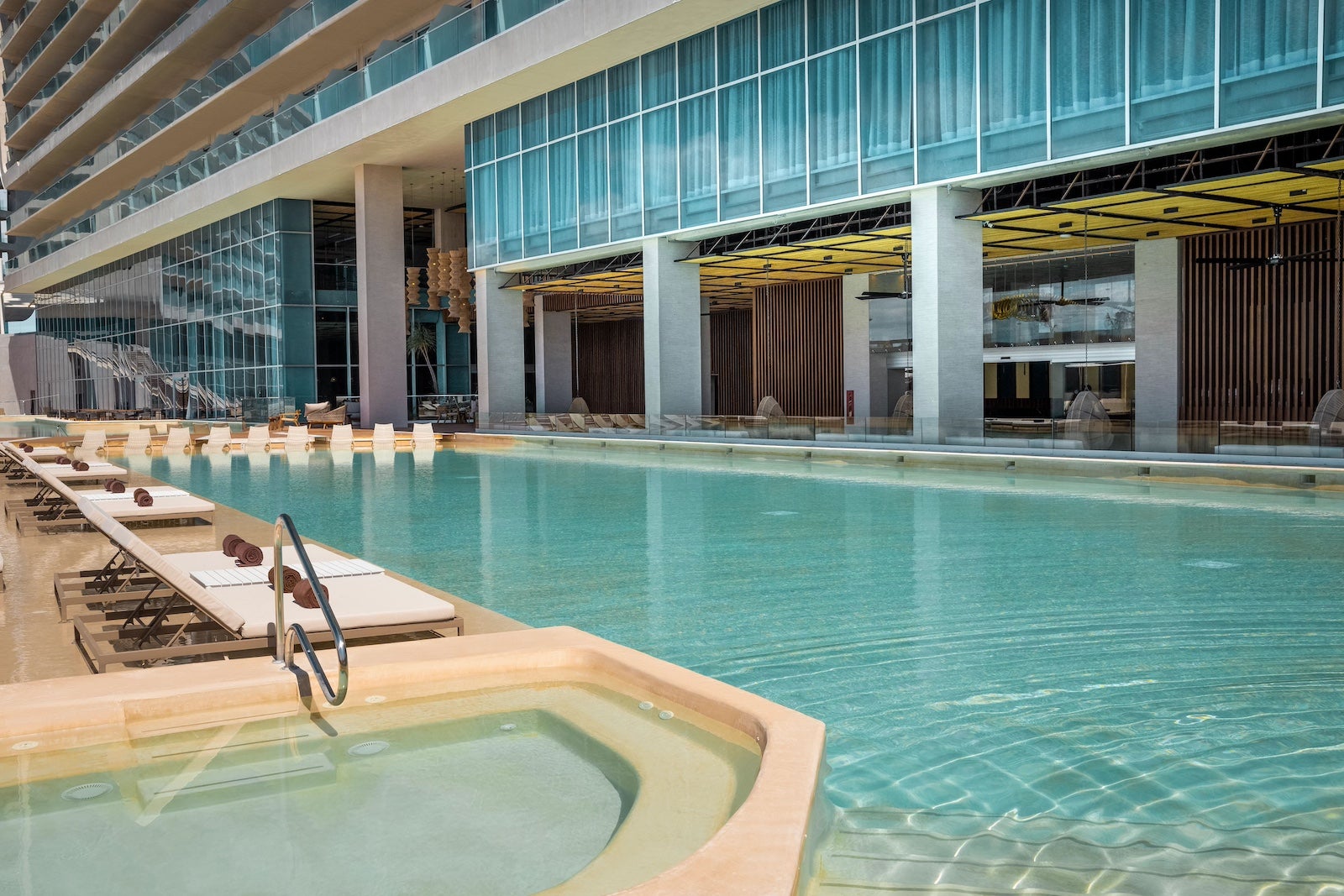
There are plenty of physical activities, too, like glow volleyball at night, paddleboard yoga, boxing and a rooftop fitness center with equipment.
Hyatt, over the last few years, has been on a spree of launching new all-inclusive brands, including last year's debut of Impression by Secrets , a luxury all-inclusive brand with two locations open in Mexico, like Secrets Impression Moxche, which our team found to be one of the best all-inclusive resorts in Playa del Carmen.
Now, the arrival of the Hyatt Vivid adds a new flavor to the Inclusive Collection, one that will feel luxurious, laid-back and purposefully social.
How to book
In its early opening phase, guests can book the Hyatt Vivid Grand Island for 40% off for stays through Dec. 20 if booked by June 30. That means some stays come down as low as $159 per person per night. World of Hyatt members can book starting at 17,000 points per night, based on double occupancy, though the majority of the booking calendar shows most nights at 20,000 or 23,000 points.
Related reading:
- The most award-friendly hotel program: Everything you need to know about World of Hyatt
- These are the best Hyatt Category 4 hotels, according to Globalists
- Best Park Hyatt hotels, according to Globalists
- Your ultimate guide to Hyatt's hotel brands

IMAGES
COMMENTS
In an emergency, dial 911. Drink Responsibly - Travelers go to Cancun to let loose and enjoy life, but even in these moments it's important to drink alcohol responsibly. It isn't uncommon for highly intoxicated travelers to be arrested for being drunk and disorderly. Equally, public urination is also illegal.
0:34. The U.S. Embassy and Consulates in Mexico has issued a spring break travel warning for Americans planning to visit the country. The message posted on Monday highlighted a range of potential ...
Travel Advisory. August 22, 2023. See State Summaries. K C. Reissued after periodic review with general security updates, and the removal of obsolete COVID-19 page links. Country Summary: Violent crime - such as homicide, kidnapping, carjacking, and robbery - is widespread and common in Mexico. The U.S. government has limited ability to ...
Travel Advisory Level 3: ... state. However, U.S. government employees are advised to exercise increased caution after dark in downtown areas of Cancun, Tulum, and Playa del Carmen, and to remain in well-lit pedestrian streets and tourist zones. ... Alerts for U.S. Citizens Visas information Passport information Notarials information Hours and ...
The State Department updated the Travel Advisory for Mexico on Oct. 5, which is done regularly. Several tourist destinations, like Mexico City, Sayulita and Cancun, now have warnings related to ...
The warning, which was issued this week by the U.S. Embassy and Consulates in Mexico, reminds travelers to "travel smart" and "be informed" as "thousands of U.S. citizens visit Mexico ...
The U.S. Embassy and Consulates in Mexico have issued a new warning to visitors of Cancun and the Mexican state of Quintana Roo over a potential conflict between taxi drivers and ride-hailing service companies. Medallion taxi drivers have been attacking ride-hailing service drivers as they battle over lucrative tourist rides.
If you're planning a trip to Cancún, Mexico, be aware of COVID-19, safety, and weather advisories. Keep reading for important details as you prepare to explore Cancún, Mexico. Visit Insider's ...
A spate of incidents, including a kidnapping and the death of two Americans near the border, have prompted travel warnings from the U.S. government. The border bridge between Brownsville, Texas ...
Currently, a travel advisory is in place for 30 of Mexico's 32 states. Related: Cancun travel advisory over taxis. The advisories come as we learn of violence that involved Americans in Matamoros, a town in Mexico near the Texas border. Current US State Department advisories
All but two of the remaining states have level 2 "Exercise Increased Caution" warnings because of high crime rates. Tourist areas within the level 2 states include: Cancun, Cozumel, Tulum and Playa del Carmen in Quintana Roo; Mexico City; Teotihuacán in Mexico State; Los Cabos in Baja California de Sur; and Nuevo Vallarta in Nayarit. The State Department does not restrict travel for ...
US State Department Travel Advisory. Planning a trip to Cancun? The first thing you should do is review the current travel advisories. As of October 5, 2022, the US State Department advises travelers to exercise increased caution in downtown Quintana Roo due to crime and kidnapping.
As of March 2024, the US State Department updated its travel warnings for Quintana Roo, which is home to Cancun, Playa del Carmen, and Tulum. It removed the warning about an increased risk of kidnapping, but the country is still under a level 2 advisory. As of March 2024, the Government of Canada notes that the region of Cancun has high rates ...
The U.S. Embassy & Consulates in Mexico put out an alert for spring break travelers on March 13 outlining crime and other potential security issues and actions to take to help ensure safer travel.
Cancun, Tulum, and Playa del Carmen particularly draw high numbers of tourists from the U.S. However, as the spring break and Easter travel season approaches, anyone planning a trip to Mexico this spring must reckon with the sobering news of four Americans who were recently attacked by gunmen while traveling in Mexico.
1. Stay alert but don't let the clickbait headlines spook you. Despite all the grim news about Mexico's drug-related violence, Cancún and the wider Yucatán Peninsula are generally considered safe. Granted, you should never treat the crime problem lightly, but drug gangs rarely target tourists, especially if you avoid illicit activities.
Review the Traveler's Checklist . Assistance: For Emergency Assistance for U.S. citizens in Mexico, call (55) 8526 2561 from Mexico or 1-844-528-6611 from the United States. The U.S. Embassy in Mexico City is located at: Paseo de la Reforma 305, Colonia Cuauhtémoc, 06500, Ciudad de México. Phone: +52-55-5080-2000, Fax: +52-55-5080-2005.
Travel Advisories. Travel Advisories. Learn about your destination. Advisory Level Date Updated; Israel, the West Bank and Gaza Travel Advisory : Other: January 3, 2024: Liechtenstein Travel Advisory: Level 1: Exercise Normal Precautions: July 26, 2023: North Macedonia Travel Advisory:
June-November: Hurricane season. December-March: Cancun's peak season (high tourist numbers) Pro Tip: Before your trip, check updated Mexico travel warnings for the Cancun forecast. Remember that a 5-10°F difference is applicable if you want to gauge Cancun's humidity.
If your travel plans in Mexico include outdoor activities, take these steps to stay safe and healthy during your trip. Stay alert to changing weather conditions and adjust your plans if conditions become unsafe. Prepare for activities by wearing the right clothes and packing protective items, such as bug spray, sunscreen, and a basic first aid kit.
According to local authorities, as Cancun braces for. yet another surge. in tourist numbers, the Secretariat of Citizen Security will maintain a security force of. 2,395 officers. for the time ...
Short Summary: Cancun is generally safe for travelers, but taking necessary precautions is essential. Consider checking government website travel alerts for updated information on safety in Cancun. Follow safety tips, such as avoiding walking alone at night and staying in well-known establishments.
Petty theft. Petty crime, such as pickpocketing and purse snatching, is common in Mexico. Be aware of your surroundings at all times, even in areas normally considered safe. Ensure that your belongings, including your passport and other travel documents, are secure at all times.
There's a new reason to be all-in on all-inclusive resorts: Hyatt's newest all-inclusive brand, Hyatt Vivid Hotels & Resorts, just opened its very first property. Located in Cancun, about 10 minutes from the famed Hotel Zone, the Hyatt Vivid Grand Island is an adults-only property with 400 suites tucked away in the gated community of Grand ...